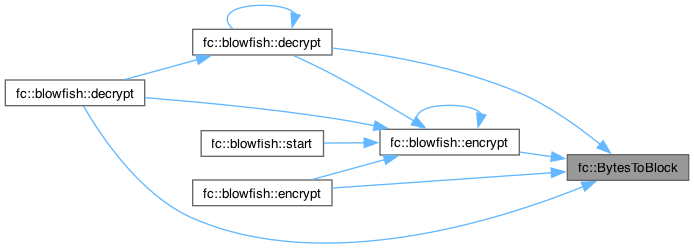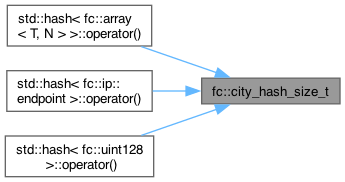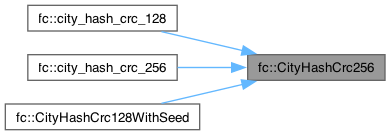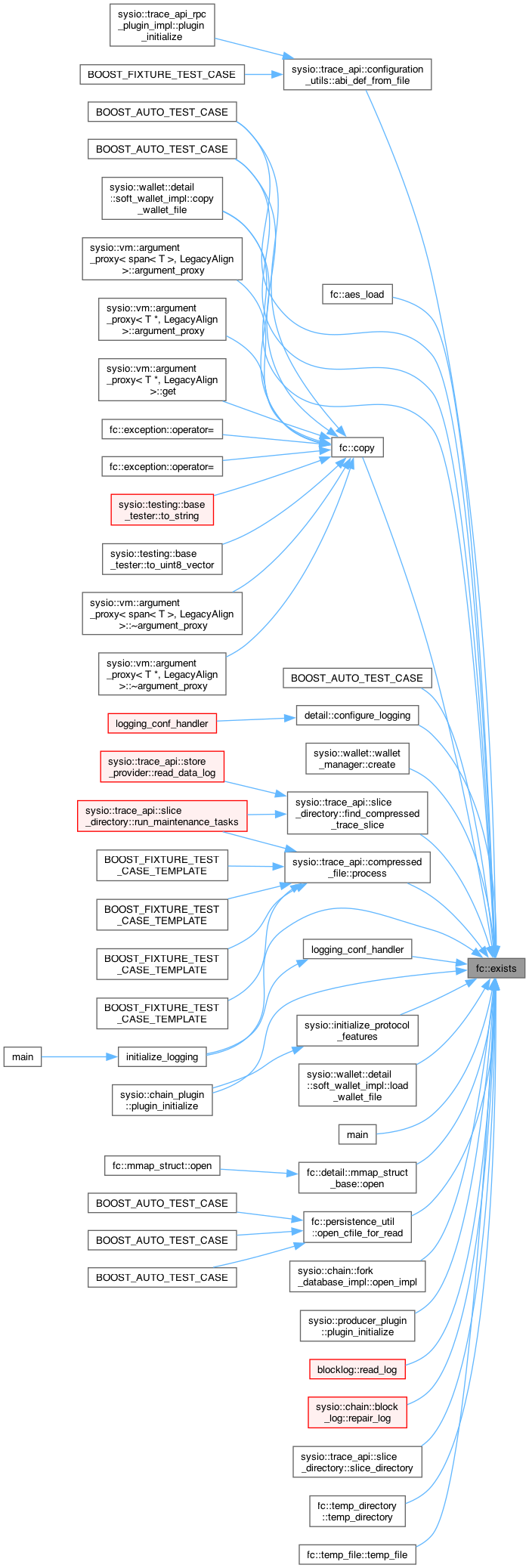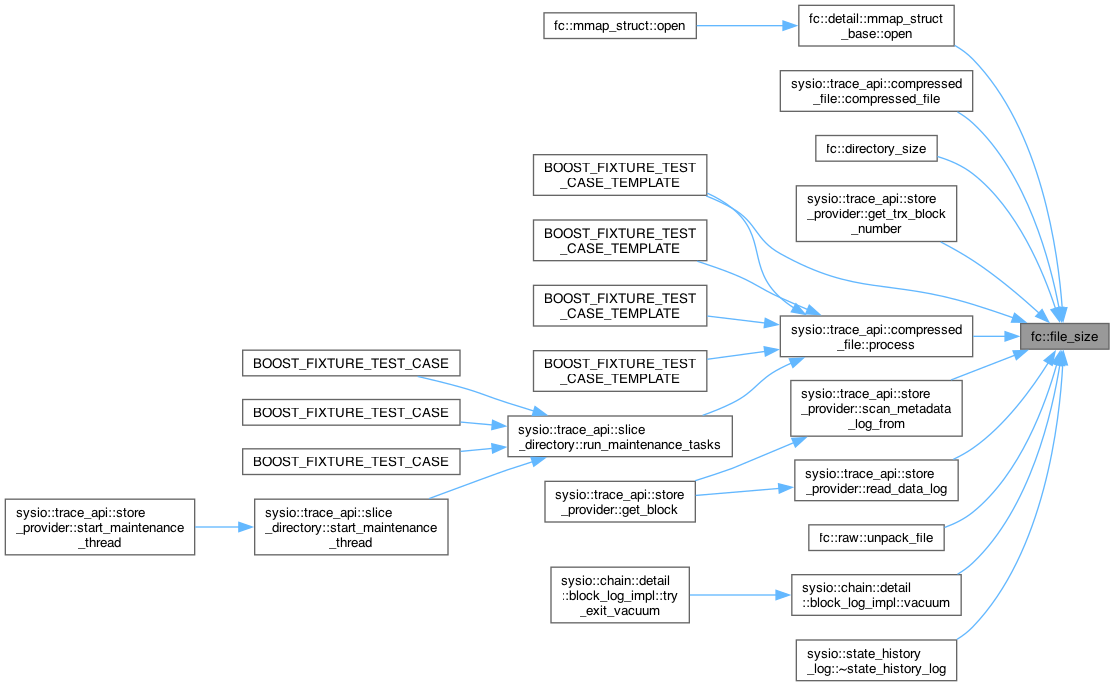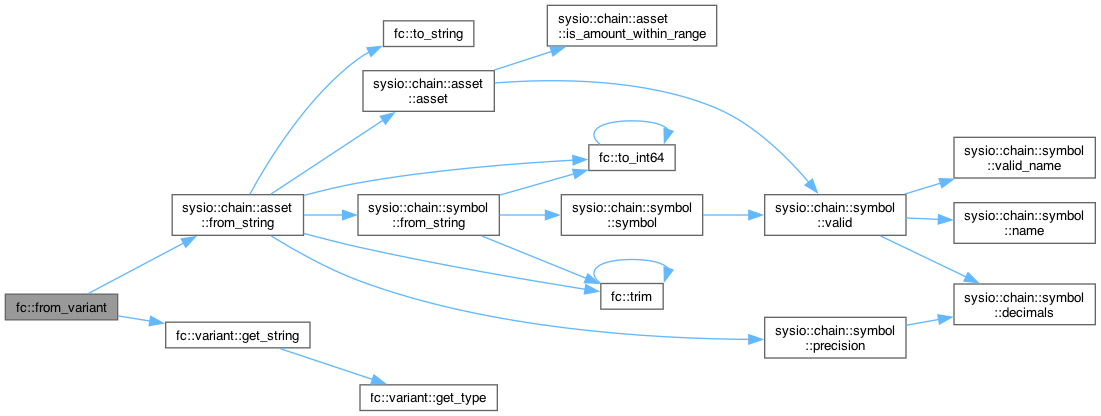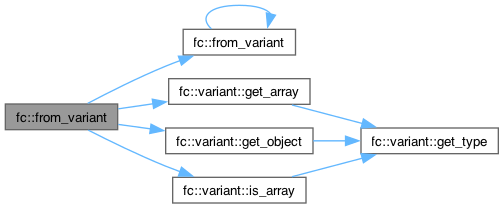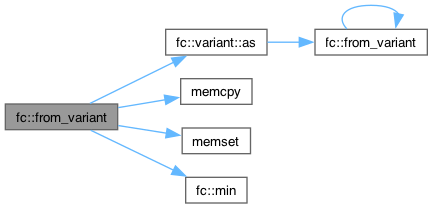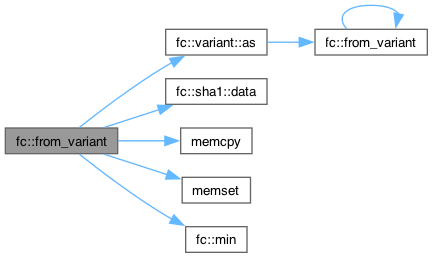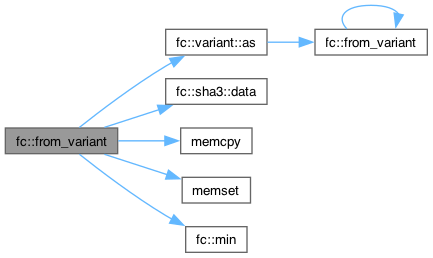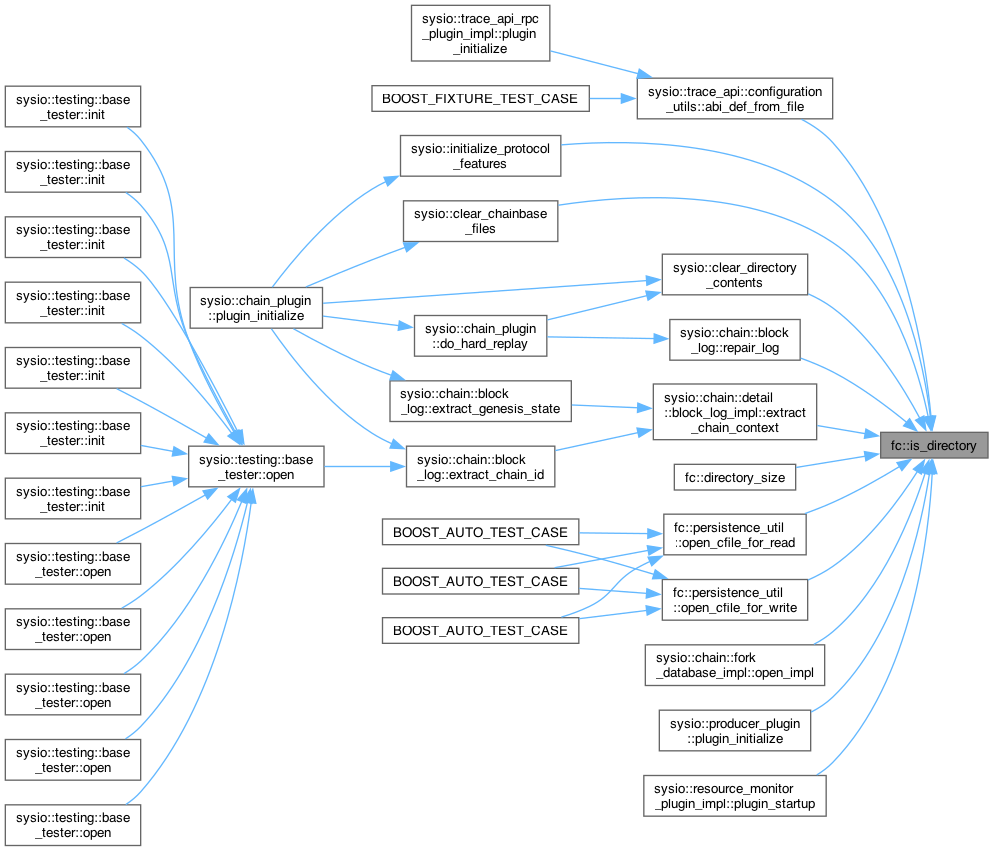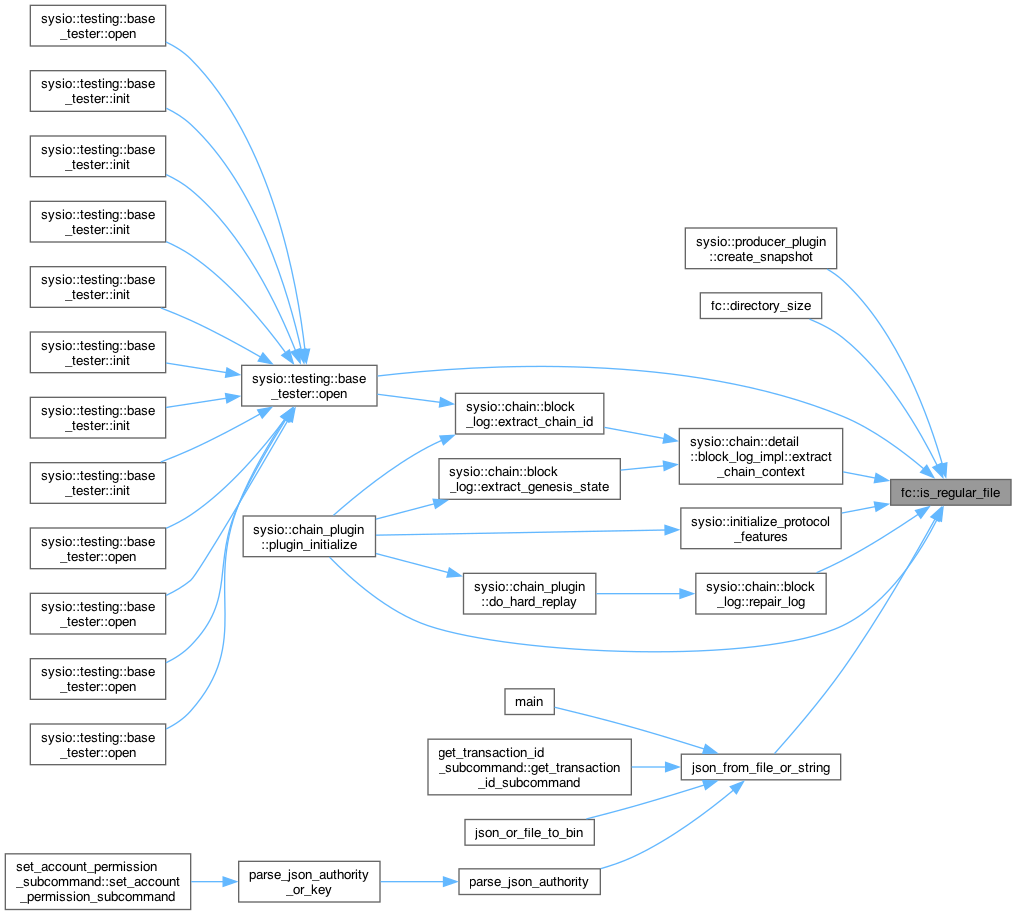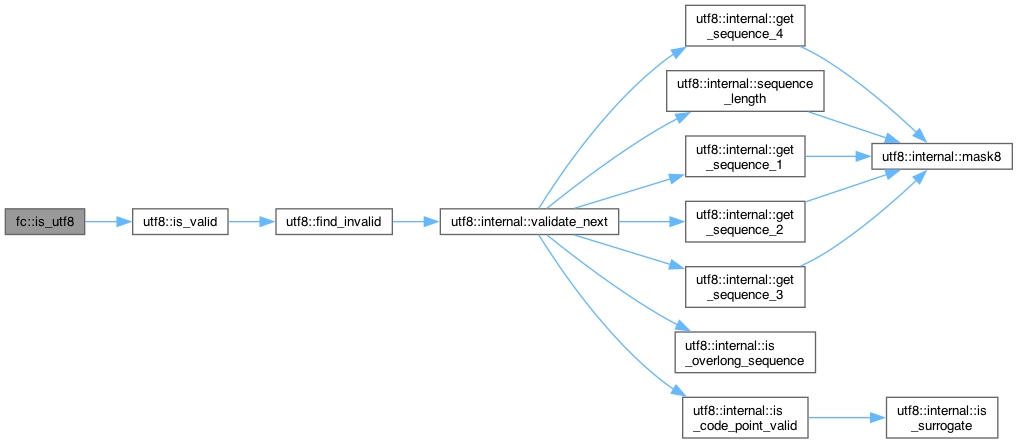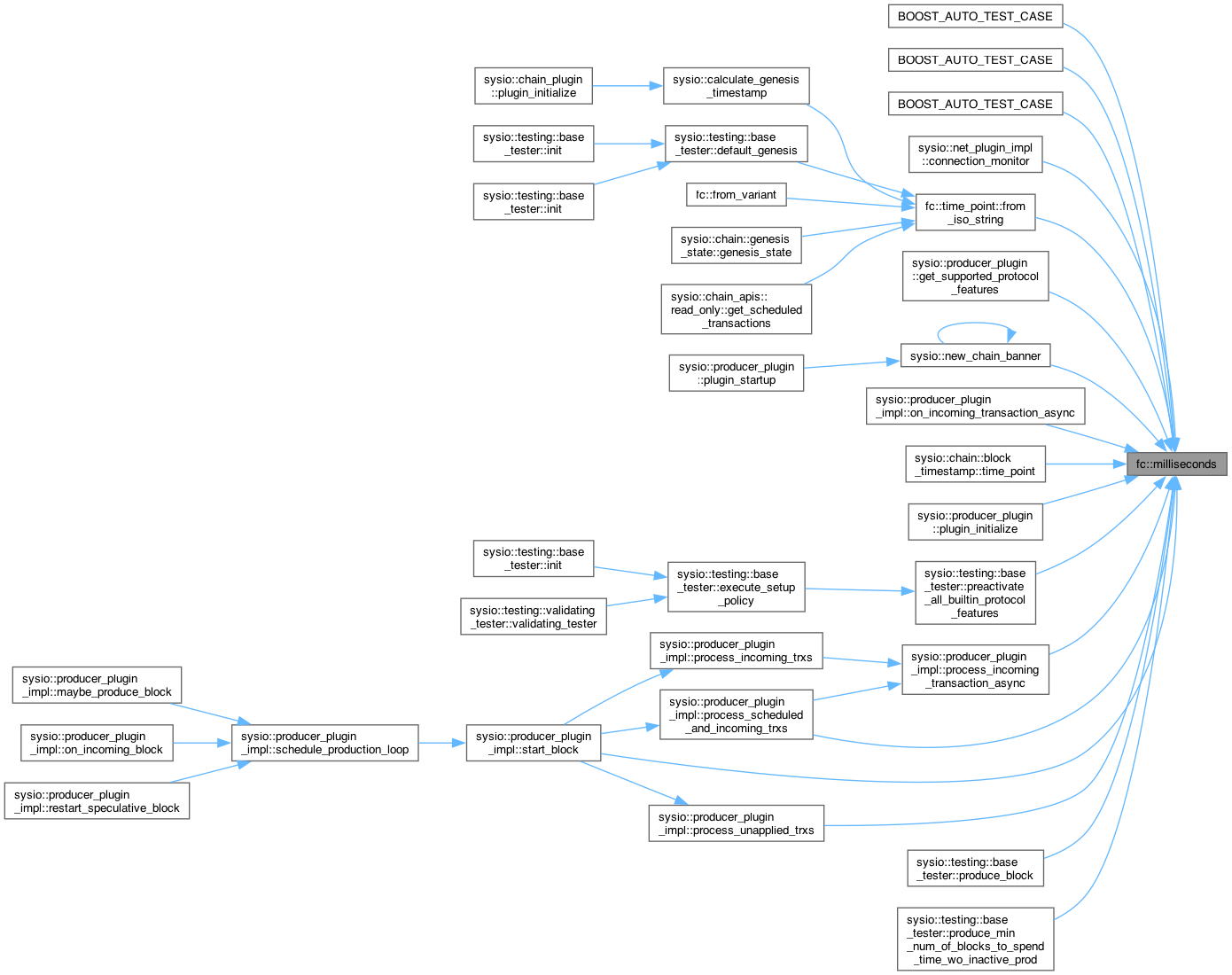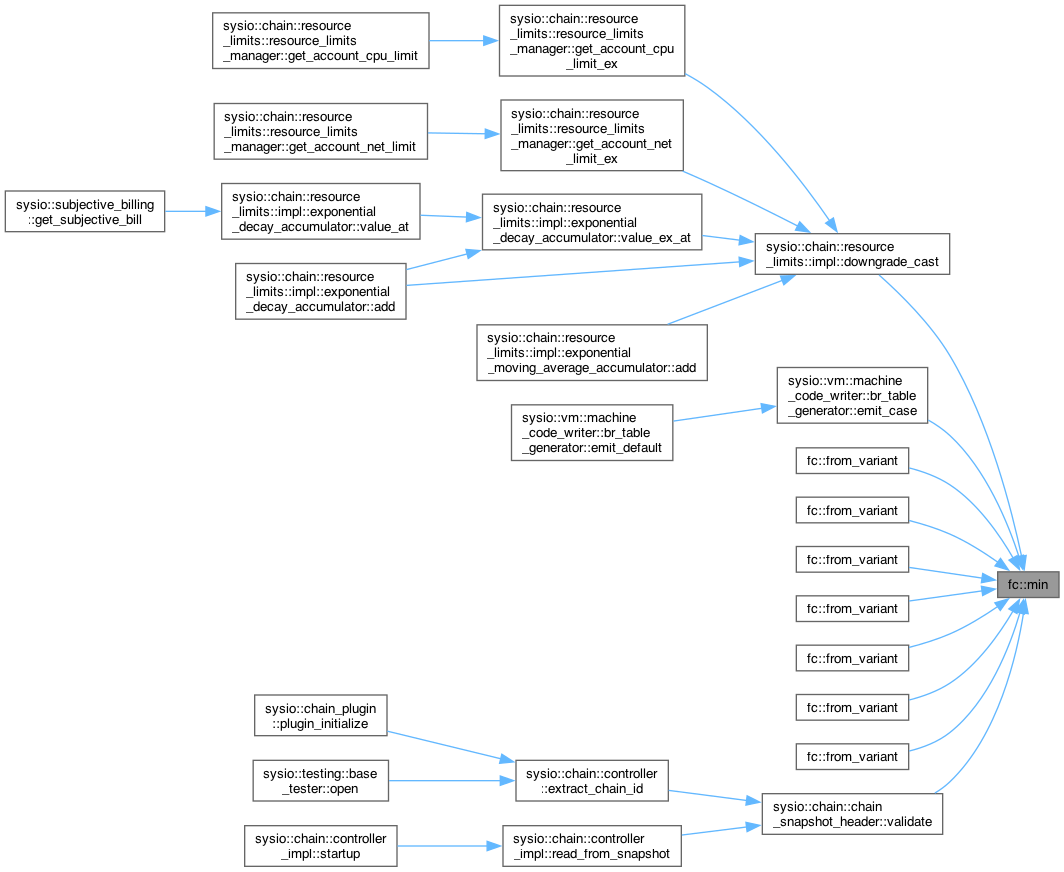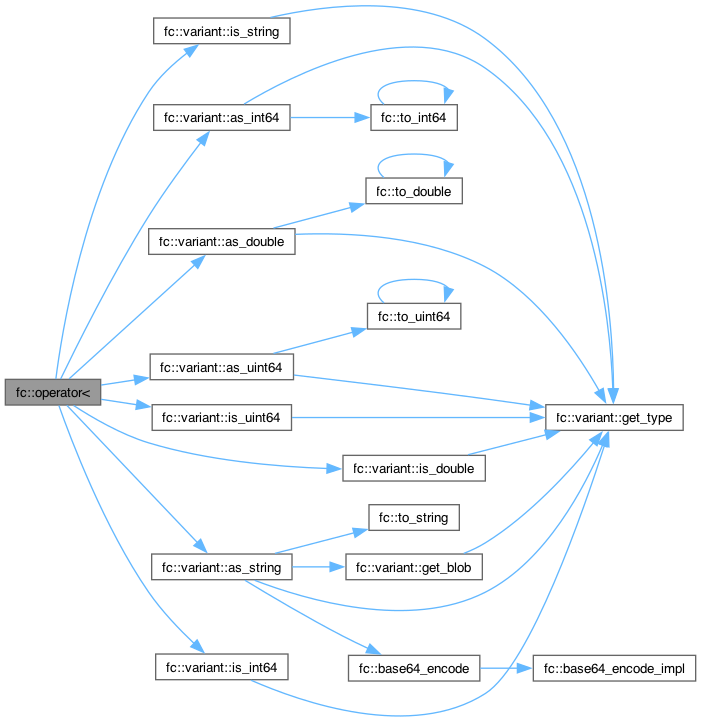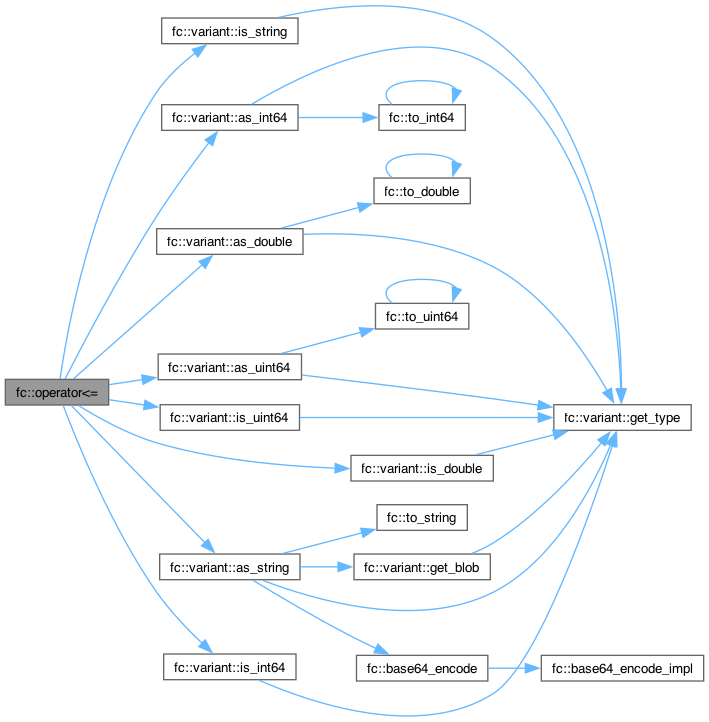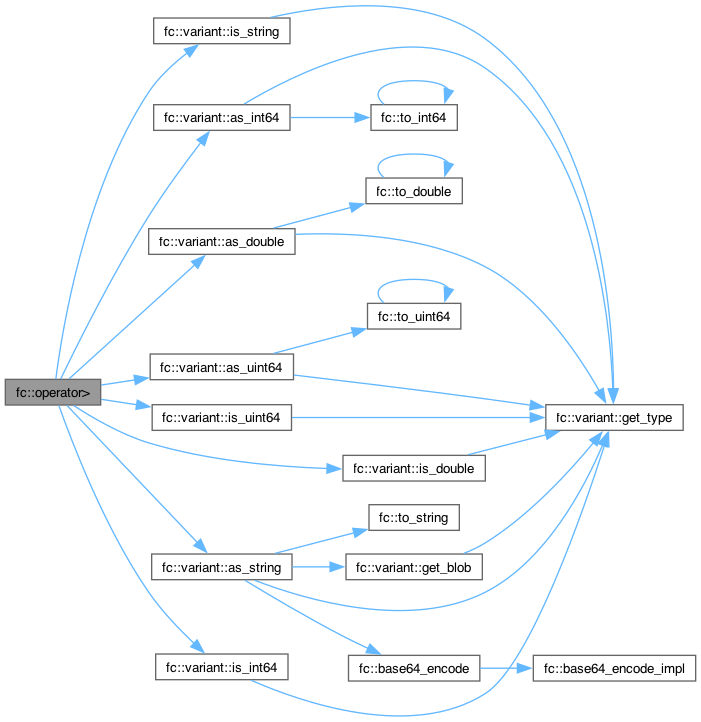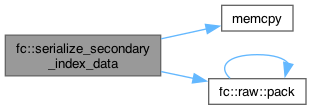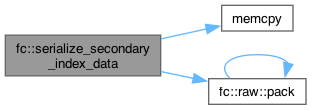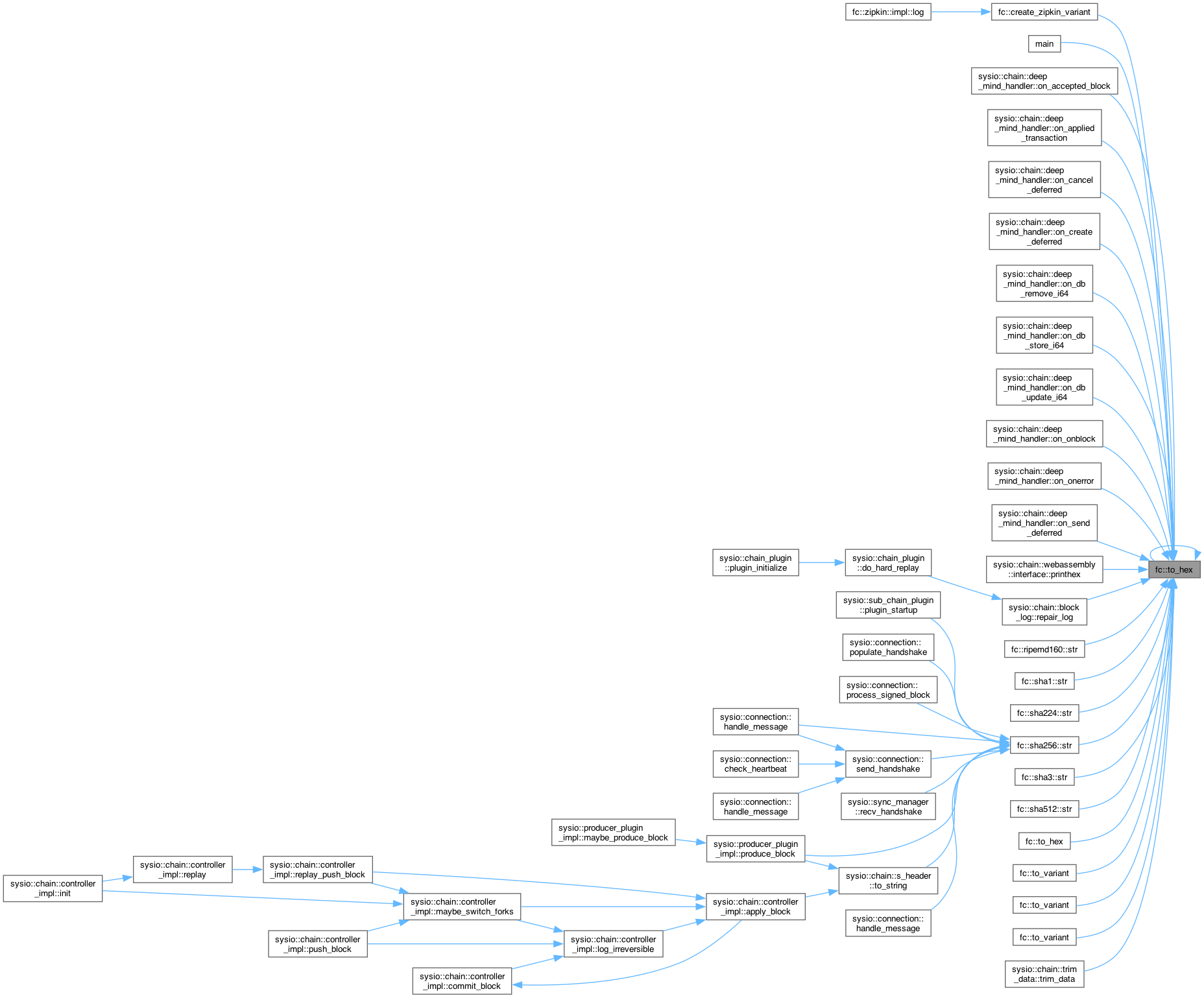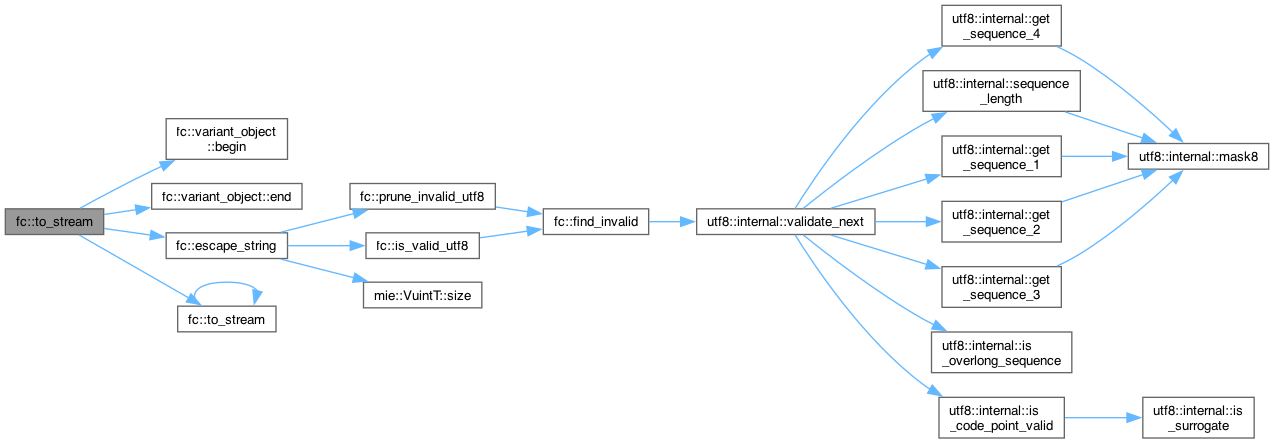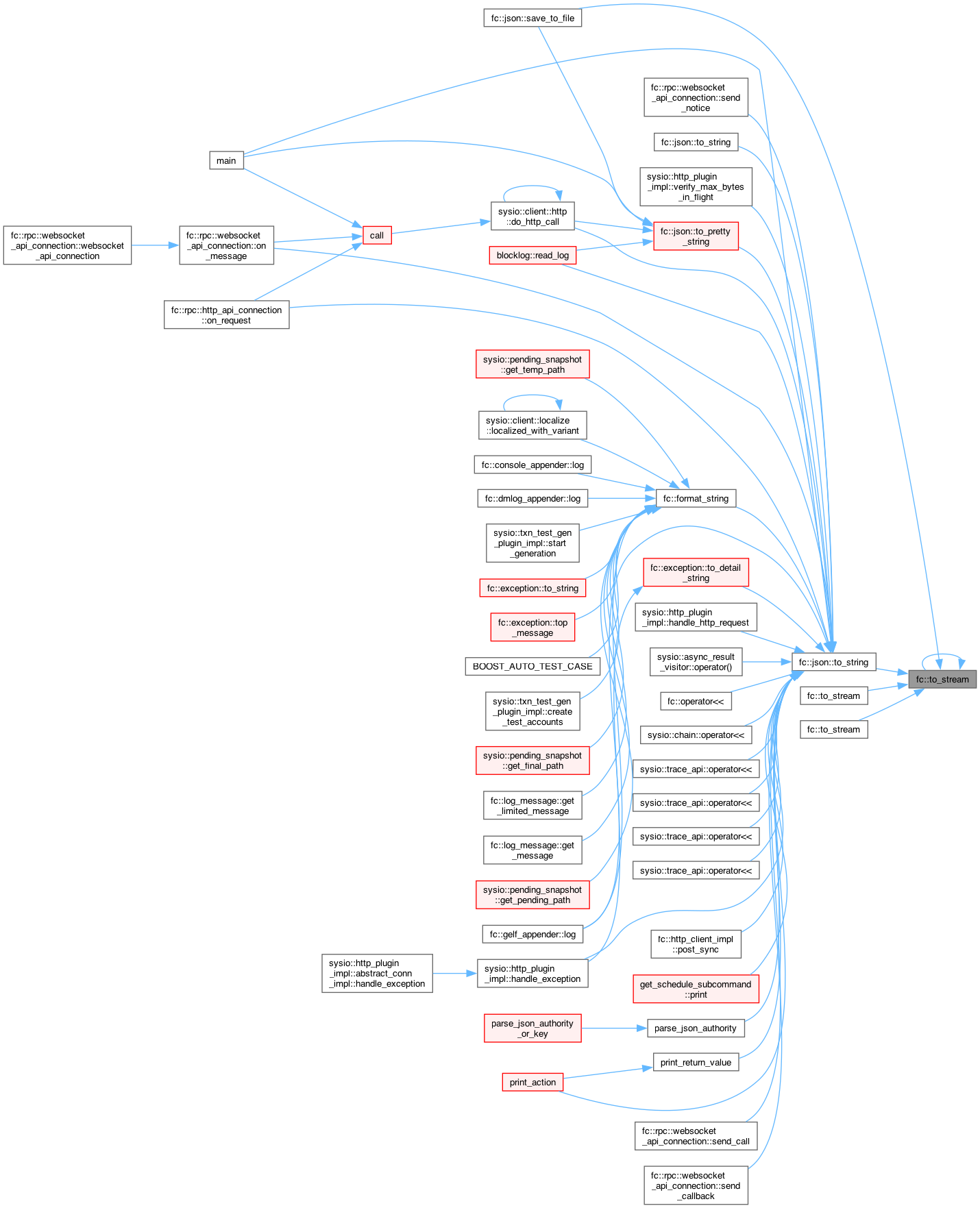namespace sysio::chain More...
Namespaces | |
| namespace | crypto |
| namespace | detail |
| namespace | ecc |
| namespace | em |
| namespace | equihash |
| namespace | ip |
| namespace | json_relaxed |
| namespace | persistence_util |
| namespace | raw |
| namespace | rpc |
| namespace | tracked |
Typedefs | |
| typedef boost::any | any |
| typedef uint32_t | api_id_type |
| typedef std::shared_ptr< api_base > | api_ptr |
| using | bytes = std::vector<char> |
| typedef hmac< fc::sha224 > | hmac_sha224 |
| typedef hmac< fc::sha256 > | hmac_sha256 |
| typedef hmac< fc::sha512 > | hmac_sha512 |
| typedef bytes | signature |
| typedef ripemd160 | uint160_t |
| typedef ripemd160 | uint160 |
| typedef sha256 | uint256 |
| typedef fc::sha512 | uint512 |
| typedef std::shared_ptr< exception > | exception_ptr |
| typedef std::optional< exception > | oexception |
| typedef std::shared_ptr< iprocess > | iprocess_ptr |
| typedef std::shared_ptr< process > | process_ptr |
| typedef std::shared_ptr< buffered_istream > | buffered_istream_ptr |
| typedef std::shared_ptr< buffered_ostream > | buffered_ostream_ptr |
| typedef std::vector< log_message > | log_messages |
| typedef boost::asio::basic_deadline_timer< boost::posix_time::ptime, mock_time_traits > | mock_deadline_timer |
| typedef std::optional< fc::string > | ostring |
| typedef std::optional< fc::path > | opath |
| typedef std::optional< fc::variant_object > | ovariant_object |
| typedef std::string | string |
| typedef std::optional< time_point > | otime_point |
| typedef decltype(nullptr) | nullptr_t |
| using | yield_function_t = optional_delegate<void()> |
| template<size_t Size> | |
| using | UInt |
| template<size_t Size> | |
| using | Int |
| typedef std::vector< fc::variant > | variants |
| typedef std::optional< variant > | ovariant |
| typedef const char * | const_char_ptr |
| using | Scalar = libff::bigint<libff::alt_bn128_q_limbs> |
| typedef boost::multiprecision::uint128_t | m128 |
| typedef const variant_object * | const_variant_object_ptr |
| typedef const variants * | const_variants_ptr |
| typedef const blob * | const_blob_ptr |
| typedef const string * | const_string_ptr |
| using | params = sysio::chain_apis::account_query_db::get_accounts_by_authorizers_params |
Functions | |
| void | to_variant (const sysio::chain::shared_public_key &var, fc::variant &vo) |
| void | to_variant (const sysio::chain::chain_id_type &cid, fc::variant &v) |
| void | from_variant (const fc::variant &v, sysio::chain::chain_id_type &cid) |
| template<typename ST , typename T > | |
| datastream< ST > & | operator<< (datastream< ST > &s, const sysio::chain::may_not_exist< T > &v) |
| template<typename ST , typename T > | |
| datastream< ST > & | operator>> (datastream< ST > &s, sysio::chain::may_not_exist< T > &v) |
| template<typename T > | |
| void | to_variant (const sysio::chain::may_not_exist< T > &e, fc::variant &v) |
| template<typename T > | |
| void | from_variant (const fc::variant &v, sysio::chain::may_not_exist< T > &e) |
| void | to_variant (const sysio::chain::asset &var, fc::variant &vo) |
| void | from_variant (const fc::variant &var, sysio::chain::asset &vo) |
| void | from_variant (const fc::variant &var, sysio::chain::extended_asset &vo) |
| template<uint16_t IntervalMs, uint64_t EpochMs> | |
| void | to_variant (const sysio::chain::block_timestamp< IntervalMs, EpochMs > &t, fc::variant &v) |
| template<uint16_t IntervalMs, uint64_t EpochMs> | |
| void | from_variant (const fc::variant &v, sysio::chain::block_timestamp< IntervalMs, EpochMs > &t) |
| template<typename OidType > | |
| void | to_variant (const chainbase::oid< OidType > &oid, variant &v) |
| template<typename OidType > | |
| void | from_variant (const variant &v, chainbase::oid< OidType > &oid) |
| void | float64_to_double (const float64_t &f, double &d) |
| void | double_to_float64 (const double &d, float64_t &f) |
| void | float128_to_uint128 (const float128_t &f, sysio::chain::uint128_t &u) |
| void | uint128_to_float128 (const sysio::chain::uint128_t &u, float128_t &f) |
| void | to_variant (const float64_t &f, variant &v) |
| void | from_variant (const variant &v, float64_t &f) |
| void | to_variant (const float128_t &f, variant &v) |
| void | from_variant (const variant &v, float128_t &f) |
| void | to_variant (const sysio::chain::shared_string &s, variant &v) |
| void | from_variant (const variant &v, sysio::chain::shared_string &s) |
| void | to_variant (const sysio::chain::shared_blob &b, variant &v) |
| void | from_variant (const variant &v, sysio::chain::shared_blob &b) |
| void | to_variant (const blob &b, variant &v) |
| void | from_variant (const variant &v, blob &b) |
| template<typename T > | |
| void | to_variant (const sysio::chain::shared_vector< T > &sv, variant &v) |
| template<typename T > | |
| void | from_variant (const variant &v, sysio::chain::shared_vector< T > &sv) |
| void | to_variant (const sysio::chain::name &c, fc::variant &v) |
| void | from_variant (const fc::variant &v, sysio::chain::name &check) |
| void | to_variant (const sysio::chain::symbol &var, fc::variant &vo) |
| void | from_variant (const fc::variant &var, sysio::chain::symbol &vo) |
| void | to_variant (const sysio::chain::symbol_code &var, fc::variant &vo) |
| void | from_variant (const fc::variant &var, sysio::chain::symbol_code &vo) |
| std::size_t | hash_value (const fc::sha256 &v) |
| template<typename T , size_t N> | |
| bool | operator== (const array< T, N > &a, const array< T, N > &b) |
| template<typename T , size_t N> | |
| bool | operator< (const array< T, N > &a, const array< T, N > &b) |
| template<typename T , size_t N> | |
| bool | operator> (const array< T, N > &a, const array< T, N > &b) |
| template<typename T , size_t N> | |
| bool | operator!= (const array< T, N > &a, const array< T, N > &b) |
| template<typename T , size_t N> | |
| void | to_variant (const array< T, N > &bi, variant &v) |
| template<typename T , size_t N> | |
| void | from_variant (const variant &v, array< T, N > &bi) |
| uint64_t | endian_reverse_u64 (uint64_t x) |
| uint32_t | endian_reverse_u32 (uint32_t x) |
| bloom_filter | operator& (const bloom_filter &a, const bloom_filter &b) |
| bloom_filter | operator| (const bloom_filter &a, const bloom_filter &b) |
| bloom_filter | operator^ (const bloom_filter &a, const bloom_filter &b) |
| std::string | smaz_compress (const std::string &in) |
| std::string | smaz_decompress (const std::string &compressed) |
| string | zlib_compress (const string &in) |
| template<typename T , typename... U> | |
| void | to_variant (const boost::container::vector< T, U... > &vec, fc::variant &vo) |
| template<typename T , typename... U> | |
| void | from_variant (const fc::variant &v, boost::container::vector< T, U... > &vec) |
| template<typename... U> | |
| void | to_variant (const boost::container::vector< char, U... > &vec, fc::variant &vo) |
| template<typename... U> | |
| void | from_variant (const fc::variant &v, boost::container::vector< char, U... > &vec) |
| template<typename T , typename... U> | |
| void | to_variant (const flat_set< T, U... > &s, fc::variant &vo) |
| template<typename T , typename... U> | |
| void | from_variant (const fc::variant &v, flat_set< T, U... > &s) |
| template<typename T , typename... U> | |
| void | to_variant (const flat_multiset< T, U... > &s, fc::variant &vo) |
| template<typename T , typename... U> | |
| void | from_variant (const fc::variant &v, flat_multiset< T, U... > &s) |
| template<typename K , typename V , typename... U> | |
| void | to_variant (const flat_map< K, V, U... > &m, fc::variant &vo) |
| template<typename K , typename V , typename... U> | |
| void | from_variant (const variant &v, flat_map< K, V, U... > &m) |
| template<typename K , typename V , typename... U> | |
| void | to_variant (const flat_multimap< K, V, U... > &m, fc::variant &vo) |
| template<typename K , typename V , typename... U> | |
| void | from_variant (const variant &v, flat_multimap< K, V, U... > &m) |
| unsigned | aes_encrypt (unsigned char *plaintext, int plaintext_len, unsigned char *key, unsigned char *iv, unsigned char *ciphertext) |
| unsigned | aes_decrypt (unsigned char *ciphertext, int ciphertext_len, unsigned char *key, unsigned char *iv, unsigned char *plaintext) |
| unsigned | aes_cfb_decrypt (unsigned char *ciphertext, int ciphertext_len, unsigned char *key, unsigned char *iv, unsigned char *plaintext) |
| std::vector< char > | aes_encrypt (const fc::sha512 &key, const std::vector< char > &plain_text) |
| std::vector< char > | aes_decrypt (const fc::sha512 &key, const std::vector< char > &cipher_text) |
| void | aes_save (const fc::path &file, const fc::sha512 &key, std::vector< char > plain_text) |
| std::vector< char > | aes_load (const fc::path &file, const fc::sha512 &key) |
| std::variant< alt_bn128_error, bytes > | alt_bn128_add (const bytes &op1, const bytes &op2) |
| std::variant< alt_bn128_error, bytes > | alt_bn128_mul (const bytes &g1_point, const bytes &scalar) |
| std::variant< alt_bn128_error, bool > | alt_bn128_pair (const bytes &g1_g2_pairs, const yield_function_t &yield) |
| std::vector< char > | from_base32 (const fc::string &b32) |
| fc::string | to_base32 (const std::vector< char > &vec) |
| fc::string | to_base32 (const char *data, size_t len) |
| std::vector< char > | from_base36 (const fc::string &b36) |
| fc::string | to_base36 (const std::vector< char > &vec) |
| fc::string | to_base36 (const char *data, size_t len) |
| std::string | to_base58 (const char *d, size_t s, const fc::yield_function_t &yield) |
| std::string | to_base58 (const std::vector< char > &data, const fc::yield_function_t &yield) |
| std::vector< char > | from_base58 (const std::string &base58_str) |
| size_t | from_base58 (const std::string &base58_str, char *out_data, size_t out_data_len) |
| std::string | base64_encode (unsigned char const *bytes_to_encode, unsigned int in_len) |
| std::string | base64_encode (char const *bytes_to_encode, unsigned int in_len) |
| std::string | base64_encode (const std::string &enc) |
| std::string | base64_decode (const std::string &encoded_string) |
| std::string | base64url_encode (unsigned char const *bytes_to_encode, unsigned int in_len) |
| std::string | base64url_encode (char const *bytes_to_encode, unsigned int in_len) |
| std::string | base64url_encode (const std::string &enc) |
| std::string | base64url_decode (const std::string &encoded_string) |
| void | to_variant (const bigint &bi, variant &v) |
| void | from_variant (const variant &v, bigint &bi) |
| std::variant< blake2b_error, bytes > | blake2b (uint32_t _rounds, const bytes &_h, const bytes &_m, const bytes &_t0_offset, const bytes &_t1_offset, bool _f, const yield_function_t &yield) |
| uint64_t | city_hash64 (const char *buf, size_t len) |
| uint32_t | city_hash32 (const char *buf, size_t len) |
| size_t | city_hash_size_t (const char *buf, size_t len) |
| uint128 | city_hash128 (const char *s, size_t len) |
| uint64_t | city_hash_crc_64 (const char *buf, size_t len) |
| uint128 | city_hash_crc_128 (const char *s, size_t len) |
| array< uint64_t, 4 > | city_hash_crc_256 (const char *s, size_t len) |
| template<typename T > | |
| fc::sha256 | digest (const T &value) |
| void | to_variant (const ecc::private_key &var, variant &vo) |
| void | from_variant (const variant &var, ecc::private_key &vo) |
| void | to_variant (const ecc::public_key &var, variant &vo) |
| void | from_variant (const variant &var, ecc::public_key &vo) |
| void | to_variant (const em::private_key &var, variant &vo) |
| void | from_variant (const variant &var, em::private_key &vo) |
| void | to_variant (const em::public_key &var, variant &vo) |
| void | from_variant (const variant &var, em::public_key &vo) |
| void | to_variant (const crypto::r1::private_key &var, variant &vo) |
| void | from_variant (const variant &var, crypto::r1::private_key &vo) |
| void | to_variant (const crypto::r1::public_key &var, variant &vo) |
| void | from_variant (const variant &var, crypto::r1::public_key &vo) |
| uint8_t | from_hex (char c) |
| fc::string | to_hex (const char *d, uint32_t s) |
| std::string | to_hex (const std::vector< char > &data) |
| size_t | from_hex (const fc::string &hex_str, char *out_data, size_t out_data_len) |
| std::variant< k1_recover_error, bytes > | k1_recover (const bytes &signature, const bytes &digest) |
| std::variant< modular_arithmetic_error, bytes > | modexp (const bytes &_base, const bytes &_exponent, const bytes &_modulus) |
| void | generate_key_pair (public_key &pub, private_key &priv) |
| bool | operator== (const private_key &a, const private_key &b) |
| void | to_variant (const public_key &bi, variant &v) |
| void | from_variant (const variant &v, public_key &bi) |
| void | to_variant (const private_key &bi, variant &v) |
| void | from_variant (const variant &v, private_key &bi) |
| void | to_variant (const crypto::private_key &var, variant &vo, const fc::yield_function_t &yield=fc::yield_function_t()) |
| void | from_variant (const variant &var, crypto::private_key &vo) |
| void | to_variant (const crypto::public_key &var, variant &vo, const fc::yield_function_t &yield=fc::yield_function_t()) |
| void | from_variant (const variant &var, crypto::public_key &vo) |
| void | rand_bytes (char *buf, int count) |
| void | rand_pseudo_bytes (char *buf, int count) |
| void | to_variant (const ripemd160 &bi, variant &v) |
| void | from_variant (const variant &v, ripemd160 &bi) |
| void | to_variant (const sha1 &bi, variant &v) |
| void | from_variant (const variant &v, sha1 &bi) |
| void | to_variant (const sha224 &bi, variant &v) |
| void | from_variant (const variant &v, sha224 &bi) |
| void | to_variant (const sha256 &bi, variant &v) |
| void | from_variant (const variant &v, sha256 &bi) |
| uint64_t | hash64 (const char *buf, size_t len) |
| void | to_variant (const sha3 &bi, variant &v) |
| void | from_variant (const variant &v, sha3 &bi) |
| void | to_variant (const sha512 &bi, variant &v) |
| void | from_variant (const variant &v, sha512 &bi) |
| void | to_variant (const crypto::signature &var, variant &vo, const fc::yield_function_t &yield=fc::yield_function_t()) |
| void | from_variant (const variant &var, crypto::signature &vo) |
| void | to_variant (const exception &e, variant &v) |
| void | from_variant (const variant &e, exception &ll) |
| template<typename T > | |
| fc::exception_ptr | copy_exception (T &&e) |
| FC_DECLARE_EXCEPTION (timeout_exception, timeout_exception_code, "Timeout") | |
| FC_DECLARE_EXCEPTION (file_not_found_exception, file_not_found_exception_code, "File Not Found") | |
| FC_DECLARE_EXCEPTION (parse_error_exception, parse_error_exception_code, "Parse Error") | |
| report's parse errors | |
| FC_DECLARE_EXCEPTION (invalid_arg_exception, invalid_arg_exception_code, "Invalid Argument") | |
| FC_DECLARE_EXCEPTION (key_not_found_exception, key_not_found_exception_code, "Key Not Found") | |
| reports when a key, guid, or other item is not found. | |
| FC_DECLARE_EXCEPTION (bad_cast_exception, bad_cast_exception_code, "Bad Cast") | |
| FC_DECLARE_EXCEPTION (out_of_range_exception, out_of_range_exception_code, "Out of Range") | |
| FC_DECLARE_EXCEPTION (invalid_operation_exception, invalid_operation_exception_code, "Invalid Operation") | |
| if an operation is unsupported or not valid this may be thrown | |
| FC_DECLARE_EXCEPTION (unknown_host_exception, unknown_host_exception_code, "Unknown Host") | |
| if an host name can not be resolved this may be thrown | |
| FC_DECLARE_EXCEPTION (canceled_exception, canceled_exception_code, "Canceled") | |
| used to report a canceled Operation | |
| FC_DECLARE_EXCEPTION (assert_exception, assert_exception_code, "Assert Exception") | |
| used inplace of assert() to report violations of pre conditions. | |
| FC_DECLARE_EXCEPTION (eof_exception, eof_exception_code, "End Of File") | |
| FC_DECLARE_EXCEPTION (null_optional, null_optional_code, "null optional") | |
| FC_DECLARE_EXCEPTION (udt_exception, udt_error_code, "UDT error") | |
| FC_DECLARE_EXCEPTION (aes_exception, aes_error_code, "AES error") | |
| FC_DECLARE_EXCEPTION (overflow_exception, overflow_code, "Integer Overflow") | |
| FC_DECLARE_EXCEPTION (underflow_exception, underflow_code, "Integer Underflow") | |
| FC_DECLARE_EXCEPTION (divide_by_zero_exception, divide_by_zero_code, "Integer Divide By Zero") | |
| std::string | except_str () |
| void | record_assert_trip (const char *filename, uint32_t lineno, const char *expr) |
| bool | exists (const path &p) |
| bool | is_directory (const path &p) |
| bool | is_regular_file (const path &p) |
| void | create_directories (const path &p) |
| void | remove_all (const path &p) |
| path | absolute (const path &p) |
| path | make_relative (const path &from, const path &to) |
| path | canonical (const path &p) |
| uint64_t | file_size (const path &p) |
| uint64_t | directory_size (const path &p) |
| bool | remove (const path &p) |
| void | copy (const path &from, const path &to) |
| void | rename (const path &from, const path &to) |
| void | resize_file (const path &file, size_t s) |
| void | chmod (const path &p, int perm) |
| void | create_hard_link (const path &from, const path &to) |
| path | unique_path () |
| path | temp_directory_path () |
| const path & | home_path () |
| const path & | app_path () |
| const fc::path & | current_path () |
| void | to_variant (const fc::path &, fc::variant &) |
| void | from_variant (const fc::variant &, fc::path &) |
| template<typename Storage > | |
| void | to_variant (const fixed_string< Storage > &s, variant &v) |
| template<typename Storage > | |
| void | from_variant (const variant &v, fixed_string< Storage > &s) |
| template<typename T , unsigned int S, typename U , typename A > | |
| auto | operator+ (const fwd< T, S, A > &x, U &&u) -> typename detail::add< T, U >::type |
| template<typename T , unsigned int S, typename U , typename A > | |
| auto | operator- (const fwd< T, S, A > &x, U &&u) -> typename detail::sub< T, U >::type |
| template<typename T , unsigned int S, typename U , typename A > | |
| auto | operator<< (U &u, const fwd< T, S, A > &f) -> typename detail::insert_op< U, T >::type |
| template<typename T , unsigned int S, typename U , typename A > | |
| auto | operator>> (U &u, fwd< T, S, A > &f) -> typename detail::extract_op< U, T >::type |
| template<uint64_t RequiredSize, uint64_t ProvidedSize> | |
| void | check_size () |
| template<typename T , typename... U> | |
| void | to_variant (const bip::set< T, U... > &s, fc::variant &vo) |
| template<typename T , typename... U> | |
| void | from_variant (const fc::variant &v, bip::set< T, U... > &s) |
| template<typename T , typename... U> | |
| void | to_variant (const bip::multiset< T, U... > &s, fc::variant &vo) |
| template<typename T , typename... U> | |
| void | from_variant (const fc::variant &v, bip::multiset< T, U... > &s) |
| template<typename K , typename V , typename... U> | |
| void | to_variant (const bip::map< K, V, U... > &m, fc::variant &vo) |
| template<typename K , typename V , typename... U> | |
| void | from_variant (const variant &v, bip::map< K, V, U... > &m) |
| template<typename K , typename V , typename... U> | |
| void | to_variant (const bip::multimap< K, V, U... > &m, fc::variant &vo) |
| template<typename K , typename V , typename... U> | |
| void | from_variant (const variant &v, bip::multimap< K, V, U... > &m) |
| fc::path | find_executable_in_path (const fc::string name) |
| template<typename STREAM > | |
| device_adaptor< STREAM, bio::sink_tag > | to_sink (STREAM &strm) |
| template<typename STREAM > | |
| device_adaptor< STREAM, bio::source_tag > | to_source (STREAM &strm) |
| template<typename STREAM > | |
| device_adaptor< STREAM, bio::source_tag > | to_seekable (STREAM &strm) |
| void | set_console_echo (bool enable_echo) |
| template<typename ST > | |
| datastream< ST > & | operator<< (datastream< ST > &ds, const __int128 &d) |
| template<typename ST , typename DATA > | |
| datastream< ST > & | operator>> (datastream< ST > &ds, __int128 &d) |
| template<typename ST > | |
| datastream< ST > & | operator<< (datastream< ST > &ds, const unsigned __int128 &d) |
| template<typename ST , typename DATA > | |
| datastream< ST > & | operator>> (datastream< ST > &ds, unsigned __int128 &d) |
| template<typename ST > | |
| datastream< ST > & | operator<< (datastream< ST > &ds, const int64_t &d) |
| template<typename ST , typename DATA > | |
| datastream< ST > & | operator>> (datastream< ST > &ds, int64_t &d) |
| template<typename ST > | |
| datastream< ST > & | operator<< (datastream< ST > &ds, const uint64_t &d) |
| template<typename ST , typename DATA > | |
| datastream< ST > & | operator>> (datastream< ST > &ds, uint64_t &d) |
| template<typename ST > | |
| datastream< ST > & | operator<< (datastream< ST > &ds, const int32_t &d) |
| template<typename ST , typename DATA > | |
| datastream< ST > & | operator>> (datastream< ST > &ds, int32_t &d) |
| template<typename ST > | |
| datastream< ST > & | operator<< (datastream< ST > &ds, const uint32_t &d) |
| template<typename ST , typename DATA > | |
| datastream< ST > & | operator>> (datastream< ST > &ds, uint32_t &d) |
| template<typename ST > | |
| datastream< ST > & | operator<< (datastream< ST > &ds, const int16_t &d) |
| template<typename ST , typename DATA > | |
| datastream< ST > & | operator>> (datastream< ST > &ds, int16_t &d) |
| template<typename ST > | |
| datastream< ST > & | operator<< (datastream< ST > &ds, const uint16_t &d) |
| template<typename ST , typename DATA > | |
| datastream< ST > & | operator>> (datastream< ST > &ds, uint16_t &d) |
| template<typename ST > | |
| datastream< ST > & | operator<< (datastream< ST > &ds, const int8_t &d) |
| template<typename ST , typename DATA > | |
| datastream< ST > & | operator>> (datastream< ST > &ds, int8_t &d) |
| template<typename ST > | |
| datastream< ST > & | operator<< (datastream< ST > &ds, const uint8_t &d) |
| template<typename ST , typename DATA > | |
| datastream< ST > & | operator>> (datastream< ST > &ds, uint8_t &d) |
| template<typename IntType , typename EnumType > | |
| void | to_variant (const enum_type< IntType, EnumType > &var, variant &vo) |
| template<typename IntType , typename EnumType > | |
| void | from_variant (const variant &var, enum_type< IntType, EnumType > &vo) |
| void | read_file_contents (const fc::path &filename, std::string &result) |
| std::string | escape_string (const std::string_view &str, const json::yield_function_t &yield, bool escape_control_chars=true) |
| void | to_variant (const signed_int &var, variant &vo) |
| void | from_variant (const variant &var, signed_int &vo) |
| void | to_variant (const unsigned_int &var, variant &vo) |
| void | from_variant (const variant &var, unsigned_int &vo) |
| void | to_variant (log_level e, variant &v) |
| void | from_variant (const variant &e, log_level &ll) |
| void | to_variant (const log_context &l, variant &v) |
| void | from_variant (const variant &l, log_context &c) |
| void | to_variant (const log_message &l, variant &v) |
| void | from_variant (const variant &l, log_message &c) |
| void | configure_logging (const fc::path &log_config) |
| bool | configure_logging (const logging_config &l) |
| void | set_os_thread_name (const string &name) |
| void | set_thread_name (const string &name) |
| const string & | get_thread_name () |
| template<typename R > | |
| std::function< R, fc::tuple<> > | make_fused (const std::function< R > &f) |
| template<typename R , typename A > | |
| std::function< R(fc::tuple< A >) > | make_fused (const std::function< R(A)> &f) |
| template<typename R , typename A , typename B > | |
| std::function< R(fc::tuple< A, B >) > | make_fused (const std::function< R(A, B)> &f) |
| template<typename R , typename A , typename B , typename C > | |
| std::function< R(fc::tuple< A, B, C >) > | make_fused (const std::function< R(A, B, C)> &f) |
| template<typename R , typename A , typename B , typename C , typename D > | |
| std::function< R(fc::tuple< A, B, C, D >) > | make_fused (const std::function< R(A, B, C, D)> &f) |
| void | to_variant (const ip::endpoint &var, variant &vo) |
| void | from_variant (const variant &var, ip::endpoint &vo) |
| void | to_variant (const ip::address &var, variant &vo) |
| void | from_variant (const variant &var, ip::address &vo) |
| void | add_platform_root_cas_to_context (boost::asio::ssl::context &ctx) |
| std::vector< boost::asio::ip::udp::endpoint > | resolve (boost::asio::io_service &io_service, const std::string &host, uint16_t port) |
| void | to_variant (const url &u, fc::variant &v) |
| void | from_variant (const fc::variant &v, url &u) |
| void | to_variant (const real128 &var, variant &vo) |
| void | from_variant (const variant &var, real128 &vo) |
| void | throw_bad_enum_cast (int64_t i, const char *e) |
| void | throw_bad_enum_cast (const char *k, const char *e) |
| template<typename T > | |
| void | to_variant (const T &o, variant &v) |
| template<typename T > | |
| void | from_variant (const variant &v, T &o) |
| template<typename Callback > | |
| scoped_exit< Callback > | make_scoped_exit (Callback &&c) |
| template<typename variant , int32_t i = 0> | |
| void | from_index (variant &v, int index) |
| template<typename VariantType , typename T , std::size_t index = 0> | |
| constexpr std::size_t | get_index () |
| template<typename... T> | |
| void | to_variant (const std::variant< T... > &s, fc::variant &v) |
| template<typename... T> | |
| void | from_variant (const fc::variant &v, std::variant< T... > &s) |
| int64_t | to_int64 (const fc::string &) |
| uint64_t | to_uint64 (const fc::string &) |
| double | to_double (const fc::string &) |
| fc::string | to_string (double) |
| fc::string | to_string (uint64_t) |
| fc::string | to_string (int64_t) |
| fc::string | to_string (uint16_t) |
| std::string | to_pretty_string (int64_t) |
| fc::string | to_string (int32_t v) |
| fc::string | to_string (uint32_t v) |
| fc::string | format_string (const fc::string &, const variant_object &, bool minimize=false) |
| fc::string | trim (const fc::string &) |
| fc::string | to_lower (const fc::string &) |
| string | trim_and_normalize_spaces (const string &s) |
| constexpr microseconds | seconds (int64_t s) |
| constexpr microseconds | milliseconds (int64_t s) |
| constexpr microseconds | minutes (int64_t m) |
| constexpr microseconds | hours (int64_t h) |
| constexpr microseconds | days (int64_t d) |
| void | to_variant (const fc::microseconds &, fc::variant &) |
| void | from_variant (const fc::variant &, fc::microseconds &) |
| string | get_approximate_relative_time_string (const time_point_sec &event_time, const time_point_sec &relative_to_time=fc::time_point::now(), const std::string &ago=" ago") |
| string | get_approximate_relative_time_string (const time_point &event_time, const time_point &relative_to_time=fc::time_point::now(), const std::string &ago=" ago") |
| template<typename Functor > | |
| auto | call_fused (Functor f, const tuple<> &t) -> decltype(f()) |
| tuple | make_tuple () |
| void | to_variant (const uint128 &var, variant &vo) |
| void | from_variant (const variant &var, uint128 &vo) |
| bool | is_valid_utf8 (const std::string_view &str) |
| std::string | prune_invalid_utf8 (const std::string_view &str) |
| bool | is_utf8 (const std::string &str) |
| void | decodeUtf8 (const std::string &input, std::wstring *storage) |
| void | encodeUtf8 (const std::wstring &input, std::string *storage) |
| template<typename T > | |
| const T & | min (const T &a, const T &b) |
| constexpr size_t | const_strlen (const char *str) |
| template<typename Container > | |
| void | move_append (Container &dest, Container &&src) |
| template<typename Container > | |
| void | copy_append (Container &dest, const Container &src) |
| template<typename Container > | |
| void | deduplicate (Container &entries) |
| template<typename T , typename... Args> | |
| void | to_variant (const boost::multi_index_container< T, Args... > &s, fc::variant &v) |
| template<typename T , typename... Args> | |
| void | from_variant (const fc::variant &v, boost::multi_index_container< T, Args... > &s) |
| void | to_variant (const UInt< 8 > &n, fc::variant &v) |
| void | from_variant (const fc::variant &v, UInt< 8 > &n) |
| void | to_variant (const UInt< 16 > &n, fc::variant &v) |
| void | from_variant (const fc::variant &v, UInt< 16 > &n) |
| void | to_variant (const UInt< 32 > &n, fc::variant &v) |
| void | from_variant (const fc::variant &v, UInt< 32 > &n) |
| void | to_variant (const UInt< 64 > &n, fc::variant &v) |
| void | from_variant (const fc::variant &v, UInt< 64 > &n) |
| template<typename T > | |
| void | to_variant (const boost::multiprecision::number< T > &n, fc::variant &v) |
| template<typename T > | |
| void | from_variant (const fc::variant &v, boost::multiprecision::number< T > &n) |
| template<typename T > | |
| void | to_variant (const safe< T > &s, fc::variant &v) |
| template<typename T > | |
| void | from_variant (const fc::variant &v, safe< T > &s) |
| template<typename T > | |
| void | to_variant (const std::unique_ptr< T > &s, fc::variant &v) |
| template<typename T > | |
| void | from_variant (const fc::variant &v, std::unique_ptr< T > &s) |
| void | to_variant (const uint8_t &var, fc::variant &vo) |
| void | from_variant (const fc::variant &var, uint8_t &vo) |
| void | to_variant (const int8_t &var, fc::variant &vo) |
| void | from_variant (const fc::variant &var, int8_t &vo) |
| void | to_variant (const uint16_t &var, fc::variant &vo) |
| void | from_variant (const fc::variant &var, uint16_t &vo) |
| void | to_variant (const int16_t &var, fc::variant &vo) |
| void | from_variant (const fc::variant &var, int16_t &vo) |
| void | to_variant (const uint32_t &var, fc::variant &vo) |
| void | from_variant (const fc::variant &var, uint32_t &vo) |
| void | to_variant (const int32_t &var, fc::variant &vo) |
| void | from_variant (const fc::variant &var, int32_t &vo) |
| void | to_variant (const unsigned __int128 &var, fc::variant &vo) |
| void | from_variant (const fc::variant &var, unsigned __int128 &vo) |
| void | to_variant (const __int128 &var, fc::variant &vo) |
| void | from_variant (const fc::variant &var, __int128 &vo) |
| void | to_variant (const variant_object &var, fc::variant &vo) |
| void | from_variant (const fc::variant &var, variant_object &vo) |
| void | to_variant (const mutable_variant_object &var, fc::variant &vo) |
| void | from_variant (const fc::variant &var, mutable_variant_object &vo) |
| void | to_variant (const std::vector< char > &var, fc::variant &vo) |
| void | from_variant (const fc::variant &var, std::vector< char > &vo) |
| template<typename K , typename T > | |
| void | to_variant (const std::unordered_map< K, T > &var, fc::variant &vo) |
| template<typename K , typename T > | |
| void | from_variant (const fc::variant &var, std::unordered_map< K, T > &vo) |
| template<typename K , typename T > | |
| void | to_variant (const std::map< K, T > &var, fc::variant &vo) |
| template<typename K , typename T > | |
| void | from_variant (const fc::variant &var, std::map< K, T > &vo) |
| template<typename K , typename T > | |
| void | to_variant (const std::multimap< K, T > &var, fc::variant &vo) |
| template<typename K , typename T > | |
| void | from_variant (const fc::variant &var, std::multimap< K, T > &vo) |
| template<typename T > | |
| void | to_variant (const std::unordered_set< T > &var, fc::variant &vo) |
| template<typename T > | |
| void | from_variant (const fc::variant &var, std::unordered_set< T > &vo) |
| template<typename T > | |
| void | to_variant (const std::deque< T > &var, fc::variant &vo) |
| template<typename T > | |
| void | from_variant (const fc::variant &var, std::deque< T > &vo) |
| template<typename T , typename... U> | |
| void | to_variant (const boost::container::deque< T, U... > &d, fc::variant &vo) |
| template<typename T , typename... U> | |
| void | from_variant (const fc::variant &v, boost::container::deque< T, U... > &d) |
| template<typename T > | |
| void | to_variant (const std::set< T > &var, fc::variant &vo) |
| template<typename T > | |
| void | from_variant (const fc::variant &var, std::set< T > &vo) |
| template<typename T , std::size_t S> | |
| void | to_variant (const std::array< T, S > &var, fc::variant &vo) |
| template<typename T , std::size_t S> | |
| void | from_variant (const fc::variant &var, std::array< T, S > &vo) |
| void | to_variant (const time_point &var, fc::variant &vo) |
| void | from_variant (const fc::variant &var, time_point &vo) |
| void | to_variant (const time_point_sec &var, fc::variant &vo) |
| void | from_variant (const fc::variant &var, time_point_sec &vo) |
| void | to_variant (long long int s, fc::variant &v) |
| void | to_variant (unsigned long long int s, fc::variant &v) |
| void | to_variant (const std::string &s, fc::variant &v) |
| template<typename T > | |
| void | to_variant (const std::shared_ptr< T > &var, fc::variant &vo) |
| template<typename T > | |
| void | from_variant (const fc::variant &var, std::shared_ptr< T > &vo) |
| template<typename A , typename B > | |
| void | to_variant (const std::pair< A, B > &t, fc::variant &v) |
| template<typename A , typename B > | |
| void | from_variant (const fc::variant &v, std::pair< A, B > &p) |
| void | from_variant (const fc::variant &var, string &vo) |
| void | from_variant (const fc::variant &var, fc::variants &vo) |
| void | from_variant (const fc::variant &var, fc::variant &vo) |
| void | from_variant (const fc::variant &var, int64_t &vo) |
| void | from_variant (const fc::variant &var, uint64_t &vo) |
| void | from_variant (const fc::variant &var, bool &vo) |
| void | from_variant (const fc::variant &var, double &vo) |
| void | from_variant (const fc::variant &var, float &vo) |
| template<typename T > | |
| void | from_variant (const variant &var, std::optional< T > &vo) |
| template<typename T > | |
| void | from_variant (const fc::variant &var, std::vector< T > &tmp) |
| template<typename T > | |
| void | to_variant (const std::vector< T > &t, fc::variant &v) |
| fc::variant | operator+ (const fc::variant &a, const fc::variant &b) |
| fc::variant | operator- (const fc::variant &a, const fc::variant &b) |
| fc::variant | operator* (const fc::variant &a, const fc::variant &b) |
| fc::variant | operator/ (const fc::variant &a, const fc::variant &b) |
| bool | operator== (const fc::variant &a, const fc::variant &b) |
| bool | operator!= (const fc::variant &a, const fc::variant &b) |
| bool | operator< (const fc::variant &a, const fc::variant &b) |
| bool | operator> (const fc::variant &a, const fc::variant &b) |
| bool | operator! (const fc::variant &a) |
| uint32_t | smaz_compress (const char *in, int inlen, char *out, int outlen) |
| void | smaz_decompress (const char *in, uint32_t inlen, std::stringstream &ss) |
| void | initLibSnark () noexcept |
| Scalar | to_scalar (const bytes &be) noexcept |
| std::variant< alt_bn128_error, libff::alt_bn128_G1 > | decode_g1_element (const bytes &bytes64_be) noexcept |
| std::variant< alt_bn128_error, libff::alt_bn128_Fq2 > | decode_fp2_element (const bytes &bytes64_be) noexcept |
| std::variant< alt_bn128_error, libff::alt_bn128_G2 > | decode_g2_element (const bytes &bytes128_be) noexcept |
| bytes | encode_g1_element (libff::alt_bn128_G1 p) noexcept |
| std::string | base64_encode_impl (unsigned char const *bytes_to_encode, unsigned int in_len, const char *const b64_chars) |
| std::string | base64_decode_impl (std::string const &encoded_string, const char *const b64_chars) |
| unsigned char | Byte (unsigned int ui) |
| void | BytesToBlock (unsigned char const *p, sblock &b) |
| void | BlockToBytes (sblock const &b, unsigned char *p) |
| uint64_t | Uint128Low64 (const uint128 &x) |
| uint64_t | Uint128High64 (const uint128 &x) |
| uint64_t | Hash128to64 (const uint128 &x) |
| uint64_t | CityHash64WithSeeds (const char *s, size_t len, uint64_t seed0, uint64_t seed1) |
| uint64_t | CityHash64WithSeed (const char *s, size_t len, uint64_t seed) |
| uint128 | CityHash128WithSeed (const char *s, size_t len, uint128 seed) |
| void | CityHashCrc256 (const char *s, size_t len, uint64_t *result) |
| uint128 | CityHashCrc128WithSeed (const char *s, size_t len, uint128 seed) |
| const secp256k1_context * | k1_recover_context () |
| ripemd160 | operator<< (const ripemd160 &h1, uint32_t i) |
| ripemd160 | operator^ (const ripemd160 &h1, const ripemd160 &h2) |
| bool | operator>= (const ripemd160 &h1, const ripemd160 &h2) |
| bool | operator> (const ripemd160 &h1, const ripemd160 &h2) |
| bool | operator< (const ripemd160 &h1, const ripemd160 &h2) |
| bool | operator!= (const ripemd160 &h1, const ripemd160 &h2) |
| bool | operator== (const ripemd160 &h1, const ripemd160 &h2) |
| sha1 | operator<< (const sha1 &h1, uint32_t i) |
| sha1 | operator^ (const sha1 &h1, const sha1 &h2) |
| bool | operator>= (const sha1 &h1, const sha1 &h2) |
| bool | operator> (const sha1 &h1, const sha1 &h2) |
| bool | operator< (const sha1 &h1, const sha1 &h2) |
| bool | operator!= (const sha1 &h1, const sha1 &h2) |
| bool | operator== (const sha1 &h1, const sha1 &h2) |
| sha224 | operator<< (const sha224 &h1, uint32_t i) |
| sha224 | operator^ (const sha224 &h1, const sha224 &h2) |
| bool | operator>= (const sha224 &h1, const sha224 &h2) |
| bool | operator> (const sha224 &h1, const sha224 &h2) |
| bool | operator< (const sha224 &h1, const sha224 &h2) |
| bool | operator!= (const sha224 &h1, const sha224 &h2) |
| bool | operator== (const sha224 &h1, const sha224 &h2) |
| sha256 | operator<< (const sha256 &h1, uint32_t i) |
| sha256 | operator>> (const sha256 &h1, uint32_t i) |
| sha256 | operator^ (const sha256 &h1, const sha256 &h2) |
| bool | operator>= (const sha256 &h1, const sha256 &h2) |
| bool | operator> (const sha256 &h1, const sha256 &h2) |
| bool | operator< (const sha256 &h1, const sha256 &h2) |
| bool | operator!= (const sha256 &h1, const sha256 &h2) |
| bool | operator== (const sha256 &h1, const sha256 &h2) |
| template<class... Ts> | |
| overloaded (Ts...) -> overloaded< Ts... > | |
| __attribute__ ((always_inline)) inline uint64_t rotl64(uint64_t x | |
| sha3 | operator<< (const sha3 &h1, uint32_t i) |
| sha3 | operator>> (const sha3 &h1, uint32_t i) |
| sha3 | operator^ (const sha3 &h1, const sha3 &h2) |
| bool | operator>= (const sha3 &h1, const sha3 &h2) |
| bool | operator> (const sha3 &h1, const sha3 &h2) |
| bool | operator< (const sha3 &h1, const sha3 &h2) |
| bool | operator!= (const sha3 &h1, const sha3 &h2) |
| bool | operator== (const sha3 &h1, const sha3 &h2) |
| sha512 | operator<< (const sha512 &h1, uint32_t i) |
| sha512 | operator^ (const sha512 &h1, const sha512 &h2) |
| bool | operator>= (const sha512 &h1, const sha512 &h2) |
| bool | operator> (const sha512 &h1, const sha512 &h2) |
| bool | operator< (const sha512 &h1, const sha512 &h2) |
| bool | operator!= (const sha512 &h1, const sha512 &h2) |
| bool | operator== (const sha512 &h1, const sha512 &h2) |
| file_not_found_exception parse_error_exception invalid_arg_exception invalid_operation_exception key_not_found_exception bad_cast_exception out_of_range_exception canceled_exception assert_exception eof_exception unknown_host_exception null_optional udt_exception aes_exception overflow_exception | underflow_exception (divide_by_zero_exception)) namespace detail |
| bool | assert_optional (bool is_valid) |
| bool | operator< (const fc::path &l, const fc::path &r) |
| bool | operator== (const fc::path &l, const fc::path &r) |
| bool | operator!= (const fc::path &l, const fc::path &r) |
| path | operator/ (const fc::path &p, const fc::path &o) |
| bool | operator== (const directory_iterator &r, const directory_iterator &l) |
| bool | operator!= (const directory_iterator &r, const directory_iterator &l) |
| bool | operator== (const recursive_directory_iterator &r, const recursive_directory_iterator &l) |
| bool | operator!= (const recursive_directory_iterator &r, const recursive_directory_iterator &l) |
| template<typename T , json::parse_type parser_type> | |
| variant | variant_from_stream (T &in, uint32_t max_depth) |
| template<typename T > | |
| char | parseEscape (T &in) |
| template<typename T > | |
| std::string | stringFromStream (T &in) |
| template<typename T > | |
| bool | skip_white_space (T &in) |
| template<typename T > | |
| std::string | stringFromToken (T &in) |
| template<typename T , json::parse_type parser_type> | |
| variant_object | objectFromStream (T &in, uint32_t max_depth) |
| template<typename T , json::parse_type parser_type> | |
| variants | arrayFromStream (T &in, uint32_t max_depth) |
| template<typename T , json::parse_type parser_type> | |
| variant | number_from_stream (T &in) |
| template<typename T > | |
| variant | token_from_stream (T &in) |
| template<typename T > | |
| void | to_stream (T &os, const variants &a, const json::yield_function_t &yield, json::output_formatting format) |
| template<typename T > | |
| void | to_stream (T &os, const variant_object &o, const json::yield_function_t &yield, json::output_formatting format) |
| template<typename T > | |
| void | to_stream (T &os, const variant &v, const json::yield_function_t &yield, json::output_formatting format) |
| std::string | pretty_print (const std::string &v, uint8_t indent) |
| string | fixed_size (size_t s, const string &str) |
| bool | operator== (const logger &l, std::nullptr_t) |
| bool | operator!= (const logger &l, std::nullptr_t) |
| fc::variant | create_zipkin_variant (zipkin_span::span_data &&span, const std::string &service_name) |
| void | check_udt_errors () |
| udt_epoll_service & | default_epool_service () |
| std::shared_ptr< detail::url_impl > | get_null_url () |
| template<typename octet_iterator > | |
| std::pair< octet_iterator, uint32_t > | find_invalid (octet_iterator start, octet_iterator end, const std::pair< uint32_t, uint32_t > &invalid_range) |
| void | set_variant_type (variant *v, variant::type_id t) |
| void | clean_append (string &app, const std::string_view &s, size_t pos=0, size_t len=string::npos) |
| bool | operator<= (const variant &a, const variant &b) |
| template<typename T > | |
| const T & | as_type (const T &x) |
| template<typename ST , typename T > | |
| datastream< ST > & | history_serialize_container (datastream< ST > &ds, const chainbase::database &db, const T &v) |
| template<typename ST , typename T > | |
| datastream< ST > & | history_serialize_container (datastream< ST > &ds, const chainbase::database &db, const std::vector< std::shared_ptr< T > > &v) |
| template<typename ST , typename P , typename T > | |
| datastream< ST > & | history_context_serialize_container (datastream< ST > &ds, const chainbase::database &db, const P &context, const std::vector< T > &v) |
| template<typename ST , typename T > | |
| datastream< ST > & | operator<< (datastream< ST > &ds, const sysio::state_history::big_vector_wrapper< T > &obj) |
| template<typename ST > | |
| void | history_pack_varuint64 (datastream< ST > &ds, uint64_t val) |
| template<typename ST > | |
| void | history_pack_big_bytes (datastream< ST > &ds, const sysio::chain::bytes &v) |
| template<typename ST > | |
| void | history_pack_big_bytes (datastream< ST > &ds, const std::optional< sysio::chain::bytes > &v) |
| template<typename ST , typename T > | |
| datastream< ST > & | operator<< (datastream< ST > &ds, const history_serial_wrapper< std::vector< T > > &obj) |
| template<typename ST , typename P , typename T > | |
| datastream< ST > & | operator<< (datastream< ST > &ds, const history_context_wrapper< P, std::vector< T > > &obj) |
| template<typename ST , typename First , typename Second > | |
| datastream< ST > & | operator<< (datastream< ST > &ds, const history_serial_wrapper< std::pair< First, Second > > &obj) |
| template<typename ST > | |
| datastream< ST > & | operator<< (datastream< ST > &ds, const history_serial_wrapper< sysio::chain::account_object > &obj) |
| template<typename ST > | |
| datastream< ST > & | operator<< (datastream< ST > &ds, const history_serial_wrapper< sysio::chain::account_metadata_object > &obj) |
| template<typename ST > | |
| datastream< ST > & | operator<< (datastream< ST > &ds, const history_serial_wrapper< sysio::chain::code_object > &obj) |
| template<typename ST > | |
| datastream< ST > & | operator<< (datastream< ST > &ds, const history_serial_wrapper< sysio::chain::table_id_object > &obj) |
| template<typename ST > | |
| datastream< ST > & | operator<< (datastream< ST > &ds, const history_context_wrapper< sysio::chain::table_id_object, sysio::chain::key_value_object > &obj) |
| template<typename ST , typename T > | |
| void | serialize_secondary_index_data (datastream< ST > &ds, const T &obj) |
| template<typename ST > | |
| void | serialize_secondary_index_data (datastream< ST > &ds, const float64_t &obj) |
| template<typename ST > | |
| void | serialize_secondary_index_data (datastream< ST > &ds, const float128_t &obj) |
| template<typename ST > | |
| void | serialize_secondary_index_data (datastream< ST > &ds, const sysio::chain::key256_t &obj) |
| template<typename ST , typename T > | |
| datastream< ST > & | serialize_secondary_index (datastream< ST > &ds, const sysio::chain::table_id_object &context, const T &obj) |
| template<typename ST > | |
| datastream< ST > & | operator<< (datastream< ST > &ds, const history_context_wrapper< sysio::chain::table_id_object, sysio::chain::index64_object > &obj) |
| template<typename ST > | |
| datastream< ST > & | operator<< (datastream< ST > &ds, const history_serial_wrapper< sysio::chain::shared_block_signing_authority_v0 > &obj) |
| template<typename ST > | |
| datastream< ST > & | operator<< (datastream< ST > &ds, const history_serial_wrapper< sysio::chain::shared_producer_authority > &obj) |
| template<typename ST > | |
| datastream< ST > & | operator<< (datastream< ST > &ds, const history_serial_wrapper< sysio::chain::shared_producer_authority_schedule > &obj) |
| template<typename ST > | |
| datastream< ST > & | operator<< (datastream< ST > &ds, const history_serial_wrapper< sysio::chain::chain_config > &obj) |
| template<typename ST > | |
| datastream< ST > & | operator<< (datastream< ST > &ds, const history_serial_wrapper< sysio::chain::wasm_config > &obj) |
| template<typename ST > | |
| datastream< ST > & | operator<< (datastream< ST > &ds, const history_serial_wrapper< sysio::chain::global_property_object > &obj) |
| template<typename ST > | |
| datastream< ST > & | operator<< (datastream< ST > &ds, const history_serial_wrapper< sysio::chain::generated_transaction_object > &obj) |
| template<typename ST > | |
| datastream< ST > & | operator<< (datastream< ST > &ds, const history_serial_wrapper< sysio::chain::protocol_state_object::activated_protocol_feature > &obj) |
| template<typename ST > | |
| datastream< ST > & | operator<< (datastream< ST > &ds, const history_serial_wrapper< sysio::chain::protocol_state_object > &obj) |
| template<typename ST > | |
| datastream< ST > & | operator<< (datastream< ST > &ds, const history_serial_wrapper< sysio::chain::shared_key_weight > &obj) |
| template<typename ST > | |
| datastream< ST > & | operator<< (datastream< ST > &ds, const history_serial_wrapper< sysio::chain::permission_level > &obj) |
| template<typename ST > | |
| datastream< ST > & | operator<< (datastream< ST > &ds, const history_serial_wrapper< sysio::chain::permission_level_weight > &obj) |
| template<typename ST > | |
| datastream< ST > & | operator<< (datastream< ST > &ds, const history_serial_wrapper< sysio::chain::wait_weight > &obj) |
| template<typename ST > | |
| datastream< ST > & | operator<< (datastream< ST > &ds, const history_serial_wrapper< sysio::chain::shared_authority > &obj) |
| template<typename ST > | |
| datastream< ST > & | operator<< (datastream< ST > &ds, const history_serial_wrapper< sysio::chain::permission_object > &obj) |
| template<typename ST > | |
| datastream< ST > & | operator<< (datastream< ST > &ds, const history_serial_wrapper< sysio::chain::permission_link_object > &obj) |
| template<typename ST > | |
| datastream< ST > & | operator<< (datastream< ST > &ds, const history_serial_wrapper< sysio::chain::resource_limits::resource_limits_object > &obj) |
| template<typename ST > | |
| datastream< ST > & | operator<< (datastream< ST > &ds, const history_serial_wrapper< sysio::chain::resource_limits::usage_accumulator > &obj) |
| template<typename ST > | |
| datastream< ST > & | operator<< (datastream< ST > &ds, const history_serial_wrapper< sysio::chain::resource_limits::resource_usage_object > &obj) |
| template<typename ST > | |
| datastream< ST > & | operator<< (datastream< ST > &ds, const history_serial_wrapper< sysio::chain::resource_limits::resource_limits_state_object > &obj) |
| template<typename ST > | |
| datastream< ST > & | operator<< (datastream< ST > &ds, const history_serial_wrapper< sysio::chain::resource_limits::ratio > &obj) |
| template<typename ST > | |
| datastream< ST > & | operator<< (datastream< ST > &ds, const history_serial_wrapper< sysio::chain::resource_limits::elastic_limit_parameters > &obj) |
| template<typename ST > | |
| datastream< ST > & | operator<< (datastream< ST > &ds, const history_serial_wrapper< sysio::chain::resource_limits::resource_limits_config_object > &obj) |
| template<typename ST > | |
| datastream< ST > & | operator<< (datastream< ST > &ds, const history_serial_wrapper< sysio::chain::action > &obj) |
| template<typename ST > | |
| datastream< ST > & | operator<< (datastream< ST > &ds, const history_serial_wrapper< sysio::chain::action_receipt > &obj) |
| template<typename ST > | |
| datastream< ST > & | operator<< (datastream< ST > &ds, const history_serial_wrapper< sysio::chain::account_delta > &obj) |
| std::optional< uint64_t > | cap_error_code (const std::optional< uint64_t > &error_code) |
| template<typename ST > | |
| datastream< ST > & | operator<< (datastream< ST > &ds, const history_context_wrapper< bool, sysio::chain::action_trace > &obj) |
| template<typename ST > | |
| datastream< ST > & | operator<< (datastream< ST > &ds, const history_context_wrapper< std::pair< uint8_t, bool >, sysio::state_history::augmented_transaction_trace > &obj) |
| template<typename ST > | |
| datastream< ST > & | operator<< (datastream< ST > &ds, const history_context_wrapper< bool, sysio::state_history::augmented_transaction_trace > &obj) |
| template<typename ST > | |
| datastream< ST > & | operator<< (datastream< ST > &ds, const sysio::state_history::get_blocks_result_v0 &obj) |
| void | to_variant (const params::permission_level &a, fc::variant &v) |
| void | from_variant (const fc::variant &v, params::permission_level &a) |
| template<typename ... Ts> | |
| std::ostream & | operator<< (std::ostream &os, const std::variant< Ts... > &v) |
| std::ostream & | operator<< (std::ostream &os, const fc::microseconds &t) |
Variables | |
| bool | enable_record_assert_trip = false |
| const char *const | git_revision_sha |
| const uint32_t | git_revision_unix_timestamp |
| uint64_t | y { return (x << y) | (x >> (64-y)) |
| bool | do_default_config = configure_logging( logging_config::default_config() ) |
| constexpr char | hex_digits [] = "0123456789abcdef" |
| constexpr size_t | minimize_max_size = 1024 |
Detailed Description
This file contains general purpose utilities related to UTF-8 <-> Unicode conversions.
Implemented with std::string for now.
Typedef Documentation
◆ any
◆ api_id_type
| typedef uint32_t fc::api_id_type |
◆ api_ptr
| typedef std::shared_ptr< api_base > fc::api_ptr |
◆ buffered_istream_ptr
| typedef std::shared_ptr<buffered_istream> fc::buffered_istream_ptr |
Definition at line 46 of file buffered_iostream.hpp.
◆ buffered_ostream_ptr
| typedef std::shared_ptr<buffered_ostream> fc::buffered_ostream_ptr |
Definition at line 72 of file buffered_iostream.hpp.
◆ bytes
| typedef std::vector< char > fc::bytes = std::vector<char> |
Definition at line 10 of file alt_bn128.hpp.
◆ const_blob_ptr
| typedef const blob* fc::const_blob_ptr |
Definition at line 165 of file variant.cpp.
◆ const_char_ptr
| typedef const char* fc::const_char_ptr |
◆ const_string_ptr
| typedef const string* fc::const_string_ptr |
Definition at line 166 of file variant.cpp.
◆ const_variant_object_ptr
| typedef const variant_object* fc::const_variant_object_ptr |
Definition at line 163 of file variant.cpp.
◆ const_variants_ptr
| typedef const variants* fc::const_variants_ptr |
Definition at line 164 of file variant.cpp.
◆ exception_ptr
| typedef std::shared_ptr<exception> fc::exception_ptr |
Definition at line 139 of file exception.hpp.
◆ hmac_sha224
| typedef hmac<fc::sha224> fc::hmac_sha224 |
◆ hmac_sha256
| typedef hmac<fc::sha256> fc::hmac_sha256 |
◆ hmac_sha512
| typedef hmac<fc::sha512> fc::hmac_sha512 |
◆ Int
| using fc::Int |
Definition at line 57 of file variant.hpp.
◆ iprocess_ptr
| typedef std::shared_ptr<iprocess> fc::iprocess_ptr |
Definition at line 64 of file iprocess.hpp.
◆ log_messages
| typedef std::vector<log_message> fc::log_messages |
Definition at line 136 of file log_message.hpp.
◆ m128
| typedef boost::multiprecision::uint128_t fc::m128 |
Definition at line 11 of file uint128.cpp.
◆ mock_deadline_timer
| typedef boost::asio::basic_deadline_timer<boost::posix_time::ptime, mock_time_traits> fc::mock_deadline_timer |
Definition at line 45 of file mock_time.hpp.
◆ nullptr_t
| typedef decltype(nullptr) fc::nullptr_t |
Definition at line 28 of file utility.hpp.
◆ oexception
| typedef std::optional<exception> fc::oexception |
Definition at line 141 of file exception.hpp.
◆ opath
◆ ostring
| typedef std::optional< fc::string > fc::ostring |
◆ otime_point
| typedef std::optional<time_point> fc::otime_point |
◆ ovariant
| typedef std::optional<variant> fc::ovariant |
Definition at line 369 of file variant.hpp.
◆ ovariant_object
| typedef std::optional<fc::variant_object> fc::ovariant_object |
◆ params
Definition at line 91 of file account_query_db.hpp.
◆ process_ptr
| typedef std::shared_ptr<process> fc::process_ptr |
Definition at line 35 of file process.hpp.
◆ Scalar
Definition at line 15 of file alt_bn128.cpp.
◆ signature
| typedef bytes fc::signature |
◆ string
| typedef std::string fc::string |
Definition at line 10 of file string.hpp.
◆ UInt
| using fc::UInt |
Definition at line 54 of file variant.hpp.
◆ uint160
| typedef ripemd160 fc::uint160 |
Definition at line 79 of file ripemd160.hpp.
◆ uint160_t
| typedef ripemd160 fc::uint160_t |
Definition at line 78 of file ripemd160.hpp.
◆ uint256
| typedef sha256 fc::uint256 |
Definition at line 103 of file sha256.hpp.
◆ uint512
| typedef fc::sha512 fc::uint512 |
Definition at line 70 of file sha512.hpp.
◆ variants
| typedef std::vector<fc::variant> fc::variants |
Definition at line 173 of file variant.hpp.
◆ yield_function_t
| using fc::yield_function_t = optional_delegate<void()> |
Definition at line 205 of file utility.hpp.
Enumeration Type Documentation
◆ alt_bn128_error
|
strong |
| Enumerator | |
|---|---|
| operand_component_invalid | |
| operand_not_in_curve | |
| pairing_list_size_error | |
| operand_outside_g2 | |
| input_len_error | |
| invalid_scalar_size | |
Definition at line 12 of file alt_bn128.hpp.
◆ blake2b_error
|
strong |
| Enumerator | |
|---|---|
| input_len_error | |
Definition at line 14 of file blake2.hpp.
◆ exception_code
| enum fc::exception_code |
Definition at line 17 of file exception.hpp.
◆ k1_recover_error
|
strong |
| Enumerator | |
|---|---|
| init_error | |
| input_error | |
| invalid_signature | |
| recover_error | |
Definition at line 12 of file k1_recover.hpp.
◆ mode_t
| enum fc::mode_t |
| Enumerator | |
|---|---|
| read_only | |
| write_only | |
| read_write | |
Definition at line 12 of file file_mapping.hpp.
◆ modular_arithmetic_error
|
strong |
| Enumerator | |
|---|---|
| modulus_len_zero | |
Definition at line 10 of file modular_arithmetic.hpp.
Function Documentation
◆ __attribute__()
| fc::__attribute__ | ( | (always_inline) | ) |
◆ absolute()
◆ add_platform_root_cas_to_context()
| void fc::add_platform_root_cas_to_context | ( | boost::asio::ssl::context & | ctx | ) |
Definition at line 117 of file platform_root_ca.cpp.
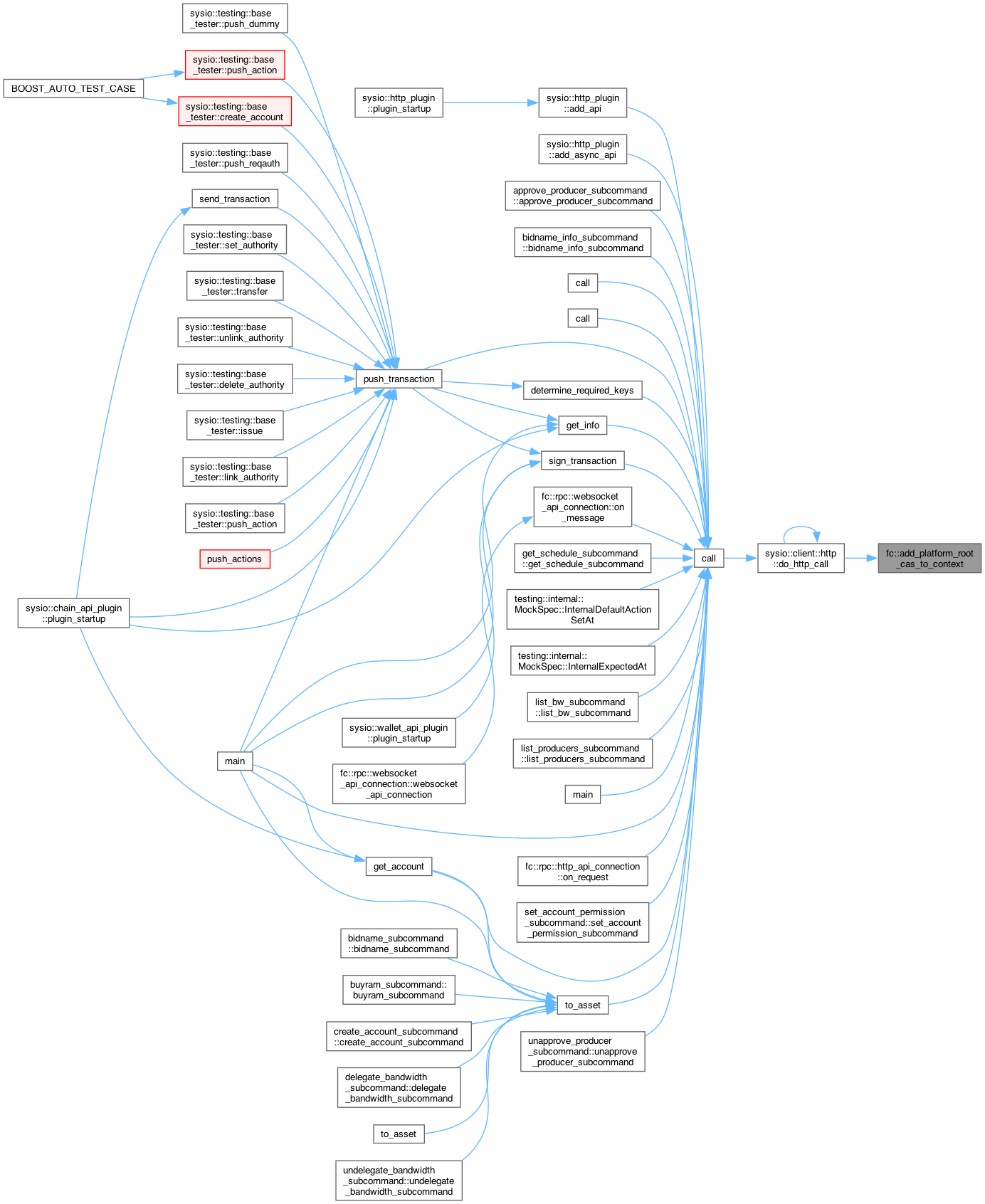
◆ aes_cfb_decrypt()
| unsigned fc::aes_cfb_decrypt | ( | unsigned char * | ciphertext, |
| int | ciphertext_len, | ||
| unsigned char * | key, | ||
| unsigned char * | iv, | ||
| unsigned char * | plaintext ) |
Definition at line 257 of file aes.cpp.
◆ aes_decrypt() [1/2]
| std::vector< char > fc::aes_decrypt | ( | const fc::sha512 & | key, |
| const std::vector< char > & | cipher_text ) |
Definition at line 317 of file aes.cpp.

◆ aes_decrypt() [2/2]
| unsigned fc::aes_decrypt | ( | unsigned char * | ciphertext, |
| int | ciphertext_len, | ||
| unsigned char * | key, | ||
| unsigned char * | iv, | ||
| unsigned char * | plaintext ) |
Definition at line 208 of file aes.cpp.
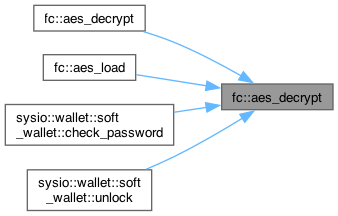
◆ aes_encrypt() [1/2]
| std::vector< char > fc::aes_encrypt | ( | const fc::sha512 & | key, |
| const std::vector< char > & | plain_text ) |
Definition at line 306 of file aes.cpp.

◆ aes_encrypt() [2/2]
| unsigned fc::aes_encrypt | ( | unsigned char * | plaintext, |
| int | plaintext_len, | ||
| unsigned char * | key, | ||
| unsigned char * | iv, | ||
| unsigned char * | ciphertext ) |
example method from wiki.opensslfoundation.com
Definition at line 159 of file aes.cpp.

◆ aes_load()
| std::vector< char > fc::aes_load | ( | const fc::path & | file, |
| const fc::sha512 & | key ) |
recovers the plain_text saved via aes_save()
Definition at line 347 of file aes.cpp.
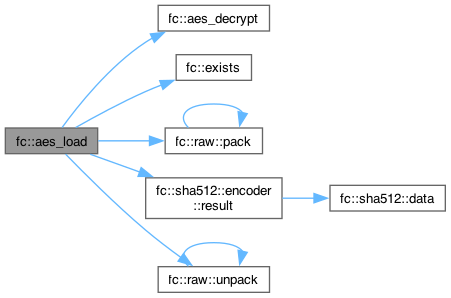
◆ aes_save()
| void fc::aes_save | ( | const fc::path & | file, |
| const fc::sha512 & | key, | ||
| std::vector< char > | plain_text ) |
encrypts plain_text and then includes a checksum that enables us to verify the integrety of the file / key prior to decryption.
Definition at line 331 of file aes.cpp.
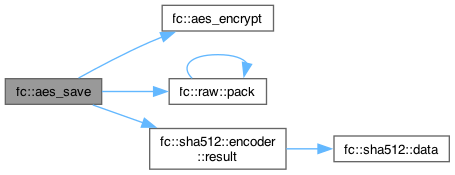
◆ alt_bn128_add()
| std::variant< alt_bn128_error, bytes > fc::alt_bn128_add | ( | const bytes & | op1, |
| const bytes & | op2 ) |
Definition at line 142 of file alt_bn128.cpp.
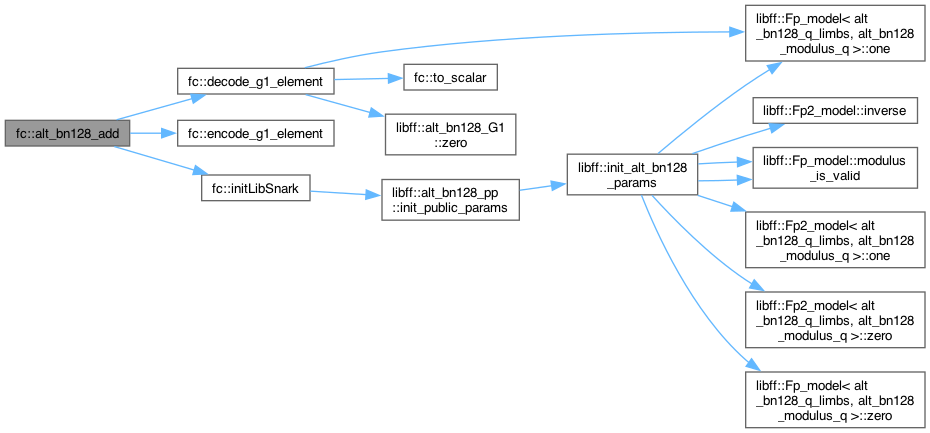

◆ alt_bn128_mul()
| std::variant< alt_bn128_error, bytes > fc::alt_bn128_mul | ( | const bytes & | g1_point, |
| const bytes & | scalar ) |
Definition at line 162 of file alt_bn128.cpp.
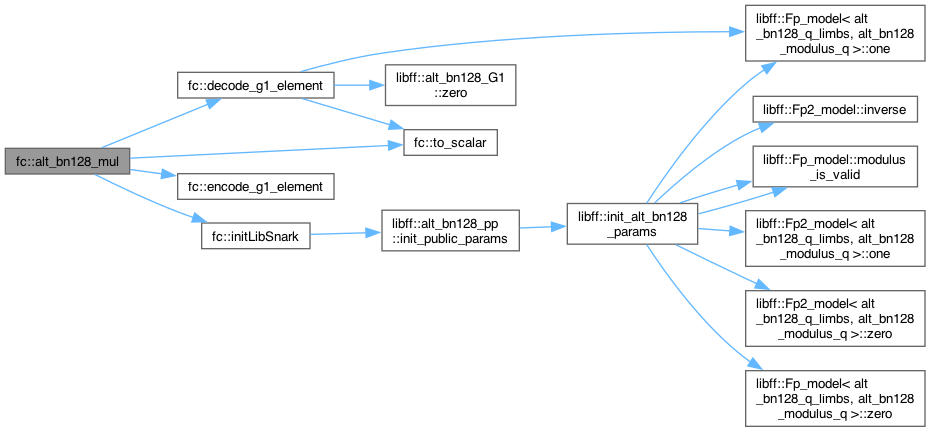

◆ alt_bn128_pair()
| std::variant< alt_bn128_error, bool > fc::alt_bn128_pair | ( | const bytes & | g1_g2_pairs, |
| const yield_function_t & | yield ) |
Definition at line 184 of file alt_bn128.cpp.
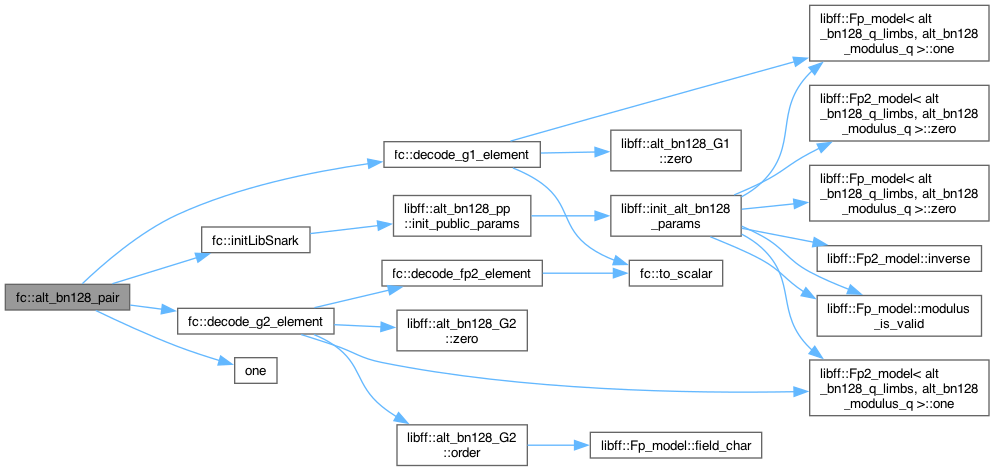

◆ app_path()
| const fc::path & fc::app_path | ( | ) |
- Returns
- the home_path() on Linux, home_path()/Library/Application Support/ on OS X, and APPDATA on windows
Definition at line 503 of file filesystem.cpp.


◆ arrayFromStream()
| variants fc::arrayFromStream | ( | T & | in, |
| uint32_t | max_depth ) |
Definition at line 221 of file json.cpp.
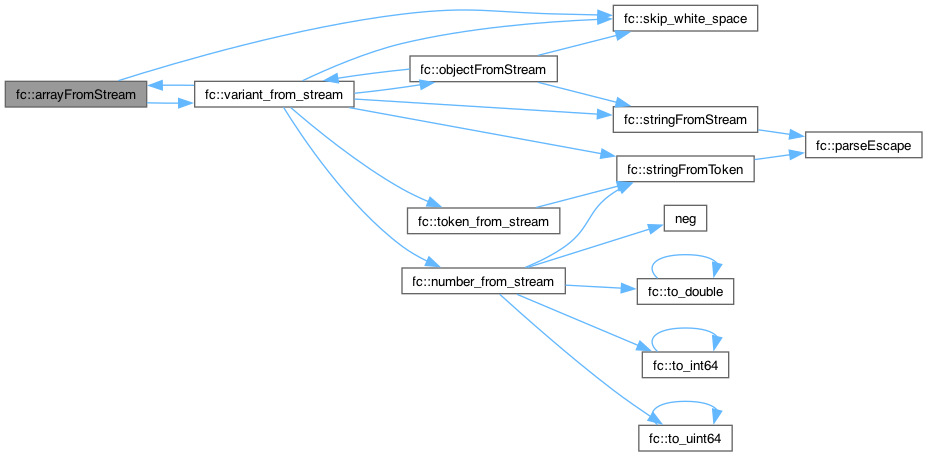
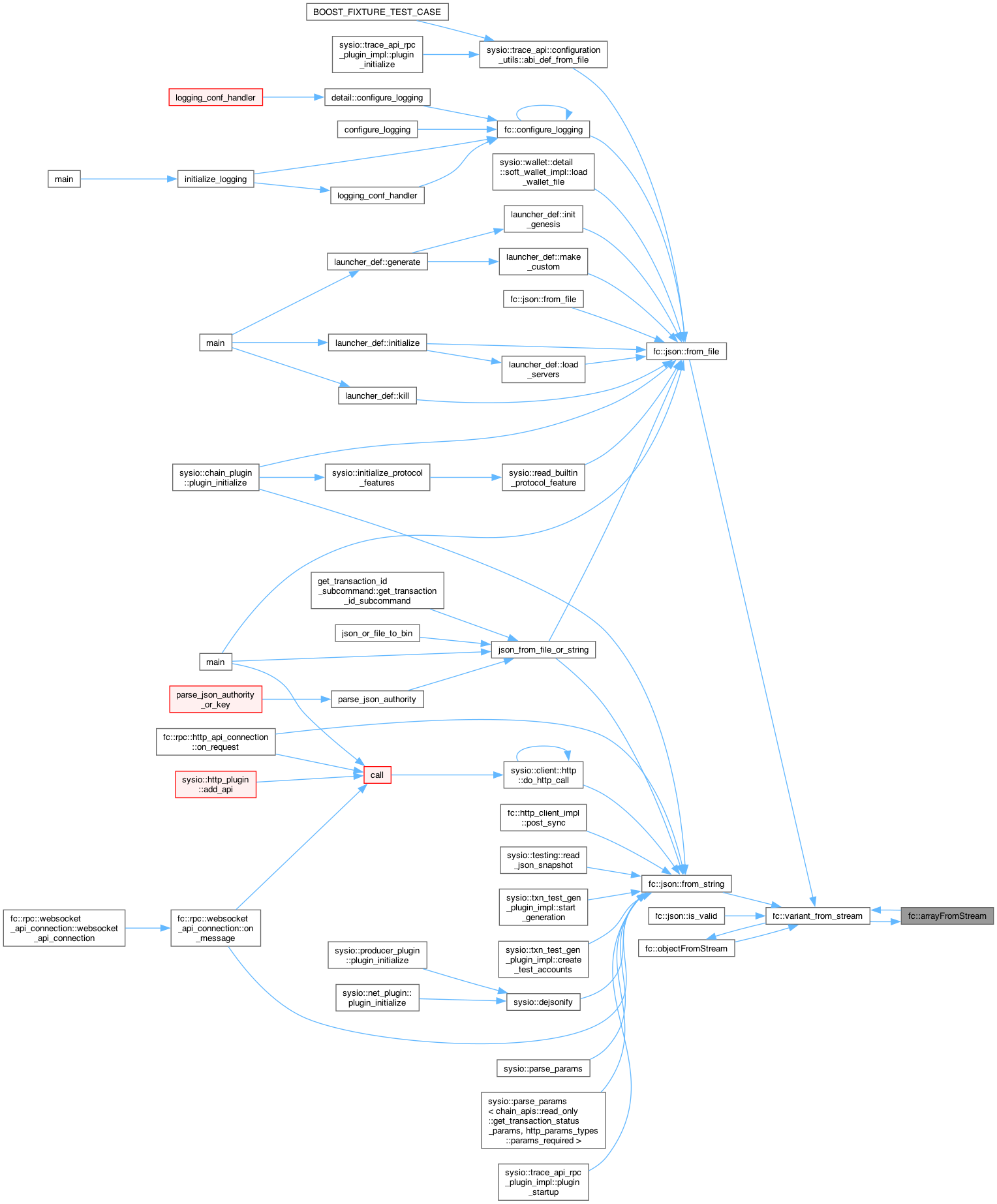
◆ as_type()
Definition at line 46 of file serialization.hpp.

◆ assert_optional()
| bool fc::assert_optional | ( | bool | is_valid | ) |
Definition at line 287 of file exception.cpp.
◆ base64_decode()
| std::string fc::base64_decode | ( | const std::string & | encoded_string | ) |
Definition at line 152 of file base64.cpp.

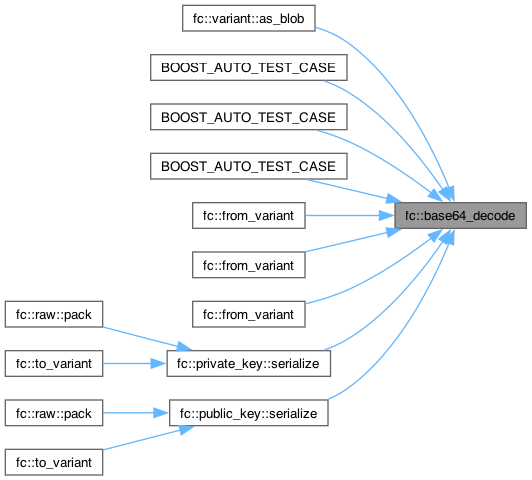
◆ base64_decode_impl()
| std::string fc::base64_decode_impl | ( | std::string const & | encoded_string, |
| const char *const | b64_chars ) |
Definition at line 110 of file base64.cpp.
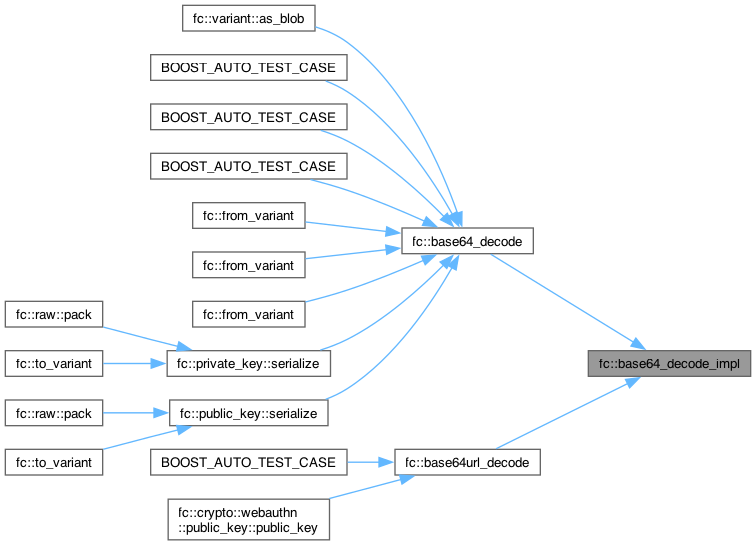
◆ base64_encode() [1/3]
|
inline |
Definition at line 6 of file base64.hpp.

◆ base64_encode() [2/3]
| std::string fc::base64_encode | ( | const std::string & | enc | ) |
◆ base64_encode() [3/3]
| std::string fc::base64_encode | ( | unsigned char const * | bytes_to_encode, |
| unsigned int | in_len ) |
Definition at line 92 of file base64.cpp.

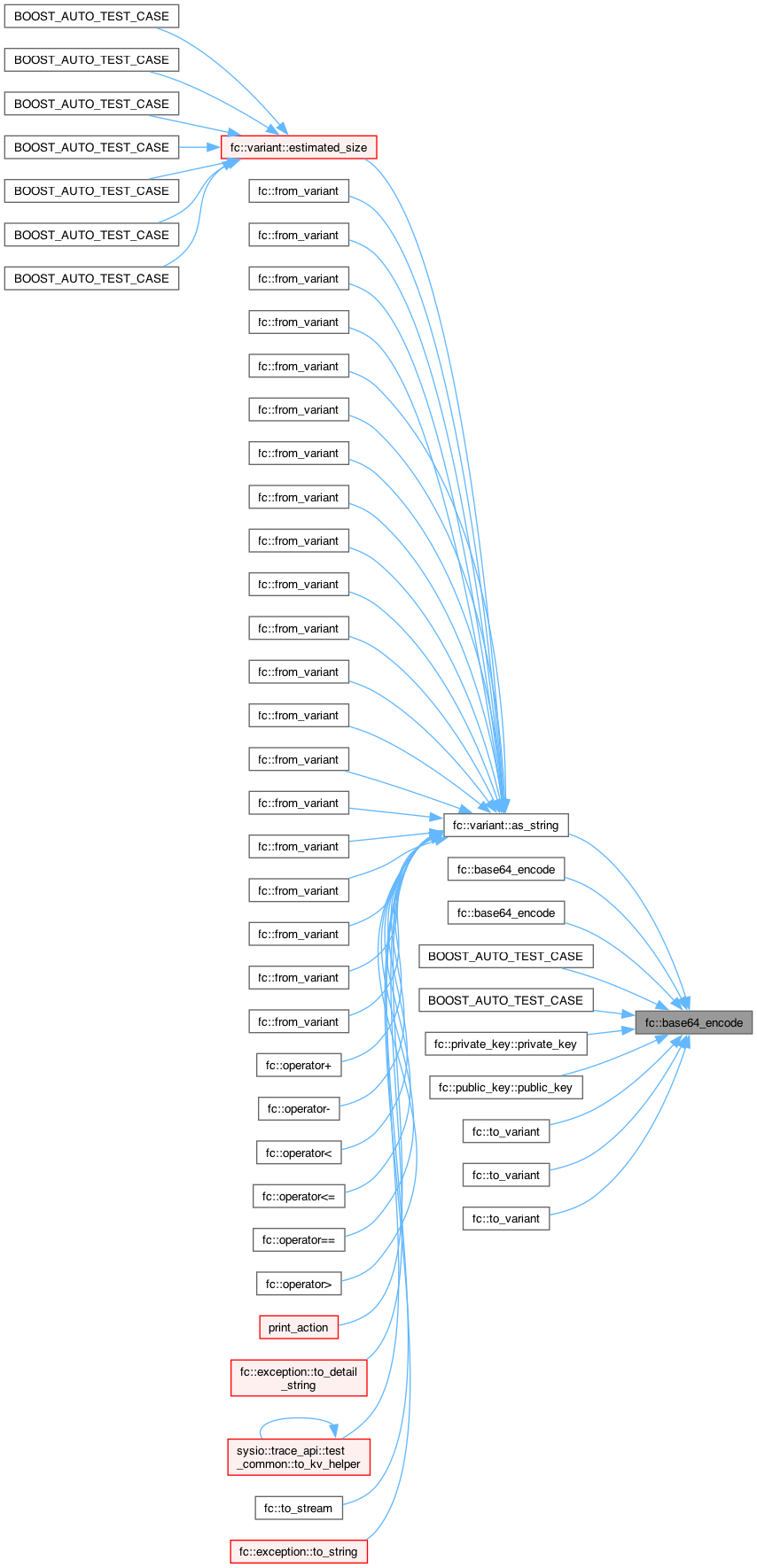
◆ base64_encode_impl()
| std::string fc::base64_encode_impl | ( | unsigned char const * | bytes_to_encode, |
| unsigned int | in_len, | ||
| const char *const | b64_chars ) |
Definition at line 48 of file base64.cpp.
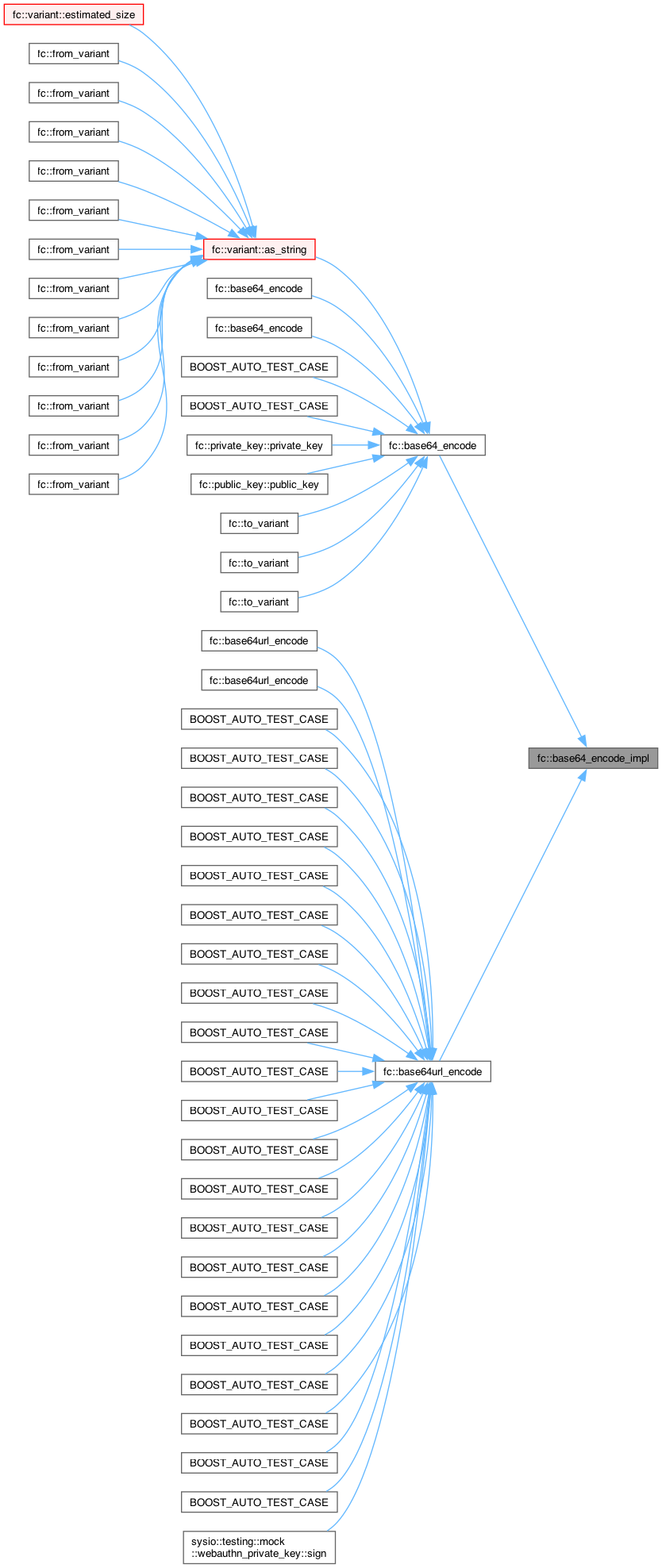
◆ base64url_decode()
| std::string fc::base64url_decode | ( | const std::string & | encoded_string | ) |
Definition at line 156 of file base64.cpp.


◆ base64url_encode() [1/3]
|
inline |
Definition at line 11 of file base64.hpp.

◆ base64url_encode() [2/3]
| std::string fc::base64url_encode | ( | const std::string & | enc | ) |
◆ base64url_encode() [3/3]
| std::string fc::base64url_encode | ( | unsigned char const * | bytes_to_encode, |
| unsigned int | in_len ) |
Definition at line 101 of file base64.cpp.

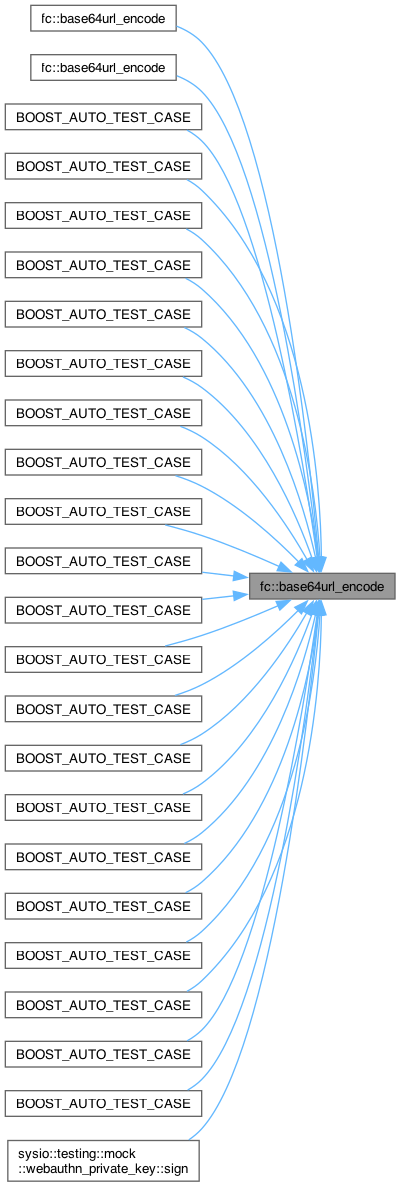
◆ blake2b()
| std::variant< blake2b_error, bytes > fc::blake2b | ( | uint32_t | _rounds, |
| const bytes & | _h, | ||
| const bytes & | _m, | ||
| const bytes & | _t0_offset, | ||
| const bytes & | _t1_offset, | ||
| bool | _f, | ||
| const yield_function_t & | yield ) |
Definition at line 105 of file blake2.cpp.
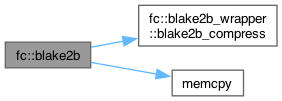

◆ BlockToBytes()
|
inline |
Definition at line 425 of file blowfish.cpp.

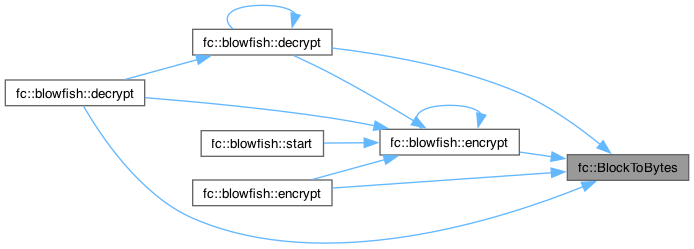
◆ Byte()
|
inline |
Definition at line 14 of file blowfish.cpp.

◆ BytesToBlock()
|
inline |
◆ call_fused()
| auto fc::call_fused | ( | Functor | f, |
| const tuple<> & | t ) -> decltype( f( ) ) |
◆ canonical()
Definition at line 357 of file filesystem.cpp.


◆ cap_error_code()
Definition at line 572 of file serialization.hpp.
◆ check_size()
Definition at line 58 of file fwd_impl.hpp.

◆ check_udt_errors()
| void fc::check_udt_errors | ( | ) |
Definition at line 14 of file udt_socket.cpp.
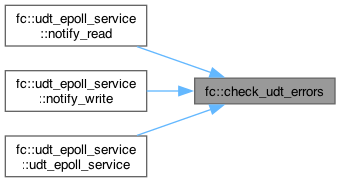
◆ chmod()
| void fc::chmod | ( | const path & | p, |
| int | perm ) |
Definition at line 302 of file filesystem.cpp.


◆ city_hash128()
| uint128 fc::city_hash128 | ( | const char * | s, |
| size_t | len ) |
Definition at line 536 of file city.cpp.


◆ city_hash32()
| uint32_t fc::city_hash32 | ( | const char * | buf, |
| size_t | len ) |
Definition at line 217 of file city.cpp.
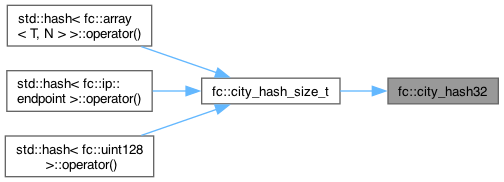
◆ city_hash64()
| uint64_t fc::city_hash64 | ( | const char * | buf, |
| size_t | len ) |
Definition at line 394 of file city.cpp.


◆ city_hash_crc_128()
| uint128 fc::city_hash_crc_128 | ( | const char * | s, |
| size_t | len ) |
◆ city_hash_crc_256()
Definition at line 651 of file city.cpp.

◆ city_hash_crc_64()
| uint64_t fc::city_hash_crc_64 | ( | const char * | buf, |
| size_t | len ) |
◆ city_hash_size_t()
|
inline |
◆ CityHash128WithSeed()
Definition at line 473 of file city.cpp.


◆ CityHash64WithSeed()
Definition at line 437 of file city.cpp.

◆ CityHash64WithSeeds()
◆ CityHashCrc128WithSeed()
Definition at line 658 of file city.cpp.

◆ CityHashCrc256()
| void fc::CityHashCrc256 | ( | const char * | s, |
| size_t | len, | ||
| uint64_t * | result ) |
◆ clean_append()
| void fc::clean_append | ( | string & | app, |
| const std::string_view & | s, | ||
| size_t | pos = 0, | ||
| size_t | len = string::npos ) |
Definition at line 766 of file variant.cpp.
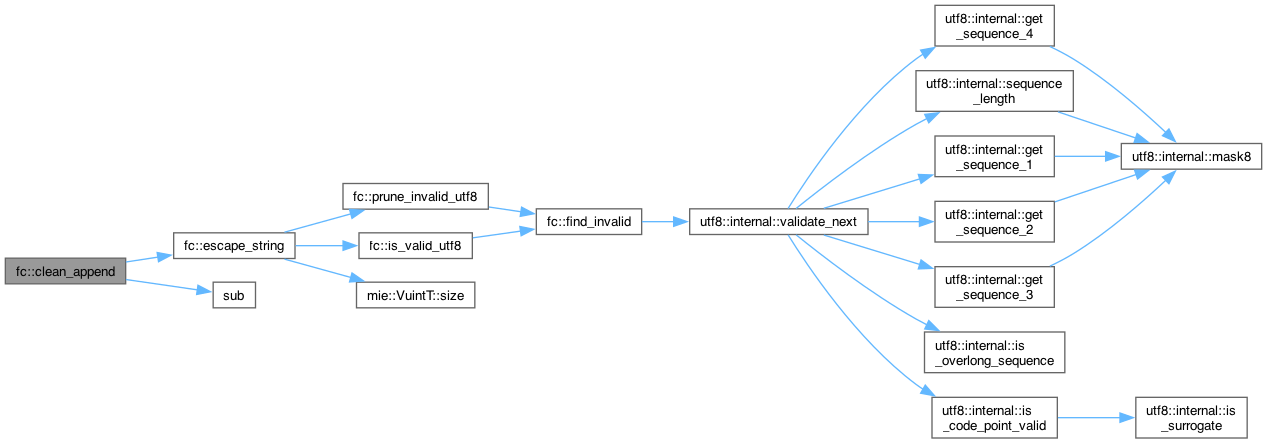
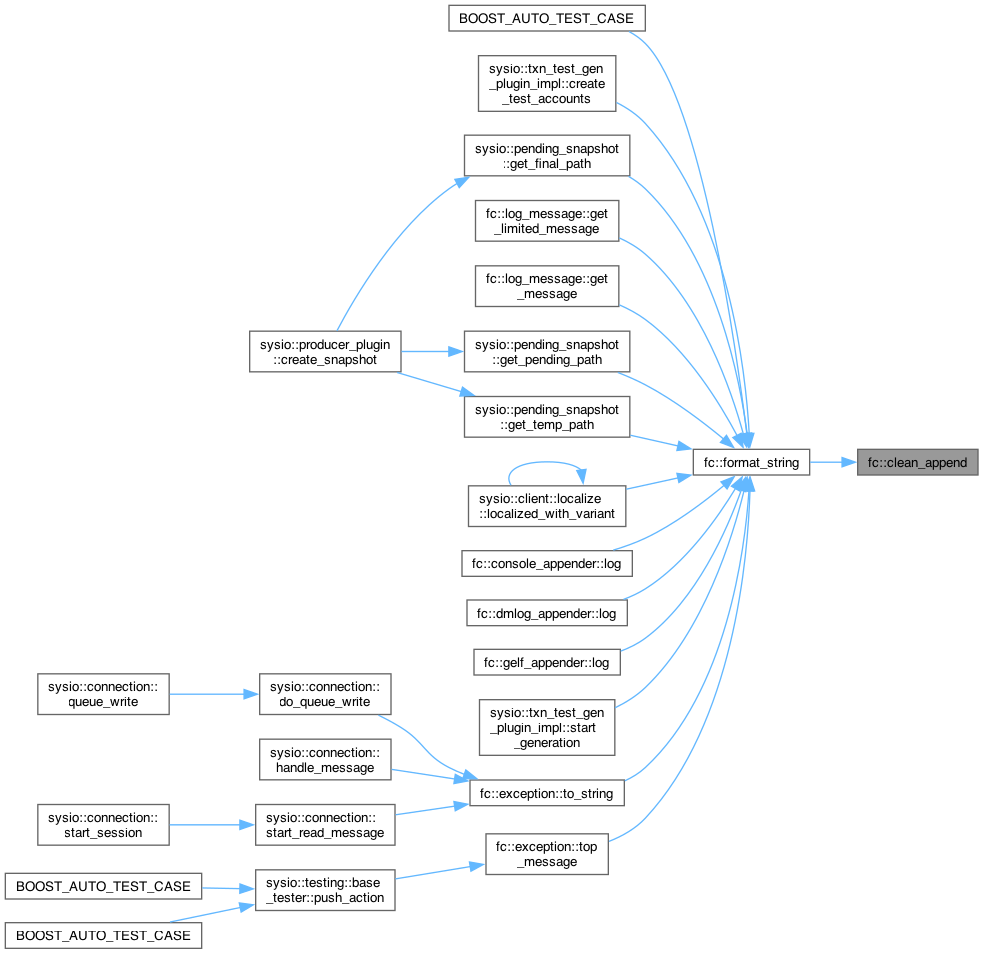
◆ configure_logging() [1/2]
| void fc::configure_logging | ( | const fc::path & | log_config | ) |
Definition at line 52 of file logger_config.cpp.
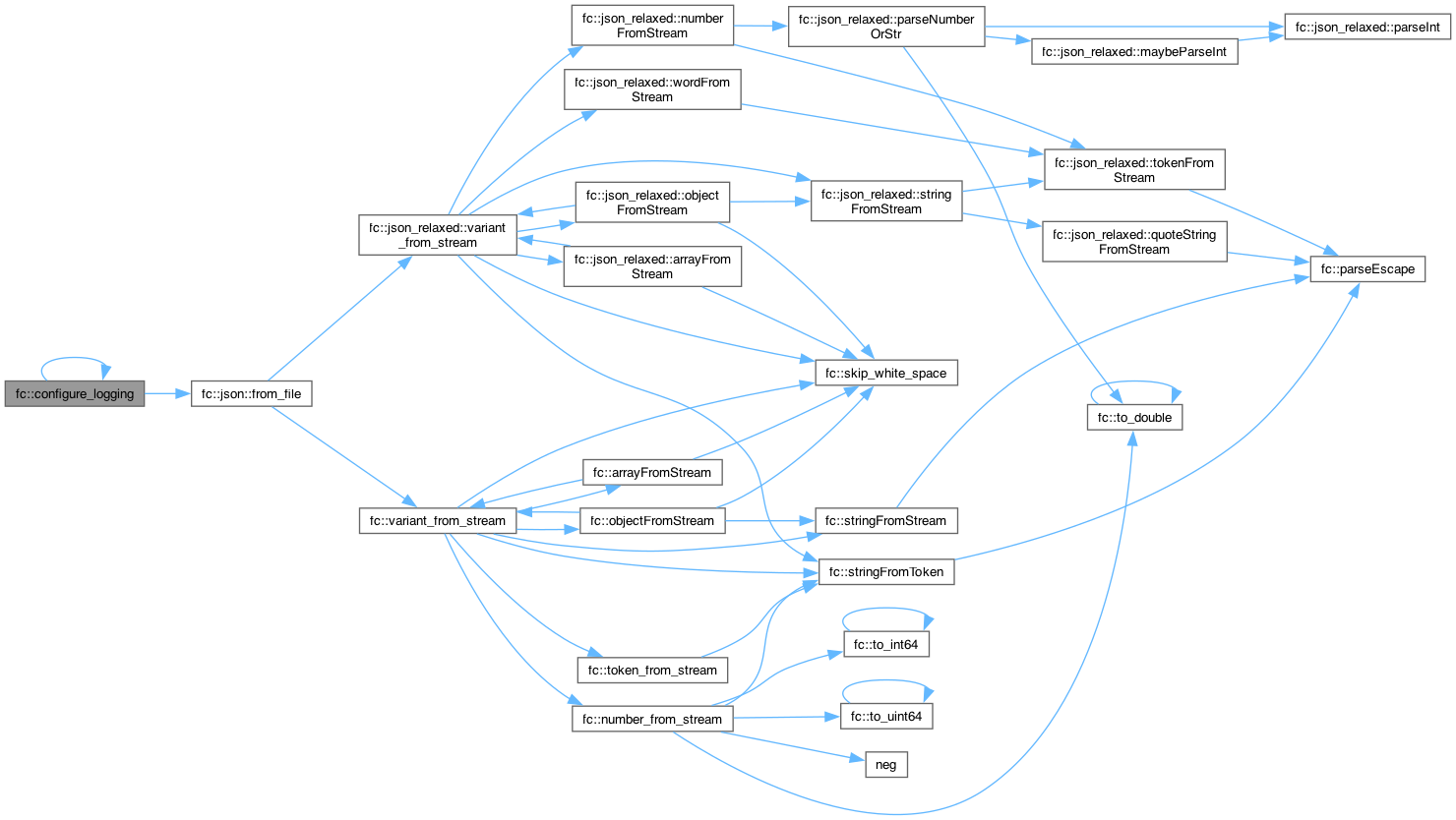

◆ configure_logging() [2/2]
| bool fc::configure_logging | ( | const logging_config & | l | ) |
Definition at line 55 of file logger_config.cpp.
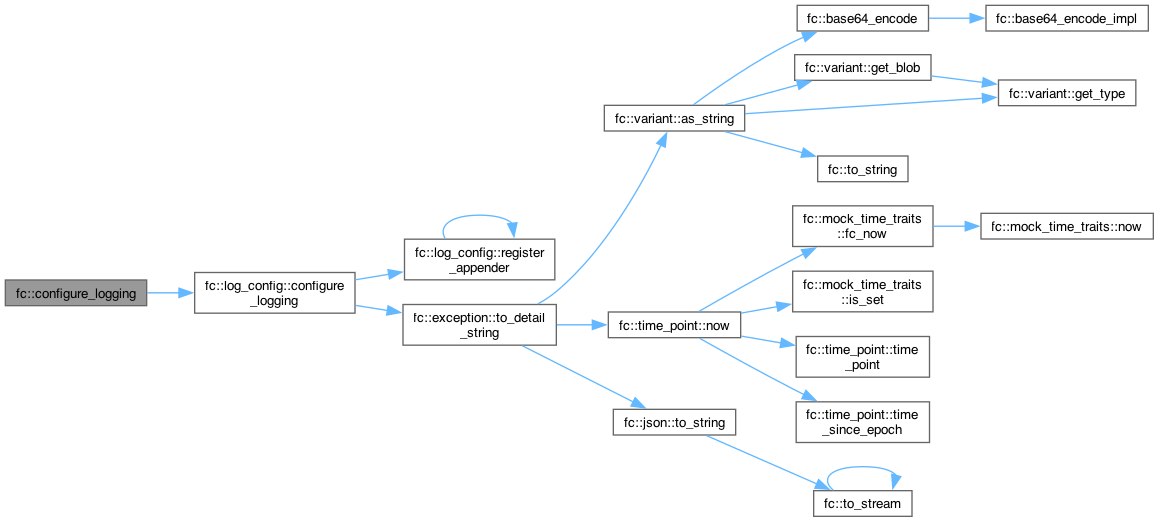
◆ const_strlen()
|
constexpr |
Definition at line 142 of file utility.hpp.
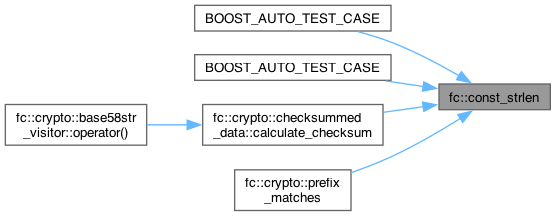
◆ copy()
Definition at line 249 of file filesystem.cpp.

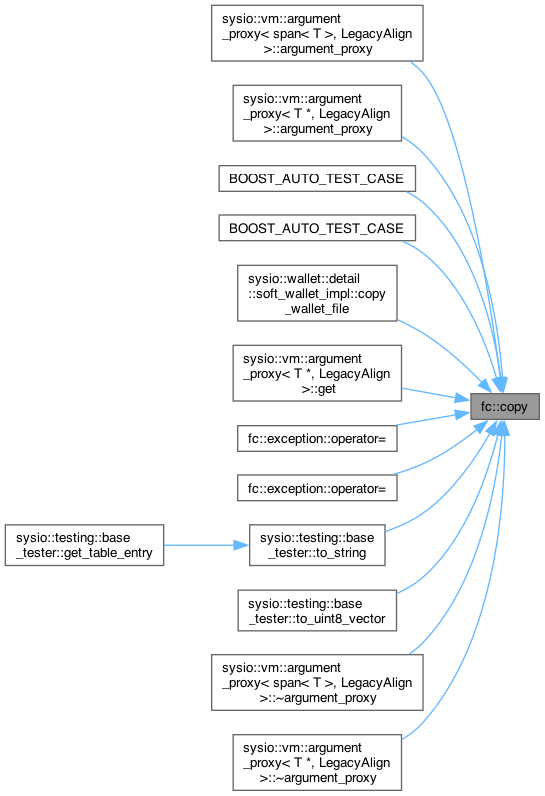
◆ copy_append()
| void fc::copy_append | ( | Container & | dest, |
| const Container & | src ) |
Definition at line 162 of file utility.hpp.
◆ copy_exception()
| fc::exception_ptr fc::copy_exception | ( | T && | e | ) |
Definition at line 198 of file exception.hpp.

◆ create_directories()
| void fc::create_directories | ( | const path & | p | ) |
Definition at line 218 of file filesystem.cpp.

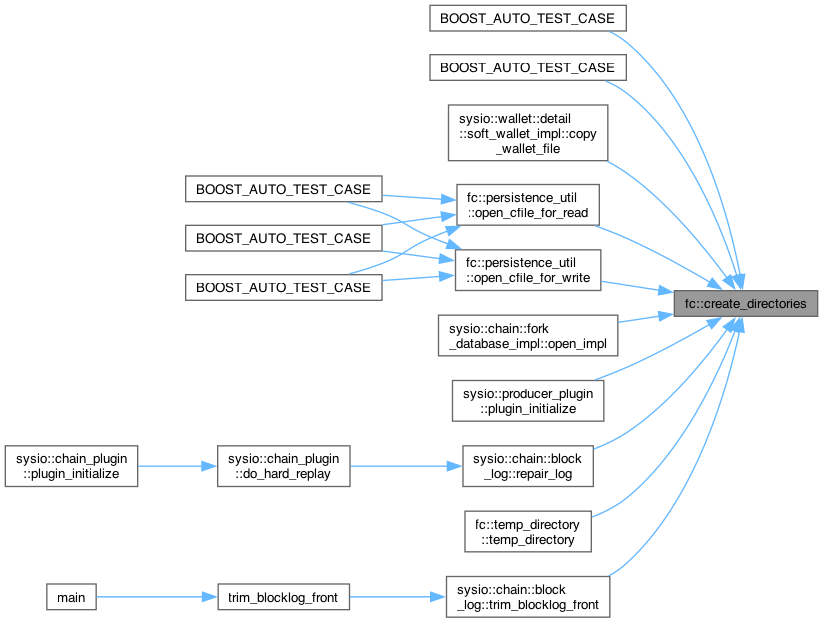
◆ create_hard_link()
Definition at line 342 of file filesystem.cpp.

◆ create_zipkin_variant()
| fc::variant fc::create_zipkin_variant | ( | zipkin_span::span_data && | span, |
| const std::string & | service_name ) |
Definition at line 121 of file zipkin.cpp.


◆ current_path()
| const fc::path & fc::current_path | ( | ) |
- Returns
- application executable path
Definition at line 521 of file filesystem.cpp.
◆ days()
|
inlineconstexpr |
◆ decode_fp2_element()
|
noexcept |
Definition at line 68 of file alt_bn128.cpp.


◆ decode_g1_element()
|
noexcept |
Definition at line 42 of file alt_bn128.cpp.
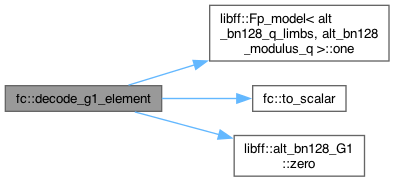
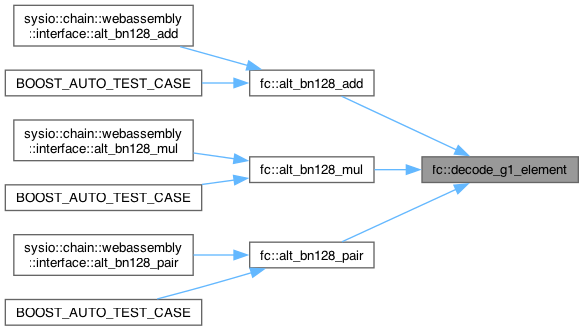
◆ decode_g2_element()
|
noexcept |
Definition at line 87 of file alt_bn128.cpp.
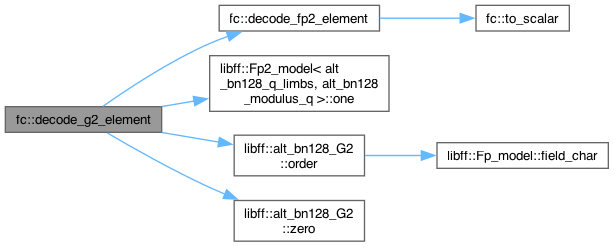

◆ decodeUtf8()
| void fc::decodeUtf8 | ( | const std::string & | input, |
| std::wstring * | storage ) |
Decodes utf 8 std::string into unicode string.
- Parameters
-
input - input string to be decoded and stored in 'storage' storage - buffer for converted text. Cannot be nullptr.
Definition at line 71 of file utf8.cpp.
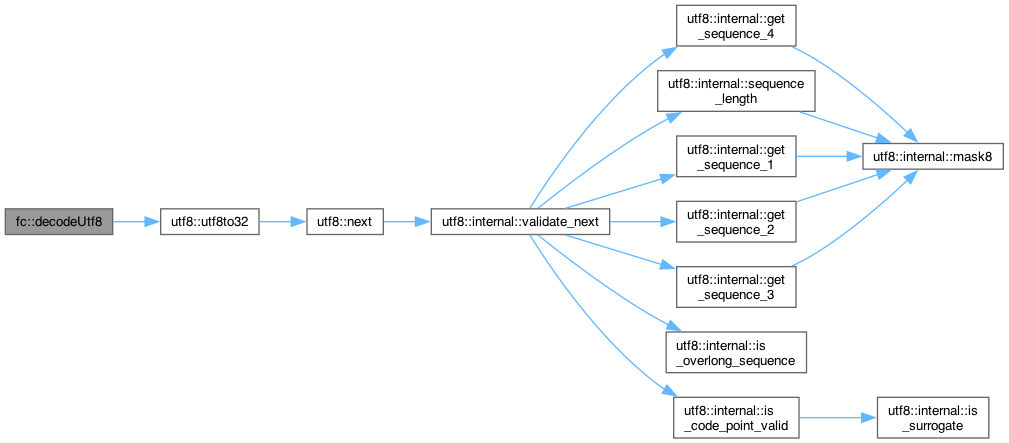

◆ deduplicate()
| void fc::deduplicate | ( | Container & | entries | ) |
Definition at line 171 of file utility.hpp.
◆ default_epool_service()
| udt_epoll_service & fc::default_epool_service | ( | ) |
Definition at line 145 of file udt_socket.cpp.
◆ digest()
| fc::sha256 fc::digest | ( | const T & | value | ) |
Definition at line 9 of file digest.hpp.


◆ directory_size()
Definition at line 229 of file filesystem.cpp.
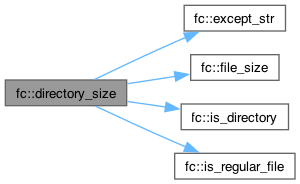
◆ double_to_float64()
|
inline |
Definition at line 115 of file database_utils.hpp.

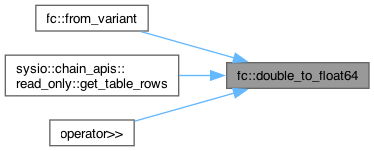
◆ encode_g1_element()
|
noexcept |
Definition at line 124 of file alt_bn128.cpp.
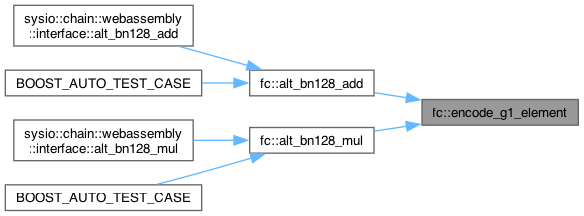
◆ encodeUtf8()
| void fc::encodeUtf8 | ( | const std::wstring & | input, |
| std::string * | storage ) |
Encodes given wide (unicode) string into UTF-8 representation.
- Parameters
-
input - input string to be encoded and stored in 'storage' storage - buffer for converted text. Cannot be nullptr.
Definition at line 78 of file utf8.cpp.

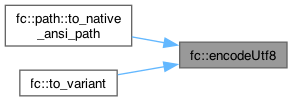
◆ endian_reverse_u32()
Definition at line 19 of file bitutil.hpp.
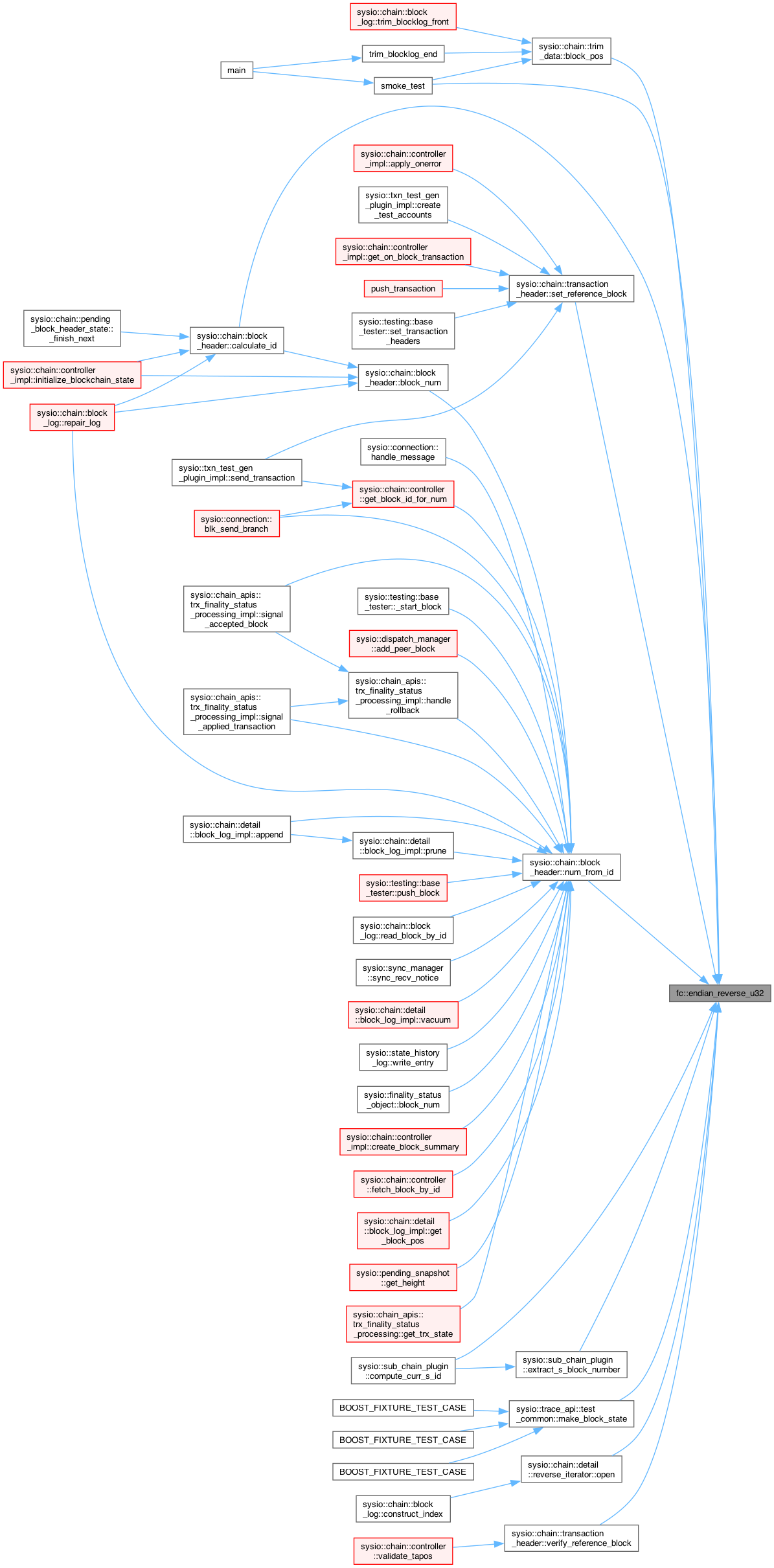
◆ endian_reverse_u64()
Definition at line 6 of file bitutil.hpp.
◆ escape_string()
| std::string fc::escape_string | ( | const std::string_view & | str, |
| const json::yield_function_t & | yield, | ||
| bool | escape_control_chars ) |
Convert '\t', '\r', '
', '\' and '"' to "\t\r\n\\\"" if escape_control_chars == true Convert all other < 32 & 127 ascii to escaped unicode "\u00xx" Removes invalid utf8 characters Escapes Control sequence Introducer 0x9b to \u009b All other characters unmolested.
Definition at line 495 of file json.cpp.
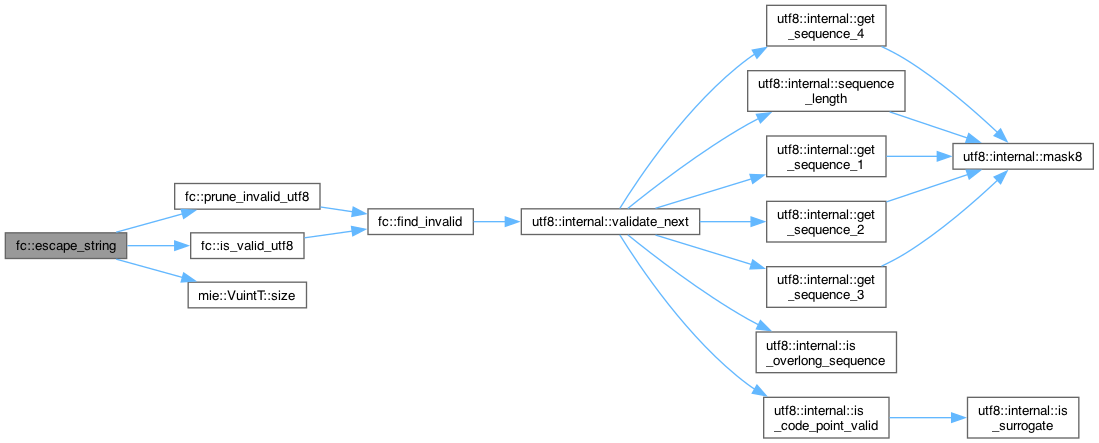
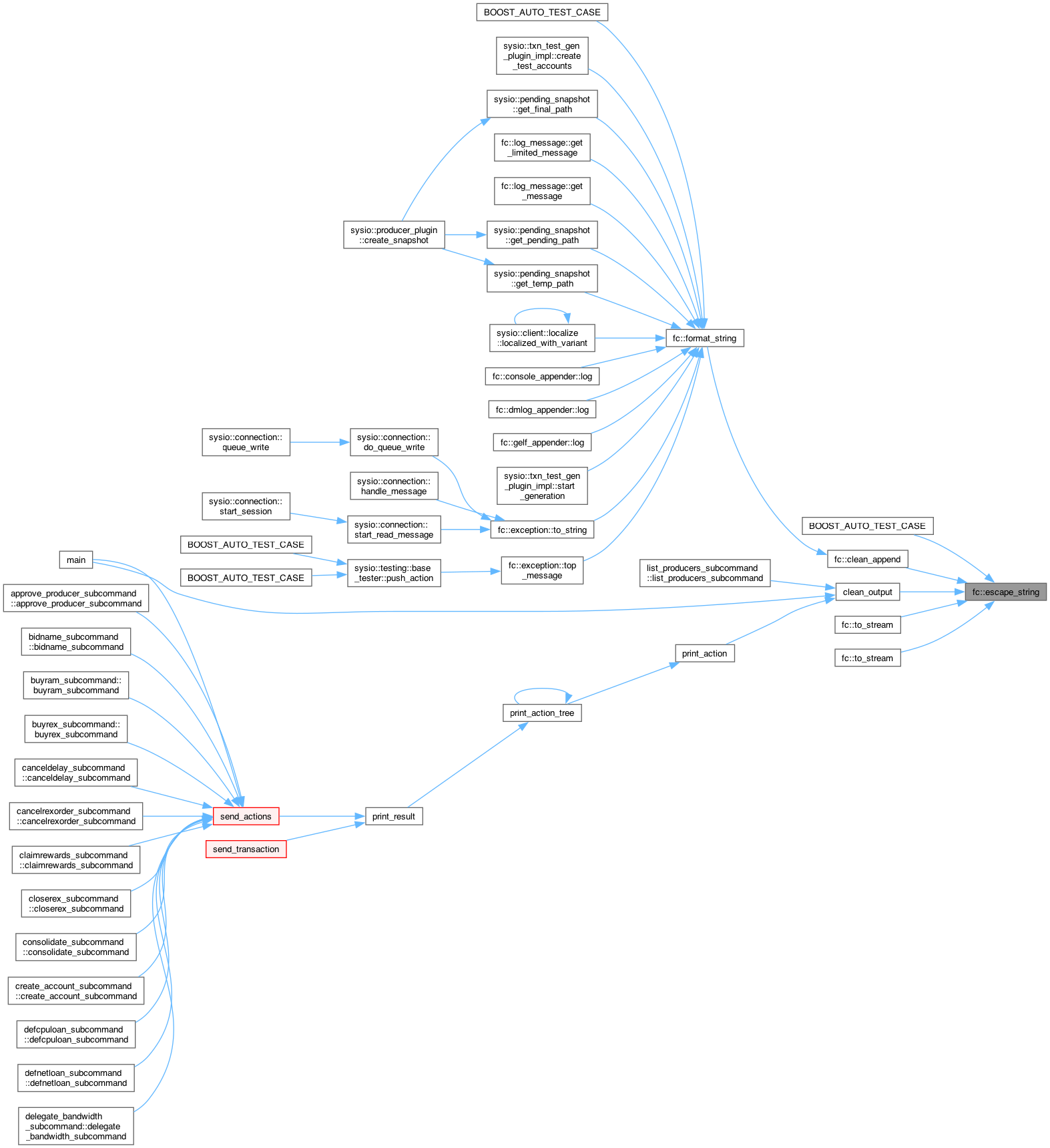
◆ except_str()
| fc::string fc::except_str | ( | ) |
Definition at line 269 of file exception.cpp.
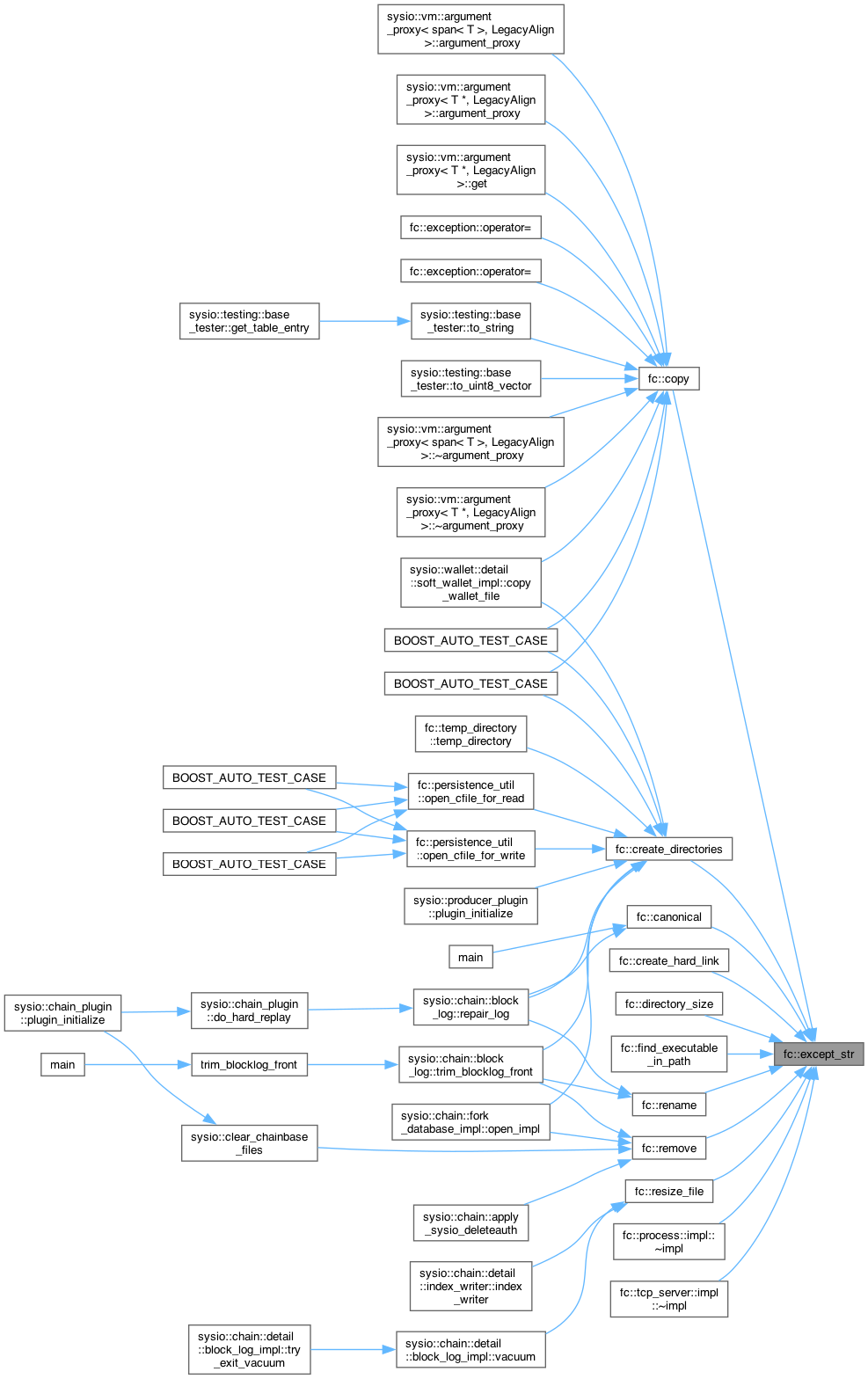
◆ exists()
| bool fc::exists | ( | const path & | p | ) |
◆ FC_DECLARE_EXCEPTION() [1/18]
| fc::FC_DECLARE_EXCEPTION | ( | aes_exception | , |
| aes_error_code | , | ||
| "AES error" | ) |
◆ FC_DECLARE_EXCEPTION() [2/18]
| fc::FC_DECLARE_EXCEPTION | ( | assert_exception | , |
| assert_exception_code | , | ||
| "Assert Exception" | ) |
◆ FC_DECLARE_EXCEPTION() [3/18]
| fc::FC_DECLARE_EXCEPTION | ( | bad_cast_exception | , |
| bad_cast_exception_code | , | ||
| "Bad Cast" | ) |
◆ FC_DECLARE_EXCEPTION() [4/18]
| fc::FC_DECLARE_EXCEPTION | ( | canceled_exception | , |
| canceled_exception_code | , | ||
| "Canceled" | ) |
◆ FC_DECLARE_EXCEPTION() [5/18]
| fc::FC_DECLARE_EXCEPTION | ( | divide_by_zero_exception | , |
| divide_by_zero_code | , | ||
| "Integer Divide By Zero" | ) |
◆ FC_DECLARE_EXCEPTION() [6/18]
| fc::FC_DECLARE_EXCEPTION | ( | eof_exception | , |
| eof_exception_code | , | ||
| "End Of File" | ) |
◆ FC_DECLARE_EXCEPTION() [7/18]
| fc::FC_DECLARE_EXCEPTION | ( | file_not_found_exception | , |
| file_not_found_exception_code | , | ||
| "File Not Found" | ) |
◆ FC_DECLARE_EXCEPTION() [8/18]
| fc::FC_DECLARE_EXCEPTION | ( | invalid_arg_exception | , |
| invalid_arg_exception_code | , | ||
| "Invalid Argument" | ) |
◆ FC_DECLARE_EXCEPTION() [9/18]
| fc::FC_DECLARE_EXCEPTION | ( | invalid_operation_exception | , |
| invalid_operation_exception_code | , | ||
| "Invalid Operation" | ) |
◆ FC_DECLARE_EXCEPTION() [10/18]
| fc::FC_DECLARE_EXCEPTION | ( | key_not_found_exception | , |
| key_not_found_exception_code | , | ||
| "Key Not Found" | ) |
◆ FC_DECLARE_EXCEPTION() [11/18]
| fc::FC_DECLARE_EXCEPTION | ( | null_optional | , |
| null_optional_code | , | ||
| "null optional" | ) |
◆ FC_DECLARE_EXCEPTION() [12/18]
| fc::FC_DECLARE_EXCEPTION | ( | out_of_range_exception | , |
| out_of_range_exception_code | , | ||
| "Out of Range" | ) |
◆ FC_DECLARE_EXCEPTION() [13/18]
| fc::FC_DECLARE_EXCEPTION | ( | overflow_exception | , |
| overflow_code | , | ||
| "Integer Overflow" | ) |
◆ FC_DECLARE_EXCEPTION() [14/18]
| fc::FC_DECLARE_EXCEPTION | ( | parse_error_exception | , |
| parse_error_exception_code | , | ||
| "Parse Error" | ) |
◆ FC_DECLARE_EXCEPTION() [15/18]
| fc::FC_DECLARE_EXCEPTION | ( | timeout_exception | , |
| timeout_exception_code | , | ||
| "Timeout" | ) |
◆ FC_DECLARE_EXCEPTION() [16/18]
| fc::FC_DECLARE_EXCEPTION | ( | udt_exception | , |
| udt_error_code | , | ||
| "UDT error" | ) |
◆ FC_DECLARE_EXCEPTION() [17/18]
| fc::FC_DECLARE_EXCEPTION | ( | underflow_exception | , |
| underflow_code | , | ||
| "Integer Underflow" | ) |
◆ FC_DECLARE_EXCEPTION() [18/18]
| fc::FC_DECLARE_EXCEPTION | ( | unknown_host_exception | , |
| unknown_host_exception_code | , | ||
| "Unknown Host" | ) |
◆ file_size()
◆ find_executable_in_path()
| fc::path fc::find_executable_in_path | ( | const fc::string | name | ) |
Definition at line 15 of file process.cpp.

◆ find_invalid()
| std::pair< octet_iterator, uint32_t > fc::find_invalid | ( | octet_iterator | start, |
| octet_iterator | end, | ||
| const std::pair< uint32_t, uint32_t > & | invalid_range ) |
Definition at line 22 of file utf8.cpp.
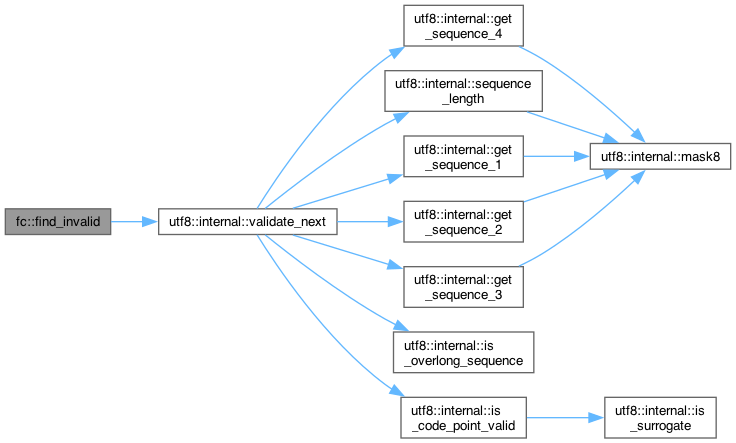
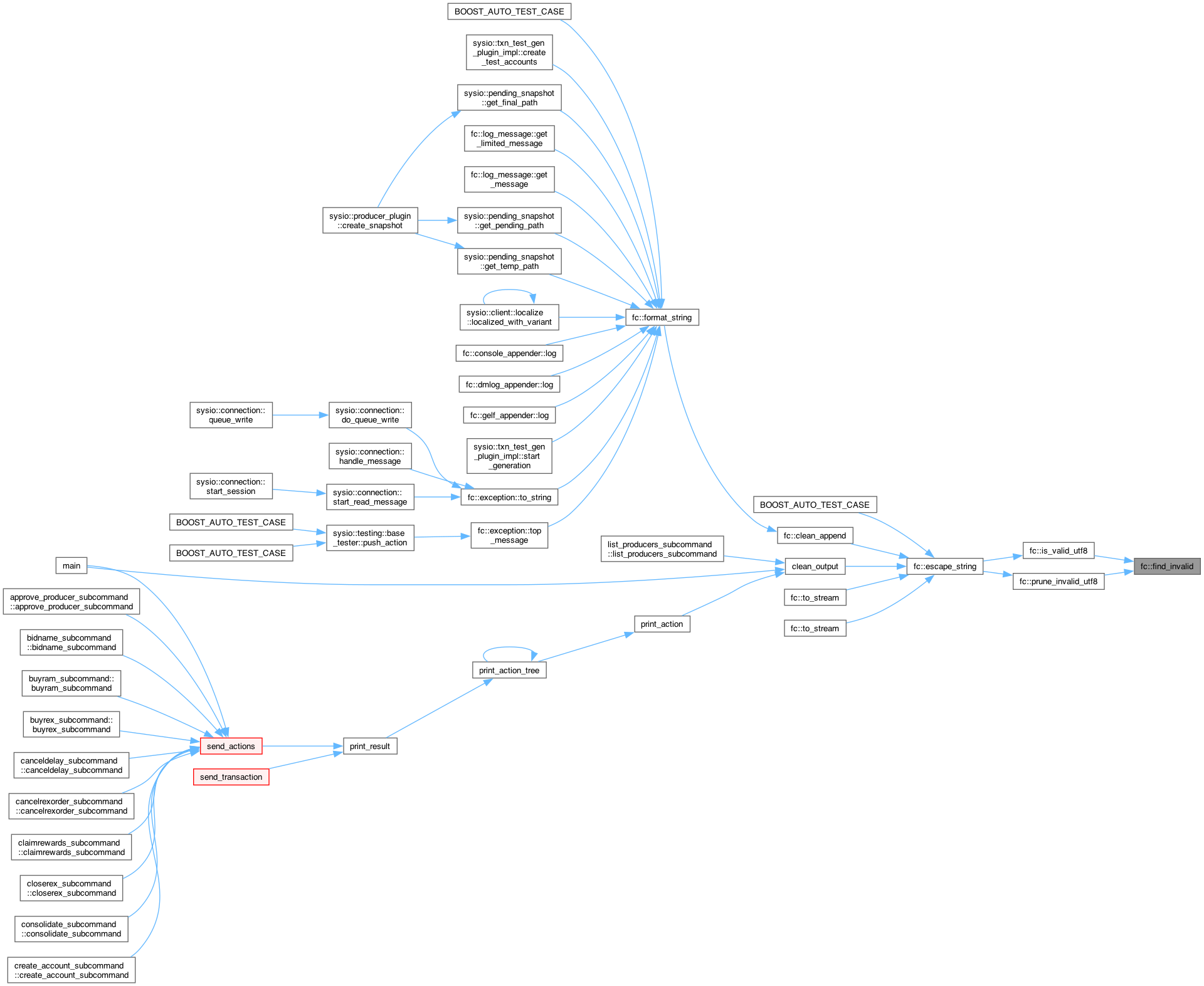
◆ fixed_size()
◆ float128_to_uint128()
|
inline |
Definition at line 120 of file database_utils.hpp.


◆ float64_to_double()
|
inline |
Definition at line 110 of file database_utils.hpp.


◆ format_string()
| string fc::format_string | ( | const fc::string & | frmt, |
| const variant_object & | args, | ||
| bool | minimize = false ) |
Definition at line 773 of file variant.cpp.

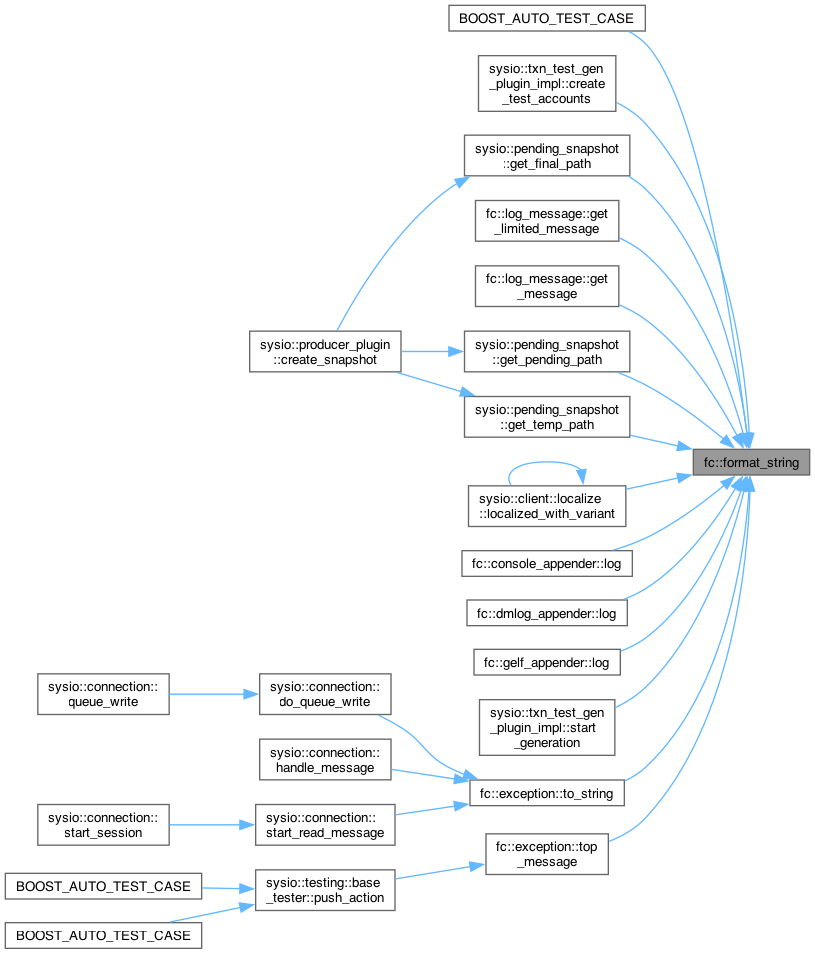
◆ from_base32()
| std::vector< char > fc::from_base32 | ( | const fc::string & | b32 | ) |
◆ from_base36()
| std::vector< char > fc::from_base36 | ( | const fc::string & | b36 | ) |
Definition at line 45 of file base36.cpp.

◆ from_base58() [1/2]
| std::vector< char > fc::from_base58 | ( | const std::string & | base58_str | ) |
Definition at line 628 of file base58.cpp.

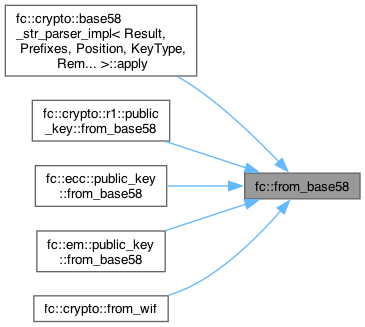
◆ from_base58() [2/2]
| size_t fc::from_base58 | ( | const std::string & | base58_str, |
| char * | out_data, | ||
| size_t | out_data_len ) |
- Returns
- the number of bytes decoded
Definition at line 638 of file base58.cpp.

◆ from_hex() [1/2]
| uint8_t fc::from_hex | ( | char | c | ) |
Definition at line 6 of file hex.cpp.
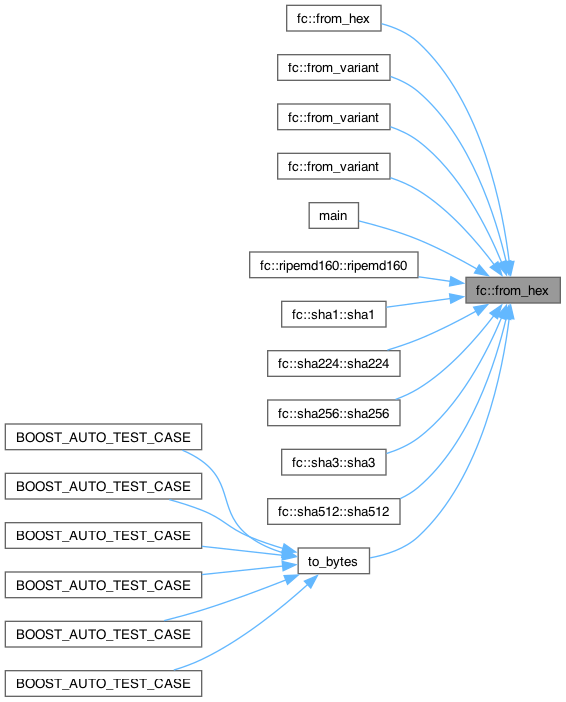
◆ from_hex() [2/2]
| size_t fc::from_hex | ( | const fc::string & | hex_str, |
| char * | out_data, | ||
| size_t | out_data_len ) |
- Returns
- the number of bytes decoded
Definition at line 27 of file hex.cpp.

◆ from_index()
Definition at line 15 of file static_variant.hpp.

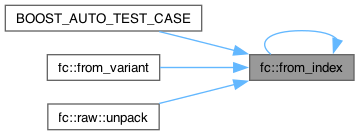
◆ from_variant() [1/103]
| void fc::from_variant | ( | const fc::variant & | input_variant, |
| fc::microseconds & | output_microseconds ) |
Definition at line 164 of file time.cpp.

◆ from_variant() [2/103]
| void fc::from_variant | ( | const fc::variant & | variant_to_convert, |
| fc::path & | path_output ) |
Definition at line 43 of file filesystem.cpp.
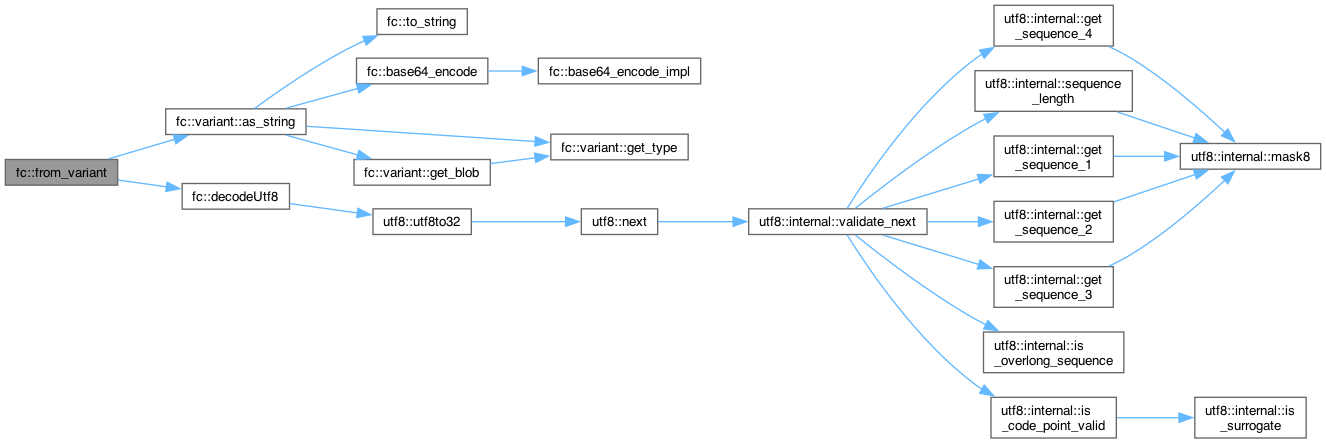
◆ from_variant() [3/103]
| void fc::from_variant | ( | const fc::variant & | v, |
| bip::multiset< T, U... > & | s ) |
◆ from_variant() [4/103]
| void fc::from_variant | ( | const fc::variant & | v, |
| bip::set< T, U... > & | s ) |
◆ from_variant() [5/103]
| void fc::from_variant | ( | const fc::variant & | v, |
| boost::container::deque< T, U... > & | d ) |
Definition at line 529 of file variant.hpp.

◆ from_variant() [6/103]
| void fc::from_variant | ( | const fc::variant & | v, |
| boost::container::vector< char, U... > & | vec ) |
Definition at line 135 of file flat.hpp.

◆ from_variant() [7/103]
| void fc::from_variant | ( | const fc::variant & | v, |
| boost::container::vector< T, U... > & | vec ) |
Definition at line 115 of file flat.hpp.

◆ from_variant() [8/103]
| void fc::from_variant | ( | const fc::variant & | v, |
| boost::multi_index_container< T, Args... > & | s ) |
◆ from_variant() [9/103]
| void fc::from_variant | ( | const fc::variant & | v, |
| boost::multiprecision::number< T > & | n ) |
◆ from_variant() [10/103]
| void fc::from_variant | ( | const fc::variant & | v, |
| flat_multiset< T, U... > & | s ) |
◆ from_variant() [11/103]
| void fc::from_variant | ( | const fc::variant & | v, |
| flat_set< T, U... > & | s ) |
◆ from_variant() [12/103]
|
inline |
Overloaded from_variant to allow parsing an account with a permission wildcard (empty) from a string instead of an object
- Parameters
-
v a
Definition at line 113 of file account_query_db.hpp.
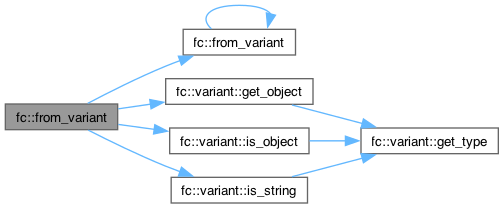
◆ from_variant() [13/103]
| void fc::from_variant | ( | const fc::variant & | v, |
| safe< T > & | s ) |
◆ from_variant() [14/103]
| void fc::from_variant | ( | const fc::variant & | v, |
| std::pair< A, B > & | p ) |
Definition at line 606 of file variant.hpp.

◆ from_variant() [15/103]
| void fc::from_variant | ( | const fc::variant & | v, |
| std::unique_ptr< T > & | s ) |
Definition at line 657 of file variant.hpp.

◆ from_variant() [16/103]
| void fc::from_variant | ( | const fc::variant & | v, |
| std::variant< T... > & | s ) |
◆ from_variant() [17/103]
| void fc::from_variant | ( | const fc::variant & | v, |
| sysio::chain::block_timestamp< IntervalMs, EpochMs > & | t ) |
Definition at line 90 of file block_timestamp.hpp.

◆ from_variant() [18/103]
| void fc::from_variant | ( | const fc::variant & | v, |
| sysio::chain::chain_id_type & | cid ) |
Definition at line 18 of file chain_id_type.cpp.

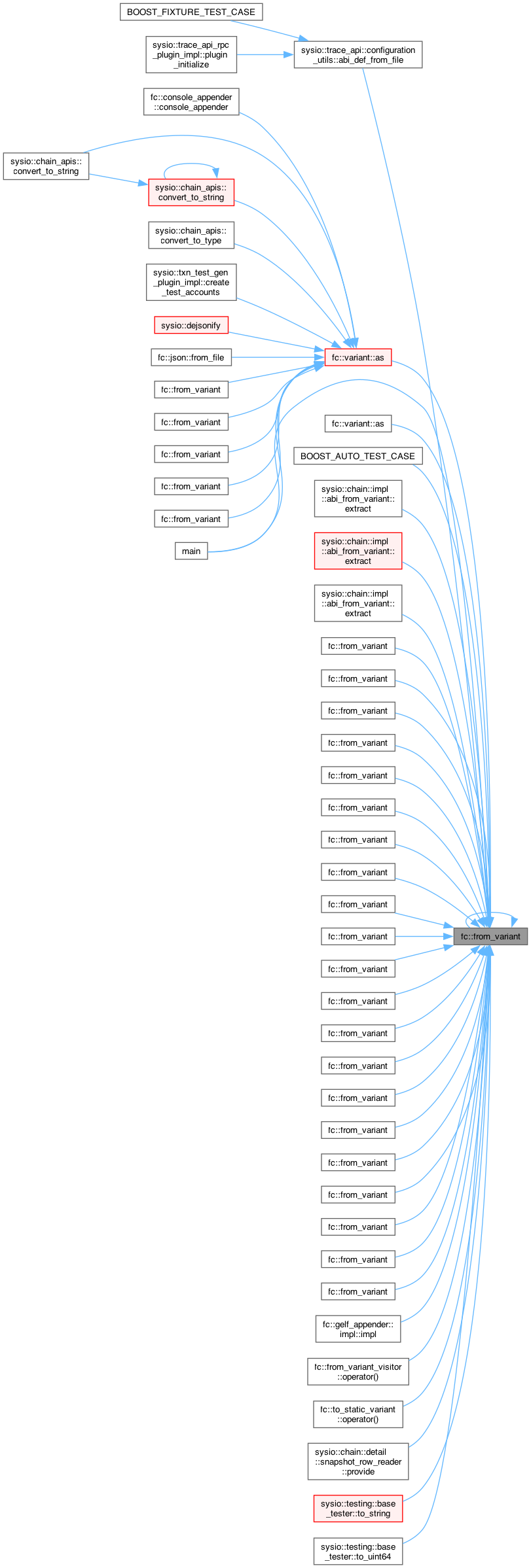
◆ from_variant() [19/103]
| void fc::from_variant | ( | const fc::variant & | v, |
| sysio::chain::may_not_exist< T > & | e ) |
◆ from_variant() [20/103]
| void fc::from_variant | ( | const fc::variant & | v, |
| sysio::chain::name & | check ) |
Definition at line 39 of file name.cpp.

◆ from_variant() [21/103]
| void fc::from_variant | ( | const fc::variant & | v, |
| UInt< 16 > & | n ) |
◆ from_variant() [22/103]
| void fc::from_variant | ( | const fc::variant & | v, |
| UInt< 32 > & | n ) |
◆ from_variant() [23/103]
| void fc::from_variant | ( | const fc::variant & | v, |
| UInt< 64 > & | n ) |
Definition at line 761 of file variant.cpp.

◆ from_variant() [24/103]
| void fc::from_variant | ( | const fc::variant & | v, |
| UInt< 8 > & | n ) |
◆ from_variant() [25/103]
| void fc::from_variant | ( | const fc::variant & | v, |
| url & | u ) |
◆ from_variant() [26/103]
| void fc::from_variant | ( | const fc::variant & | var, |
| __int128 & | vo ) |
Definition at line 683 of file variant.cpp.
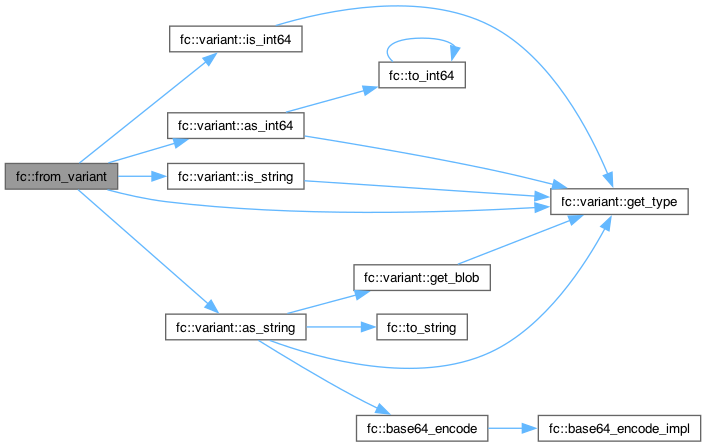
◆ from_variant() [27/103]
| void fc::from_variant | ( | const fc::variant & | var, |
| bool & | vo ) |
Definition at line 704 of file variant.cpp.

◆ from_variant() [28/103]
| void fc::from_variant | ( | const fc::variant & | var, |
| double & | vo ) |
Definition at line 709 of file variant.cpp.

◆ from_variant() [29/103]
| void fc::from_variant | ( | const fc::variant & | var, |
| fc::variant & | vo ) |
Definition at line 631 of file variant.cpp.
◆ from_variant() [30/103]
| void fc::from_variant | ( | const fc::variant & | var, |
| fc::variants & | vo ) |
◆ from_variant() [31/103]
| void fc::from_variant | ( | const fc::variant & | var, |
| float & | vo ) |
◆ from_variant() [32/103]
| void fc::from_variant | ( | const fc::variant & | var, |
| int16_t & | vo ) |
◆ from_variant() [33/103]
| void fc::from_variant | ( | const fc::variant & | var, |
| int32_t & | vo ) |
◆ from_variant() [34/103]
| void fc::from_variant | ( | const fc::variant & | var, |
| int64_t & | vo ) |
◆ from_variant() [35/103]
| void fc::from_variant | ( | const fc::variant & | var, |
| int8_t & | vo ) |
◆ from_variant() [36/103]
| void fc::from_variant | ( | const fc::variant & | var, |
| mutable_variant_object & | vo ) |
◆ from_variant() [37/103]
| void fc::from_variant | ( | const fc::variant & | var, |
| std::array< T, S > & | vo ) |
Definition at line 577 of file variant.hpp.

◆ from_variant() [38/103]
| void fc::from_variant | ( | const fc::variant & | var, |
| std::deque< T > & | vo ) |
Definition at line 507 of file variant.hpp.

◆ from_variant() [39/103]
| void fc::from_variant | ( | const fc::variant & | var, |
| std::map< K, T > & | vo ) |
Definition at line 454 of file variant.hpp.

◆ from_variant() [40/103]
| void fc::from_variant | ( | const fc::variant & | var, |
| std::multimap< K, T > & | vo ) |
Definition at line 474 of file variant.hpp.

◆ from_variant() [41/103]
| void fc::from_variant | ( | const fc::variant & | var, |
| std::set< T > & | vo ) |
Definition at line 495 of file variant.hpp.

◆ from_variant() [42/103]
| void fc::from_variant | ( | const fc::variant & | var, |
| std::shared_ptr< T > & | vo ) |
Definition at line 640 of file variant.hpp.

◆ from_variant() [43/103]
| void fc::from_variant | ( | const fc::variant & | var, |
| std::unordered_map< K, T > & | vo ) |
Definition at line 434 of file variant.hpp.

◆ from_variant() [44/103]
| void fc::from_variant | ( | const fc::variant & | var, |
| std::unordered_set< T > & | vo ) |
Definition at line 412 of file variant.hpp.

◆ from_variant() [45/103]
| void fc::from_variant | ( | const fc::variant & | var, |
| std::vector< char > & | vo ) |
Definition at line 736 of file variant.cpp.

◆ from_variant() [46/103]
| void fc::from_variant | ( | const fc::variant & | var, |
| std::vector< T > & | tmp ) |
Definition at line 554 of file variant.hpp.

◆ from_variant() [47/103]
| void fc::from_variant | ( | const fc::variant & | var, |
| string & | vo ) |
◆ from_variant() [48/103]
|
inline |
◆ from_variant() [49/103]
|
inline |
◆ from_variant() [50/103]
|
inline |
Definition at line 173 of file symbol.hpp.
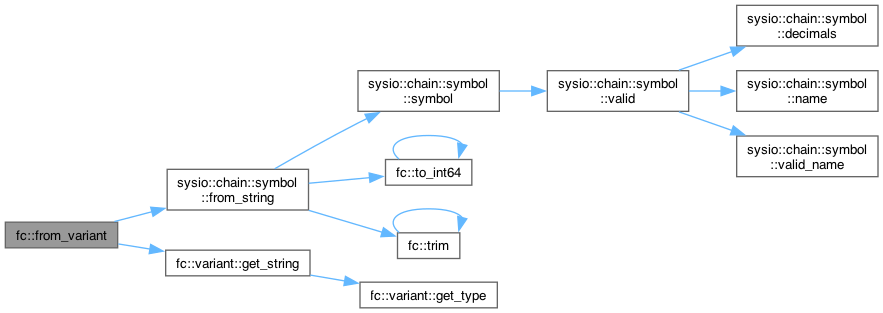
◆ from_variant() [51/103]
|
inline |
Definition at line 182 of file symbol.hpp.

◆ from_variant() [52/103]
| void fc::from_variant | ( | const fc::variant & | var, |
| fc::time_point & | t ) |
Definition at line 83 of file time.cpp.
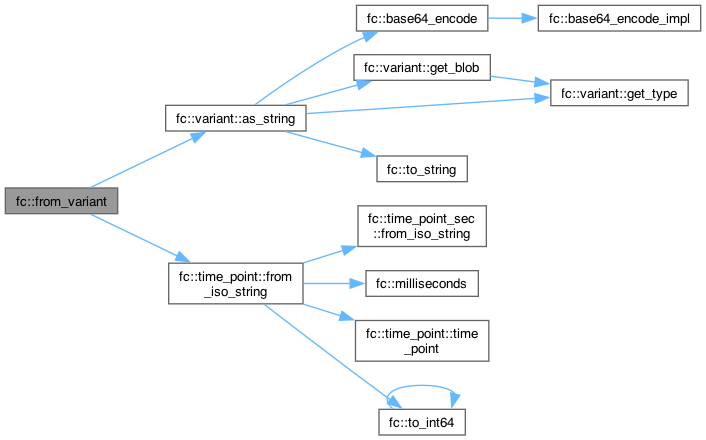
◆ from_variant() [53/103]
| void fc::from_variant | ( | const fc::variant & | var, |
| fc::time_point_sec & | t ) |
Definition at line 89 of file time.cpp.

◆ from_variant() [54/103]
| void fc::from_variant | ( | const fc::variant & | var, |
| uint16_t & | vo ) |
◆ from_variant() [55/103]
| void fc::from_variant | ( | const fc::variant & | var, |
| uint32_t & | vo ) |
◆ from_variant() [56/103]
| void fc::from_variant | ( | const fc::variant & | var, |
| uint64_t & | vo ) |
◆ from_variant() [57/103]
| void fc::from_variant | ( | const fc::variant & | var, |
| uint8_t & | vo ) |
◆ from_variant() [58/103]
| void fc::from_variant | ( | const fc::variant & | var, |
| unsigned __int128 & | vo ) |
Definition at line 668 of file variant.cpp.
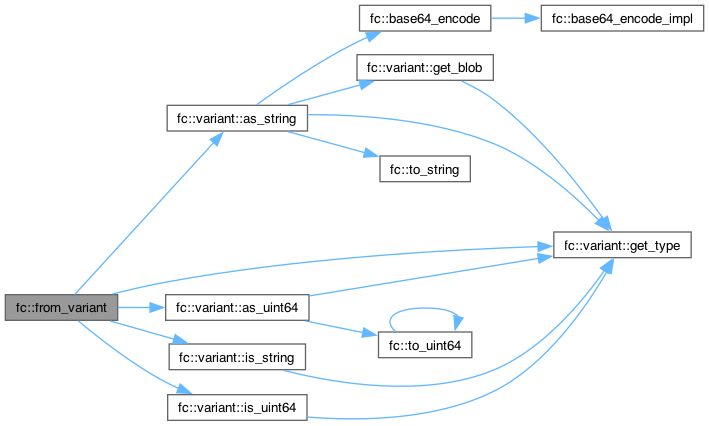
◆ from_variant() [59/103]
| void fc::from_variant | ( | const fc::variant & | var, |
| variant_object & | vo ) |
◆ from_variant() [60/103]
Definition at line 134 of file exception.cpp.
◆ from_variant() [61/103]
Definition at line 133 of file log_message.cpp.

◆ from_variant() [62/103]
| void fc::from_variant | ( | const variant & | l, |
| log_context & | c ) |
Definition at line 95 of file log_message.cpp.
◆ from_variant() [63/103]
| void fc::from_variant | ( | const variant & | l, |
| log_message & | c ) |
Definition at line 100 of file log_message.cpp.
◆ from_variant() [64/103]
◆ from_variant() [65/103]
decodes the big int as base64 string, or a number
Definition at line 218 of file bigint.cpp.
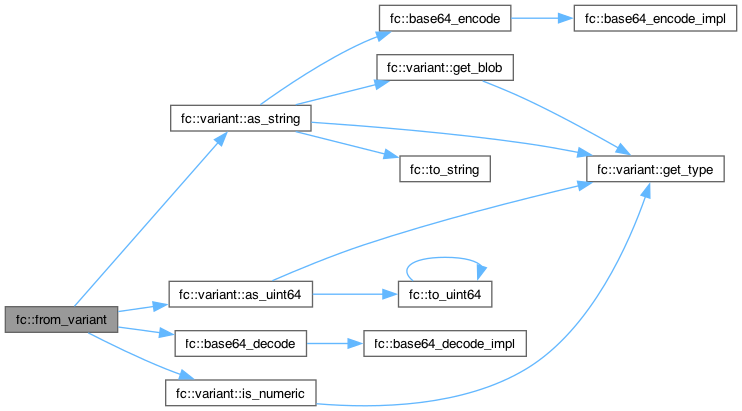
◆ from_variant() [66/103]
Definition at line 85 of file container.hpp.

◆ from_variant() [67/103]
Definition at line 95 of file container.hpp.

◆ from_variant() [68/103]
Definition at line 195 of file database_utils.hpp.

◆ from_variant() [69/103]
| void fc::from_variant | ( | const variant & | v, |
| chainbase::oid< OidType > & | oid ) |
◆ from_variant() [70/103]
| void fc::from_variant | ( | const variant & | v, |
| fixed_string< Storage > & | s ) |
◆ from_variant() [71/103]
◆ from_variant() [72/103]
◆ from_variant() [73/103]
|
inline |
Definition at line 154 of file database_utils.hpp.
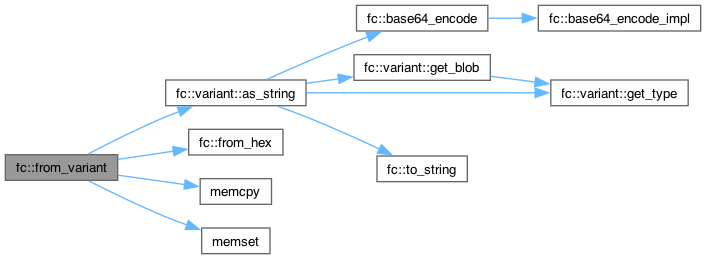
◆ from_variant() [74/103]
Definition at line 137 of file database_utils.hpp.

◆ from_variant() [75/103]
| void fc::from_variant | ( | const variant & | v, |
| private_key & | bi ) |
decodes the big int as base64 string, or a number
Definition at line 359 of file pke.cpp.

◆ from_variant() [76/103]
| void fc::from_variant | ( | const variant & | v, |
| public_key & | bi ) |
◆ from_variant() [77/103]
Definition at line 107 of file ripemd160.cpp.
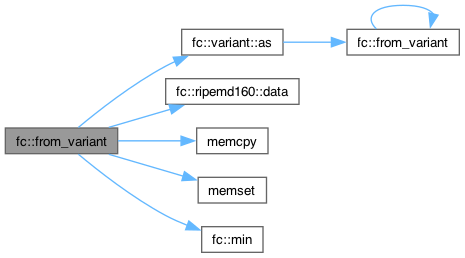
◆ from_variant() [78/103]
◆ from_variant() [79/103]
Definition at line 88 of file sha224.cpp.
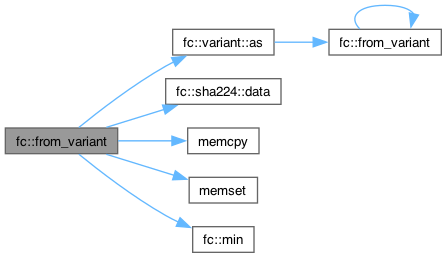
◆ from_variant() [80/103]
Definition at line 210 of file sha256.cpp.
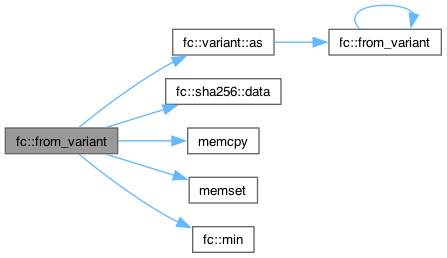
◆ from_variant() [81/103]
◆ from_variant() [82/103]
Definition at line 95 of file sha512.cpp.
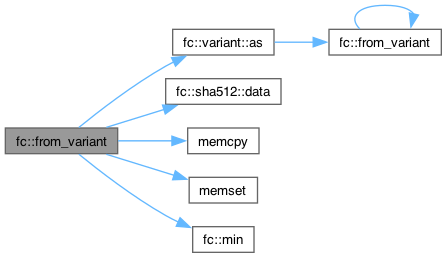
◆ from_variant() [83/103]
|
inline |
Definition at line 184 of file database_utils.hpp.
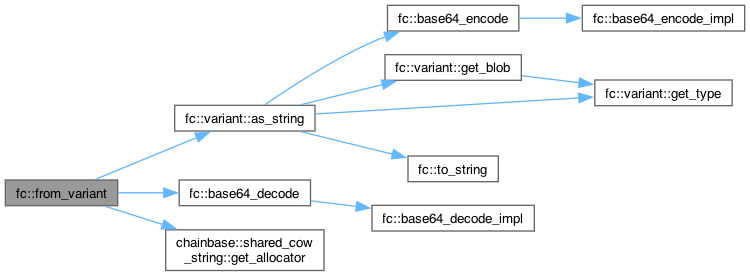
◆ from_variant() [84/103]
|
inline |
Definition at line 172 of file database_utils.hpp.

◆ from_variant() [85/103]
| void fc::from_variant | ( | const variant & | v, |
| sysio::chain::shared_vector< T > & | sv ) |
Definition at line 206 of file database_utils.hpp.

◆ from_variant() [86/103]
Definition at line 104 of file variant.hpp.

◆ from_variant() [87/103]
| void fc::from_variant | ( | const variant & | var, |
| crypto::private_key & | vo ) |
Definition at line 149 of file private_key.cpp.

◆ from_variant() [88/103]
| void fc::from_variant | ( | const variant & | var, |
| crypto::public_key & | vo ) |
Definition at line 114 of file public_key.cpp.

◆ from_variant() [89/103]
| void fc::from_variant | ( | const variant & | var, |
| crypto::r1::private_key & | vo ) |
Definition at line 625 of file elliptic_r1.cpp.
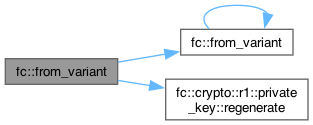
◆ from_variant() [90/103]
| void fc::from_variant | ( | const variant & | var, |
| crypto::r1::public_key & | vo ) |
Definition at line 636 of file elliptic_r1.cpp.

◆ from_variant() [91/103]
| void fc::from_variant | ( | const variant & | var, |
| crypto::signature & | vo ) |
Definition at line 93 of file signature.cpp.

◆ from_variant() [92/103]
| void fc::from_variant | ( | const variant & | var, |
| ecc::private_key & | vo ) |
Definition at line 221 of file elliptic_common.cpp.
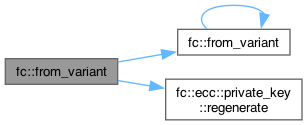
◆ from_variant() [93/103]
| void fc::from_variant | ( | const variant & | var, |
| ecc::public_key & | vo ) |
Definition at line 233 of file elliptic_common.cpp.

◆ from_variant() [94/103]
| void fc::from_variant | ( | const variant & | var, |
| em::private_key & | vo ) |
Definition at line 222 of file elliptic_em_common.cpp.
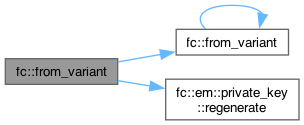
◆ from_variant() [95/103]
| void fc::from_variant | ( | const variant & | var, |
| em::public_key & | vo ) |
Definition at line 234 of file elliptic_em_common.cpp.

◆ from_variant() [96/103]
| void fc::from_variant | ( | const variant & | var, |
| enum_type< IntType, EnumType > & | vo ) |
◆ from_variant() [97/103]
| void fc::from_variant | ( | const variant & | var, |
| ip::address & | vo ) |
◆ from_variant() [98/103]
| void fc::from_variant | ( | const variant & | var, |
| ip::endpoint & | vo ) |
◆ from_variant() [99/103]
◆ from_variant() [100/103]
| void fc::from_variant | ( | const variant & | var, |
| signed_int & | vo ) |
◆ from_variant() [101/103]
Definition at line 392 of file variant.hpp.

◆ from_variant() [102/103]
◆ from_variant() [103/103]
| void fc::from_variant | ( | const variant & | var, |
| unsigned_int & | vo ) |
◆ generate_key_pair()
| void fc::generate_key_pair | ( | public_key & | pub, |
| private_key & | priv ) |
◆ get_approximate_relative_time_string() [1/2]
| string fc::get_approximate_relative_time_string | ( | const time_point & | event_time, |
| const time_point & | relative_to_time = fc::time_point::now(), | ||
| const std::string & | ago = " ago" ) |
Definition at line 154 of file time.cpp.

◆ get_approximate_relative_time_string() [2/2]
| string fc::get_approximate_relative_time_string | ( | const time_point_sec & | event_time, |
| const time_point_sec & | relative_to_time = fc::time_point::now(), | ||
| const std::string & | ago = " ago" ) |
return a human-readable approximate time, relative to now() e.g., "4 hours ago", "2 months ago", etc.
Definition at line 94 of file time.cpp.


◆ get_index()
|
constexpr |
Definition at line 33 of file static_variant.hpp.

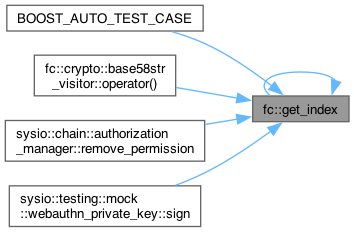
◆ get_null_url()
| std::shared_ptr< detail::url_impl > fc::get_null_url | ( | ) |
◆ get_thread_name()
| const string & fc::get_thread_name | ( | ) |
Definition at line 144 of file logger_config.cpp.


◆ Hash128to64()
◆ hash64()
| uint64_t fc::hash64 | ( | const char * | buf, |
| size_t | len ) |
◆ hash_value()
|
inline |
Definition at line 13 of file unapplied_transaction_queue.hpp.
◆ history_context_serialize_container()
| datastream< ST > & fc::history_context_serialize_container | ( | datastream< ST > & | ds, |
| const chainbase::database & | db, | ||
| const P & | context, | ||
| const std::vector< T > & | v ) |
Definition at line 70 of file serialization.hpp.
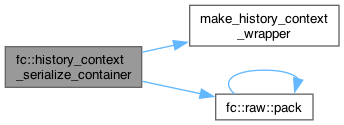
◆ history_pack_big_bytes() [1/2]
| void fc::history_pack_big_bytes | ( | datastream< ST > & | ds, |
| const std::optional< sysio::chain::bytes > & | v ) |
Definition at line 106 of file serialization.hpp.

◆ history_pack_big_bytes() [2/2]
| void fc::history_pack_big_bytes | ( | datastream< ST > & | ds, |
| const sysio::chain::bytes & | v ) |
Definition at line 99 of file serialization.hpp.


◆ history_pack_varuint64()
|
inline |
Definition at line 89 of file serialization.hpp.

◆ history_serialize_container() [1/2]
| datastream< ST > & fc::history_serialize_container | ( | datastream< ST > & | ds, |
| const chainbase::database & | db, | ||
| const std::vector< std::shared_ptr< T > > & | v ) |
Definition at line 59 of file serialization.hpp.
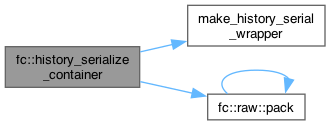
◆ history_serialize_container() [2/2]
| datastream< ST > & fc::history_serialize_container | ( | datastream< ST > & | ds, |
| const chainbase::database & | db, | ||
| const T & | v ) |
Definition at line 51 of file serialization.hpp.
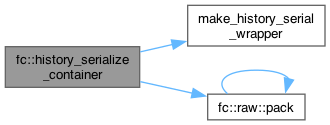
◆ home_path()
| const fc::path & fc::home_path | ( | ) |
- Returns
- the home directory on Linux and OS X and the Profile directory on Windows
Definition at line 471 of file filesystem.cpp.

◆ hours()
|
inlineconstexpr |
◆ initLibSnark()
|
noexcept |
Definition at line 17 of file alt_bn128.cpp.
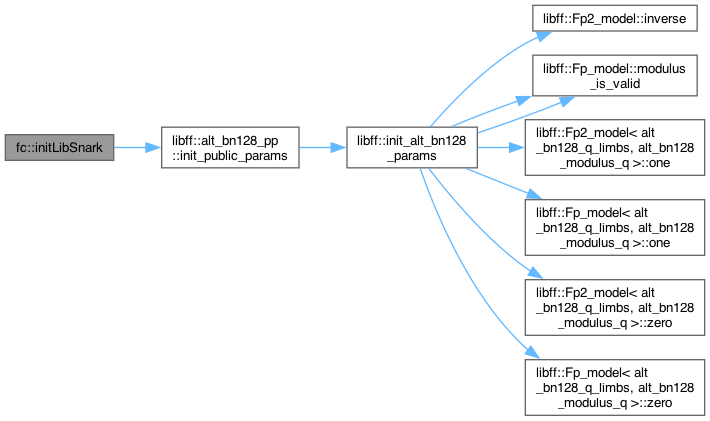
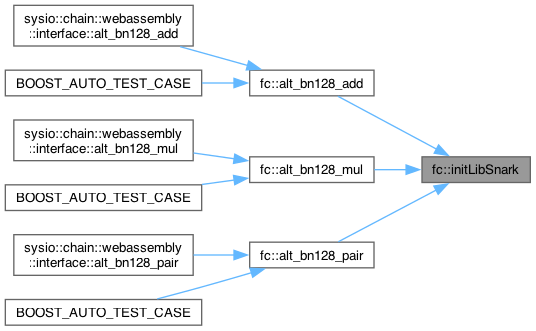
◆ is_directory()
| bool fc::is_directory | ( | const path & | p | ) |
◆ is_regular_file()
| bool fc::is_regular_file | ( | const path & | p | ) |
◆ is_utf8()
| bool fc::is_utf8 | ( | const std::string & | str | ) |
◆ is_valid_utf8()
| bool fc::is_valid_utf8 | ( | const std::string_view & | str | ) |
0x80-0x9F C1 control characters are considered invalid as well as invalid utf8 code points.
- Returns
- true if prune_invalid_utf8 should be called.
Definition at line 40 of file utf8.cpp.
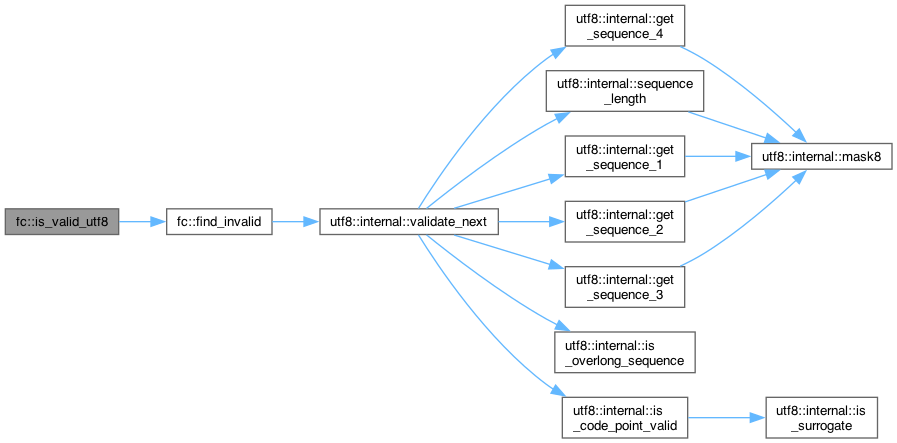
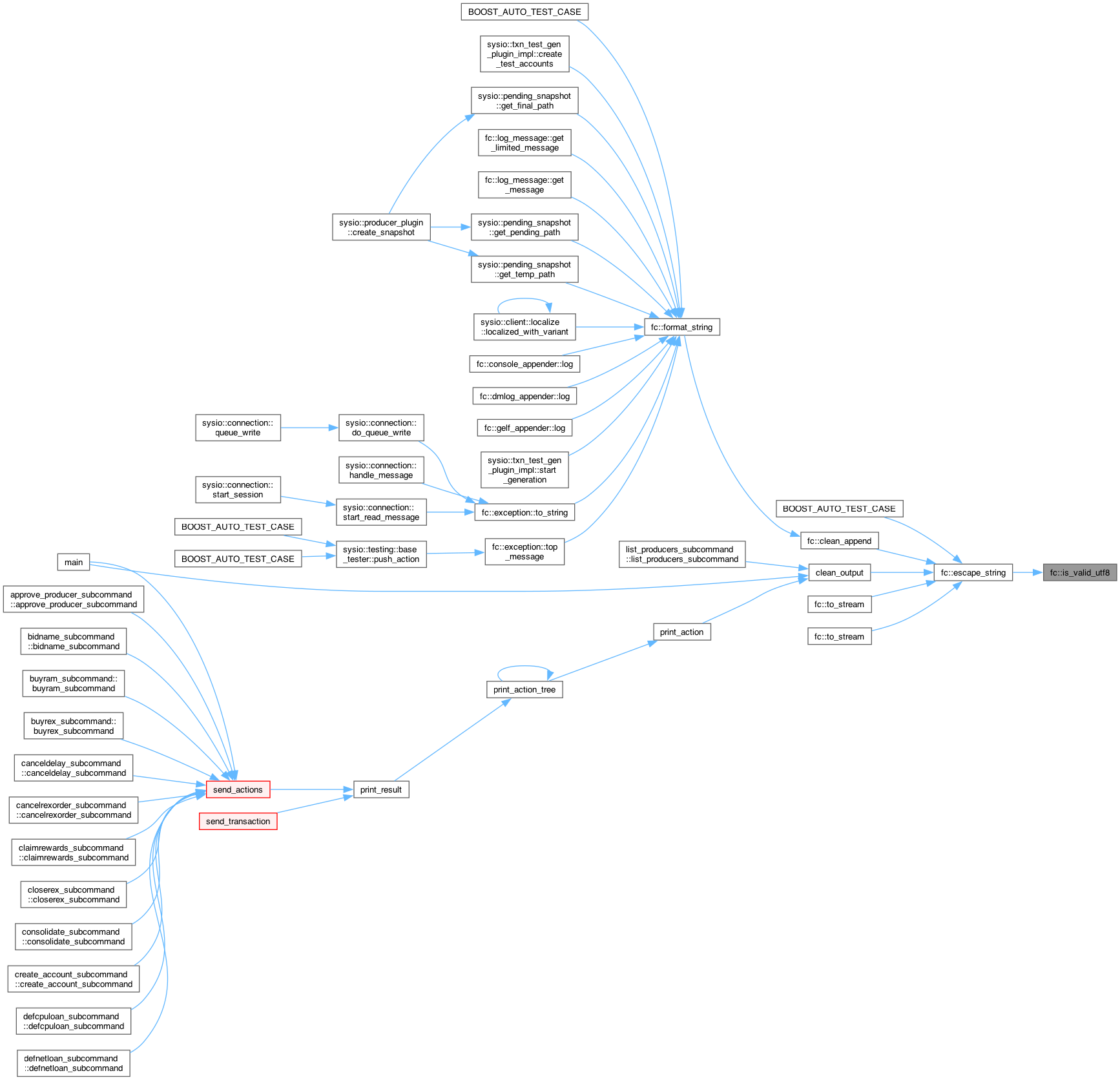
◆ k1_recover()
| std::variant< k1_recover_error, bytes > fc::k1_recover | ( | const bytes & | signature, |
| const bytes & | digest ) |
Definition at line 13 of file k1_recover.cpp.


◆ k1_recover_context()
| const secp256k1_context * fc::k1_recover_context | ( | ) |
Definition at line 8 of file k1_recover.cpp.


◆ make_fused() [1/5]
| std::function< R, fc::tuple<> > fc::make_fused | ( | const std::function< R > & | f | ) |
Definition at line 7 of file make_fused.hpp.
◆ make_fused() [2/5]
Definition at line 11 of file make_fused.hpp.
◆ make_fused() [3/5]
Definition at line 15 of file make_fused.hpp.
◆ make_fused() [4/5]
Definition at line 19 of file make_fused.hpp.
◆ make_fused() [5/5]
| std::function< R(fc::tuple< A, B, C, D >) > fc::make_fused | ( | const std::function< R(A, B, C, D)> & | f | ) |
Definition at line 23 of file make_fused.hpp.
◆ make_relative()
Definition at line 369 of file filesystem.cpp.
◆ make_scoped_exit()
| scoped_exit< Callback > fc::make_scoped_exit | ( | Callback && | c | ) |
Definition at line 35 of file scoped_exit.hpp.
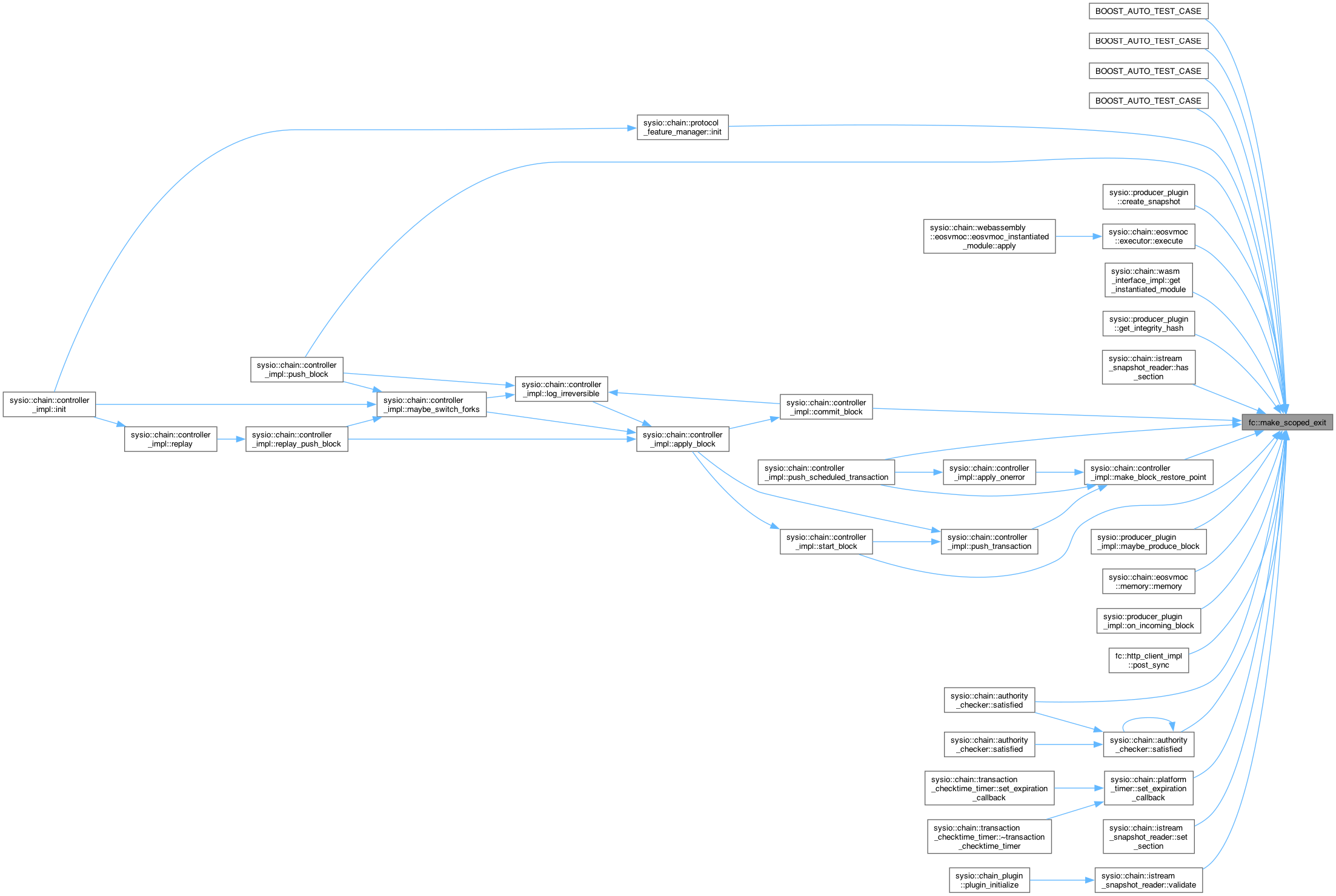
◆ make_tuple()
◆ milliseconds()
|
inlineconstexpr |
◆ min()
◆ minutes()
|
inlineconstexpr |
◆ modexp()
| std::variant< modular_arithmetic_error, bytes > fc::modexp | ( | const bytes & | _base, |
| const bytes & | _exponent, | ||
| const bytes & | _modulus ) |
Definition at line 7 of file modular_arithmetic.cpp.
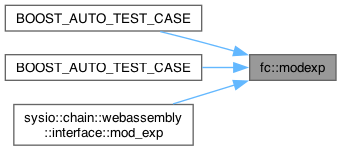
◆ move_append()
| void fc::move_append | ( | Container & | dest, |
| Container && | src ) |
Definition at line 151 of file utility.hpp.

◆ number_from_stream()
| variant fc::number_from_stream | ( | T & | in | ) |
Definition at line 253 of file json.cpp.
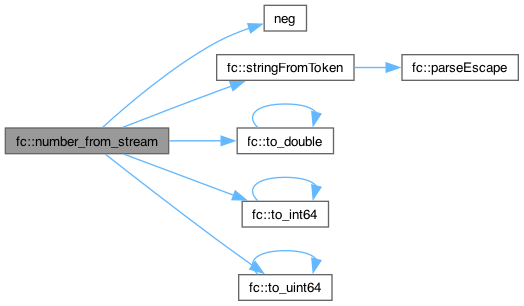
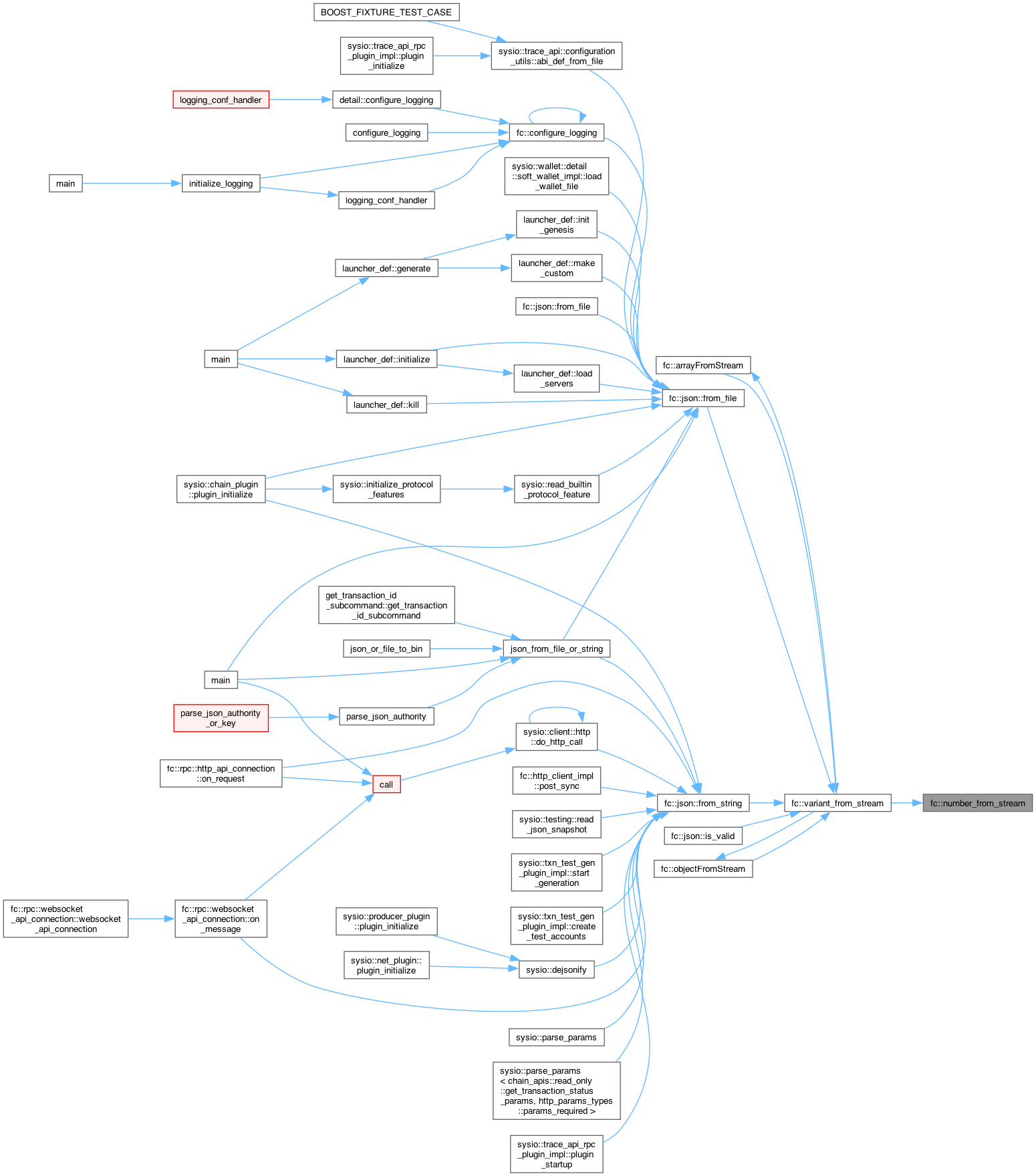
◆ objectFromStream()
| variant_object fc::objectFromStream | ( | T & | in, |
| uint32_t | max_depth ) |
Definition at line 171 of file json.cpp.
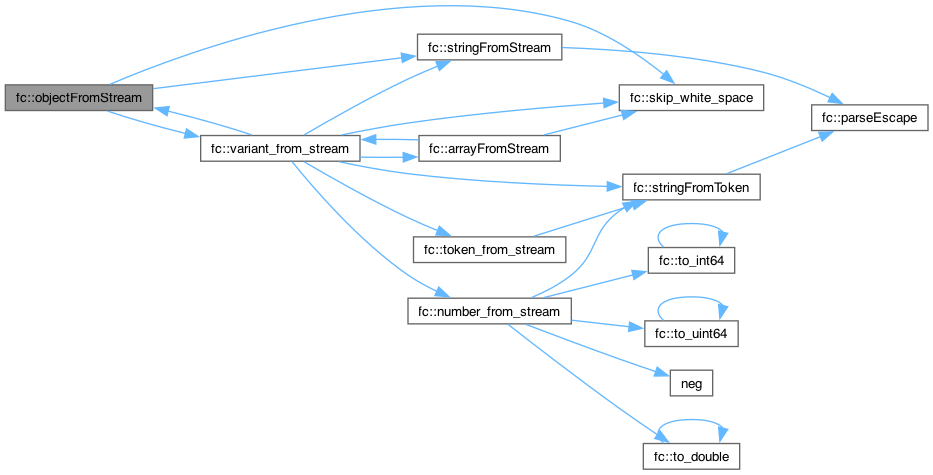
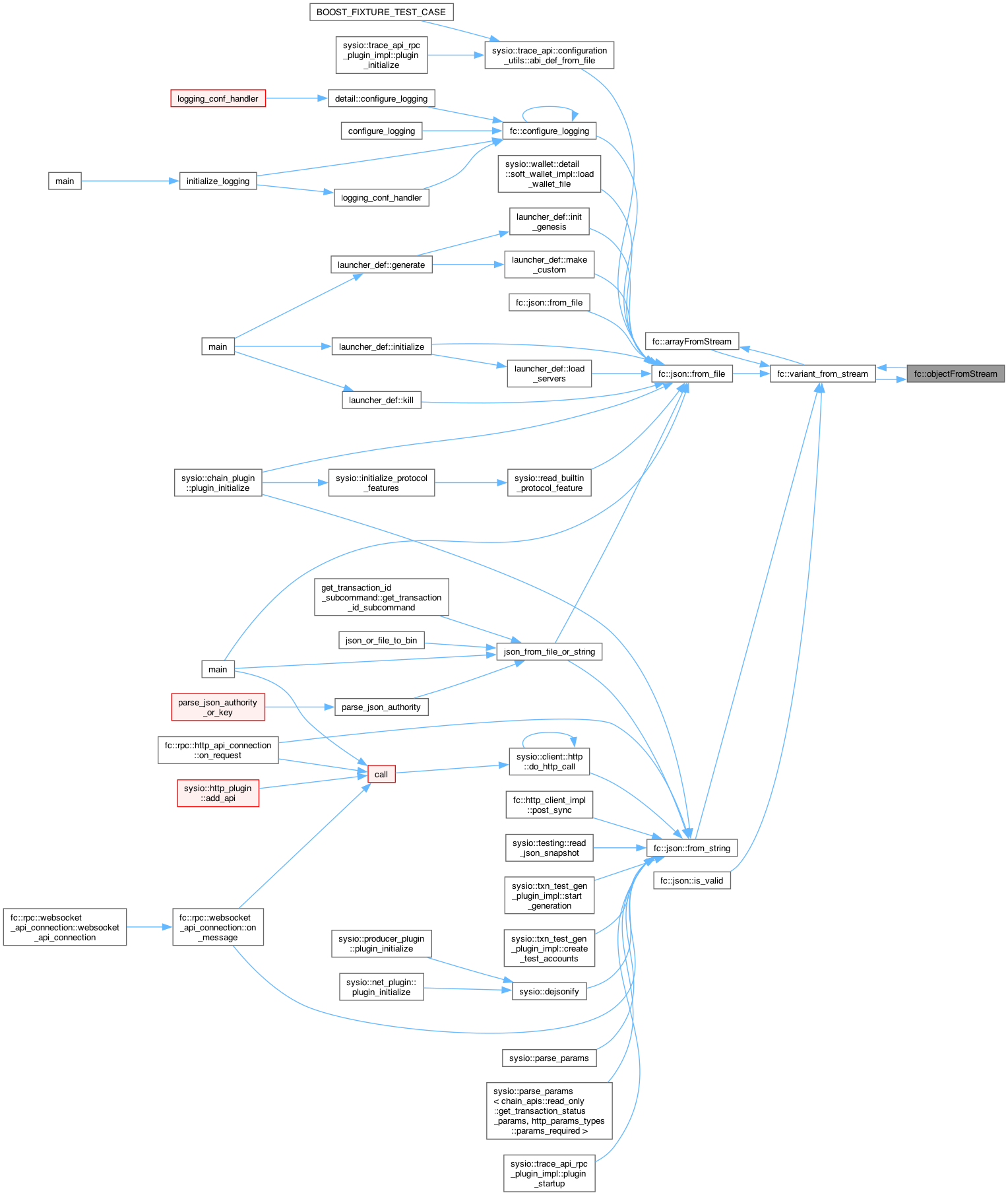
◆ operator!()
| bool fc::operator! | ( | const fc::variant & | a | ) |
Definition at line 890 of file variant.cpp.
◆ operator!=() [1/12]
| bool fc::operator!= | ( | const array< T, N > & | a, |
| const array< T, N > & | b ) |
◆ operator!=() [2/12]
| bool fc::operator!= | ( | const directory_iterator & | r, |
| const directory_iterator & | l ) |
Definition at line 191 of file filesystem.cpp.
◆ operator!=() [3/12]
| bool fc::operator!= | ( | const fc::path & | l, |
| const fc::path & | r ) |
Definition at line 83 of file filesystem.cpp.
◆ operator!=() [4/12]
| bool fc::operator!= | ( | const fc::variant & | a, |
| const fc::variant & | b ) |
Definition at line 885 of file variant.cpp.
◆ operator!=() [5/12]
| bool fc::operator!= | ( | const logger & | l, |
| std::nullptr_t | ) |
Definition at line 56 of file logger.cpp.
◆ operator!=() [6/12]
| bool fc::operator!= | ( | const recursive_directory_iterator & | r, |
| const recursive_directory_iterator & | l ) |
Definition at line 212 of file filesystem.cpp.
◆ operator!=() [7/12]
| bool fc::operator!= | ( | const ripemd160 & | h1, |
| const ripemd160 & | h2 ) |
Definition at line 96 of file ripemd160.cpp.
◆ operator!=() [8/12]
| bool fc::operator!= | ( | const sha1 & | h1, |
| const sha1 & | h2 ) |
◆ operator!=() [9/12]
| bool fc::operator!= | ( | const sha224 & | h1, |
| const sha224 & | h2 ) |
Definition at line 77 of file sha224.cpp.
◆ operator!=() [10/12]
| bool fc::operator!= | ( | const sha256 & | h1, |
| const sha256 & | h2 ) |
Definition at line 98 of file sha256.cpp.
◆ operator!=() [11/12]
| bool fc::operator!= | ( | const sha3 & | h1, |
| const sha3 & | h2 ) |
◆ operator!=() [12/12]
| bool fc::operator!= | ( | const sha512 & | h1, |
| const sha512 & | h2 ) |
Definition at line 84 of file sha512.cpp.
◆ operator&()
|
inline |
Definition at line 582 of file bloom_filter.hpp.
◆ operator*()
| variant fc::operator* | ( | const fc::variant & | a, |
| const fc::variant & | b ) |
Definition at line 976 of file variant.cpp.
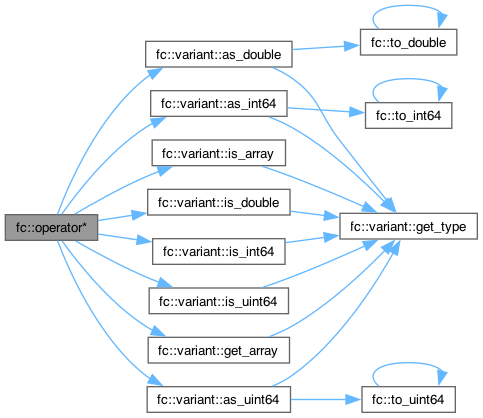
◆ operator+() [1/2]
| variant fc::operator+ | ( | const fc::variant & | a, |
| const fc::variant & | b ) |
Definition at line 923 of file variant.cpp.
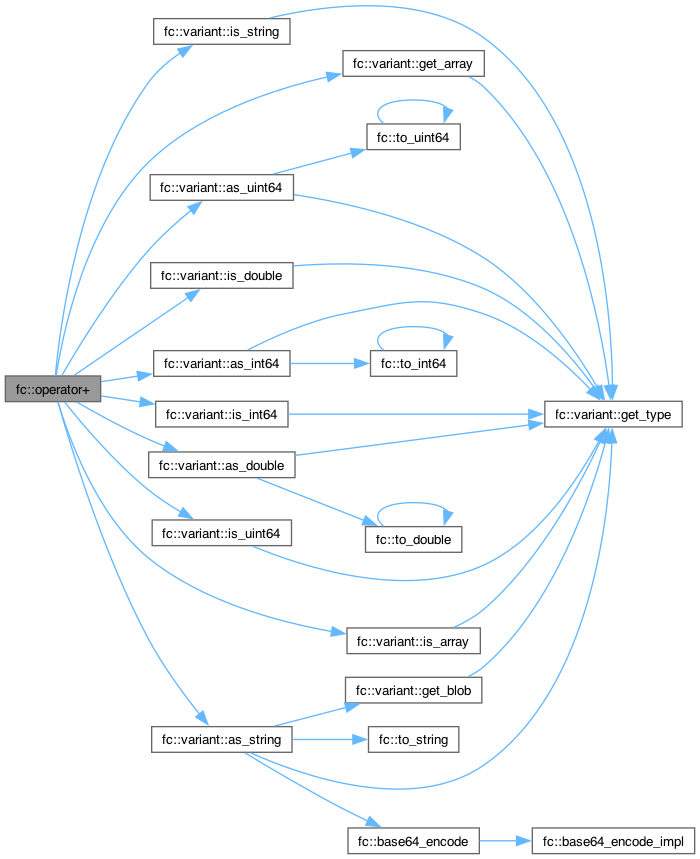
◆ operator+() [2/2]
Definition at line 42 of file fwd_impl.hpp.
◆ operator-() [1/2]
| variant fc::operator- | ( | const fc::variant & | a, |
| const fc::variant & | b ) |
Definition at line 950 of file variant.cpp.
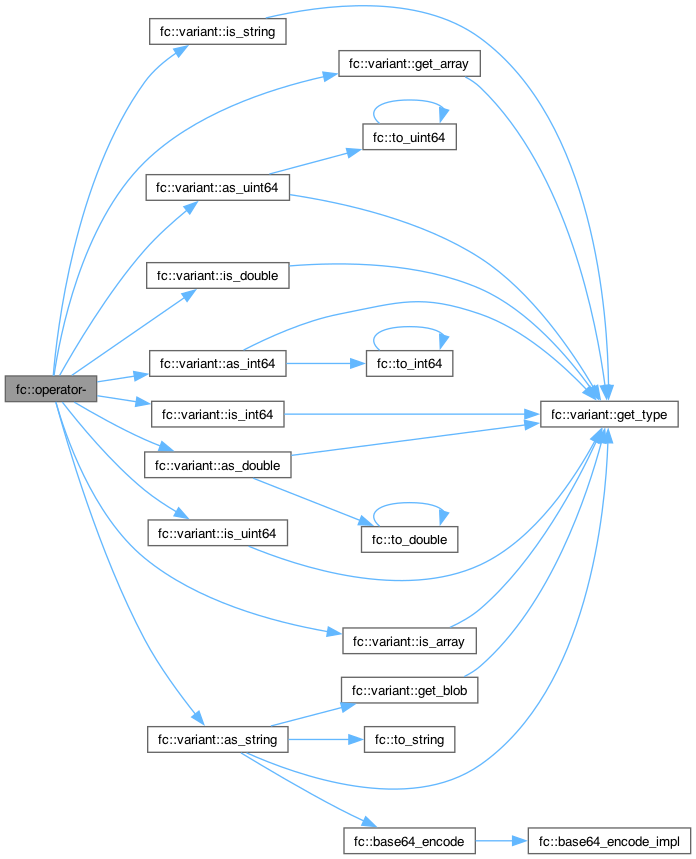
◆ operator-() [2/2]
Definition at line 45 of file fwd_impl.hpp.
◆ operator/() [1/2]
Definition at line 89 of file filesystem.cpp.
◆ operator/() [2/2]
| variant fc::operator/ | ( | const fc::variant & | a, |
| const fc::variant & | b ) |
Definition at line 1001 of file variant.cpp.
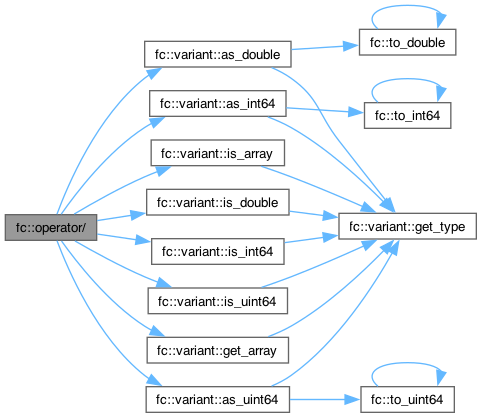
◆ operator<() [1/9]
◆ operator<() [2/9]
Definition at line 81 of file filesystem.cpp.
◆ operator<() [3/9]
| bool fc::operator< | ( | const fc::variant & | a, |
| const fc::variant & | b ) |
◆ operator<() [4/9]
Definition at line 93 of file ripemd160.cpp.
◆ operator<() [5/9]
◆ operator<() [6/9]
Definition at line 74 of file sha224.cpp.
◆ operator<() [7/9]
Definition at line 95 of file sha256.cpp.
◆ operator<() [8/9]
◆ operator<() [9/9]
Definition at line 81 of file sha512.cpp.
◆ operator<<() [1/60]
Definition at line 73 of file ripemd160.cpp.
◆ operator<<() [2/60]
Definition at line 59 of file sha1.cpp.
◆ operator<<() [3/60]
Definition at line 57 of file sha224.cpp.
◆ operator<<() [4/60]
Definition at line 71 of file sha256.cpp.
◆ operator<<() [5/60]
Definition at line 229 of file sha3.cpp.
◆ operator<<() [6/60]
Definition at line 58 of file sha512.cpp.
◆ operator<<() [7/60]
|
inline |
Definition at line 1 of file datastream.hpp.

◆ operator<<() [8/60]
| datastream< ST > & fc::operator<< | ( | datastream< ST > & | ds, |
| const history_context_wrapper< bool, sysio::chain::action_trace > & | obj ) |
Definition at line 572 of file serialization.hpp.
◆ operator<<() [9/60]
| datastream< ST > & fc::operator<< | ( | datastream< ST > & | ds, |
| const history_context_wrapper< bool, sysio::state_history::augmented_transaction_trace > & | obj ) |
Definition at line 572 of file serialization.hpp.
◆ operator<<() [10/60]
| datastream< ST > & fc::operator<< | ( | datastream< ST > & | ds, |
| const history_context_wrapper< P, std::vector< T > > & | obj ) |
Definition at line 106 of file serialization.hpp.
◆ operator<<() [11/60]
| datastream< ST > & fc::operator<< | ( | datastream< ST > & | ds, |
| const history_context_wrapper< std::pair< uint8_t, bool >, sysio::state_history::augmented_transaction_trace > & | obj ) |
Definition at line 572 of file serialization.hpp.
◆ operator<<() [12/60]
| datastream< ST > & fc::operator<< | ( | datastream< ST > & | ds, |
| const history_context_wrapper< sysio::chain::table_id_object, sysio::chain::index64_object > & | obj ) |
Definition at line 220 of file serialization.hpp.

◆ operator<<() [13/60]
| datastream< ST > & fc::operator<< | ( | datastream< ST > & | ds, |
| const history_context_wrapper< sysio::chain::table_id_object, sysio::chain::key_value_object > & | obj ) |
Definition at line 106 of file serialization.hpp.
◆ operator<<() [14/60]
| datastream< ST > & fc::operator<< | ( | datastream< ST > & | ds, |
| const history_serial_wrapper< std::pair< First, Second > > & | obj ) |
Definition at line 106 of file serialization.hpp.
◆ operator<<() [15/60]
| datastream< ST > & fc::operator<< | ( | datastream< ST > & | ds, |
| const history_serial_wrapper< std::vector< T > > & | obj ) |
Definition at line 106 of file serialization.hpp.
◆ operator<<() [16/60]
| datastream< ST > & fc::operator<< | ( | datastream< ST > & | ds, |
| const history_serial_wrapper< sysio::chain::account_delta > & | obj ) |
Definition at line 220 of file serialization.hpp.
◆ operator<<() [17/60]
| datastream< ST > & fc::operator<< | ( | datastream< ST > & | ds, |
| const history_serial_wrapper< sysio::chain::account_metadata_object > & | obj ) |
Definition at line 106 of file serialization.hpp.
◆ operator<<() [18/60]
| datastream< ST > & fc::operator<< | ( | datastream< ST > & | ds, |
| const history_serial_wrapper< sysio::chain::account_object > & | obj ) |
Definition at line 106 of file serialization.hpp.
◆ operator<<() [19/60]
| datastream< ST > & fc::operator<< | ( | datastream< ST > & | ds, |
| const history_serial_wrapper< sysio::chain::action > & | obj ) |
Definition at line 220 of file serialization.hpp.
◆ operator<<() [20/60]
| datastream< ST > & fc::operator<< | ( | datastream< ST > & | ds, |
| const history_serial_wrapper< sysio::chain::action_receipt > & | obj ) |
Definition at line 220 of file serialization.hpp.
◆ operator<<() [21/60]
| datastream< ST > & fc::operator<< | ( | datastream< ST > & | ds, |
| const history_serial_wrapper< sysio::chain::chain_config > & | obj ) |
Definition at line 220 of file serialization.hpp.
◆ operator<<() [22/60]
| datastream< ST > & fc::operator<< | ( | datastream< ST > & | ds, |
| const history_serial_wrapper< sysio::chain::code_object > & | obj ) |
Definition at line 106 of file serialization.hpp.
◆ operator<<() [23/60]
| datastream< ST > & fc::operator<< | ( | datastream< ST > & | ds, |
| const history_serial_wrapper< sysio::chain::generated_transaction_object > & | obj ) |
Definition at line 220 of file serialization.hpp.
◆ operator<<() [24/60]
| datastream< ST > & fc::operator<< | ( | datastream< ST > & | ds, |
| const history_serial_wrapper< sysio::chain::global_property_object > & | obj ) |
Definition at line 220 of file serialization.hpp.
◆ operator<<() [25/60]
| datastream< ST > & fc::operator<< | ( | datastream< ST > & | ds, |
| const history_serial_wrapper< sysio::chain::permission_level > & | obj ) |
Definition at line 220 of file serialization.hpp.
◆ operator<<() [26/60]
| datastream< ST > & fc::operator<< | ( | datastream< ST > & | ds, |
| const history_serial_wrapper< sysio::chain::permission_level_weight > & | obj ) |
Definition at line 220 of file serialization.hpp.
◆ operator<<() [27/60]
| datastream< ST > & fc::operator<< | ( | datastream< ST > & | ds, |
| const history_serial_wrapper< sysio::chain::permission_link_object > & | obj ) |
Definition at line 220 of file serialization.hpp.
◆ operator<<() [28/60]
| datastream< ST > & fc::operator<< | ( | datastream< ST > & | ds, |
| const history_serial_wrapper< sysio::chain::permission_object > & | obj ) |
Definition at line 220 of file serialization.hpp.
◆ operator<<() [29/60]
| datastream< ST > & fc::operator<< | ( | datastream< ST > & | ds, |
| const history_serial_wrapper< sysio::chain::protocol_state_object > & | obj ) |
Definition at line 220 of file serialization.hpp.
◆ operator<<() [30/60]
| datastream< ST > & fc::operator<< | ( | datastream< ST > & | ds, |
| const history_serial_wrapper< sysio::chain::protocol_state_object::activated_protocol_feature > & | obj ) |
Definition at line 220 of file serialization.hpp.
◆ operator<<() [31/60]
| datastream< ST > & fc::operator<< | ( | datastream< ST > & | ds, |
| const history_serial_wrapper< sysio::chain::resource_limits::elastic_limit_parameters > & | obj ) |
Definition at line 220 of file serialization.hpp.
◆ operator<<() [32/60]
| datastream< ST > & fc::operator<< | ( | datastream< ST > & | ds, |
| const history_serial_wrapper< sysio::chain::resource_limits::ratio > & | obj ) |
Definition at line 220 of file serialization.hpp.
◆ operator<<() [33/60]
| datastream< ST > & fc::operator<< | ( | datastream< ST > & | ds, |
| const history_serial_wrapper< sysio::chain::resource_limits::resource_limits_config_object > & | obj ) |
Definition at line 220 of file serialization.hpp.
◆ operator<<() [34/60]
| datastream< ST > & fc::operator<< | ( | datastream< ST > & | ds, |
| const history_serial_wrapper< sysio::chain::resource_limits::resource_limits_object > & | obj ) |
Definition at line 220 of file serialization.hpp.
◆ operator<<() [35/60]
| datastream< ST > & fc::operator<< | ( | datastream< ST > & | ds, |
| const history_serial_wrapper< sysio::chain::resource_limits::resource_limits_state_object > & | obj ) |
Definition at line 220 of file serialization.hpp.
◆ operator<<() [36/60]
| datastream< ST > & fc::operator<< | ( | datastream< ST > & | ds, |
| const history_serial_wrapper< sysio::chain::resource_limits::resource_usage_object > & | obj ) |
Definition at line 220 of file serialization.hpp.
◆ operator<<() [37/60]
| datastream< ST > & fc::operator<< | ( | datastream< ST > & | ds, |
| const history_serial_wrapper< sysio::chain::resource_limits::usage_accumulator > & | obj ) |
Definition at line 220 of file serialization.hpp.
◆ operator<<() [38/60]
| datastream< ST > & fc::operator<< | ( | datastream< ST > & | ds, |
| const history_serial_wrapper< sysio::chain::shared_authority > & | obj ) |
Definition at line 220 of file serialization.hpp.
◆ operator<<() [39/60]
| datastream< ST > & fc::operator<< | ( | datastream< ST > & | ds, |
| const history_serial_wrapper< sysio::chain::shared_block_signing_authority_v0 > & | obj ) |
Definition at line 220 of file serialization.hpp.
◆ operator<<() [40/60]
| datastream< ST > & fc::operator<< | ( | datastream< ST > & | ds, |
| const history_serial_wrapper< sysio::chain::shared_key_weight > & | obj ) |
Definition at line 220 of file serialization.hpp.
◆ operator<<() [41/60]
| datastream< ST > & fc::operator<< | ( | datastream< ST > & | ds, |
| const history_serial_wrapper< sysio::chain::shared_producer_authority > & | obj ) |
Definition at line 220 of file serialization.hpp.
◆ operator<<() [42/60]
| datastream< ST > & fc::operator<< | ( | datastream< ST > & | ds, |
| const history_serial_wrapper< sysio::chain::shared_producer_authority_schedule > & | obj ) |
Definition at line 220 of file serialization.hpp.
◆ operator<<() [43/60]
| datastream< ST > & fc::operator<< | ( | datastream< ST > & | ds, |
| const history_serial_wrapper< sysio::chain::table_id_object > & | obj ) |
Definition at line 106 of file serialization.hpp.
◆ operator<<() [44/60]
| datastream< ST > & fc::operator<< | ( | datastream< ST > & | ds, |
| const history_serial_wrapper< sysio::chain::wait_weight > & | obj ) |
Definition at line 220 of file serialization.hpp.
◆ operator<<() [45/60]
| datastream< ST > & fc::operator<< | ( | datastream< ST > & | ds, |
| const history_serial_wrapper< sysio::chain::wasm_config > & | obj ) |
Definition at line 220 of file serialization.hpp.
◆ operator<<() [46/60]
|
inline |
Definition at line 246 of file datastream.hpp.
◆ operator<<() [47/60]
|
inline |
Definition at line 222 of file datastream.hpp.
◆ operator<<() [48/60]
|
inline |
Definition at line 198 of file datastream.hpp.
◆ operator<<() [49/60]
|
inline |
Definition at line 270 of file datastream.hpp.
◆ operator<<() [50/60]
| datastream< ST > & fc::operator<< | ( | datastream< ST > & | ds, |
| const sysio::state_history::big_vector_wrapper< T > & | obj ) |
Definition at line 70 of file serialization.hpp.
◆ operator<<() [51/60]
| datastream< ST > & fc::operator<< | ( | datastream< ST > & | ds, |
| const sysio::state_history::get_blocks_result_v0 & | obj ) |
Definition at line 572 of file serialization.hpp.
◆ operator<<() [52/60]
|
inline |
Definition at line 258 of file datastream.hpp.
◆ operator<<() [53/60]
|
inline |
Definition at line 234 of file datastream.hpp.
◆ operator<<() [54/60]
|
inline |
Definition at line 210 of file datastream.hpp.
◆ operator<<() [55/60]
|
inline |
Definition at line 281 of file datastream.hpp.
◆ operator<<() [56/60]
|
inline |
Definition at line 186 of file datastream.hpp.
◆ operator<<() [57/60]
| datastream< ST > & fc::operator<< | ( | datastream< ST > & | s, |
| const sysio::chain::may_not_exist< T > & | v ) |
Definition at line 133 of file abi_def.hpp.
◆ operator<<() [58/60]
| std::ostream & fc::operator<< | ( | std::ostream & | os, |
| const fc::microseconds & | t ) |
Definition at line 254 of file test_common.hpp.

◆ operator<<() [59/60]
| std::ostream & fc::operator<< | ( | std::ostream & | os, |
| const std::variant< Ts... > & | v ) |
Definition at line 249 of file test_common.hpp.

◆ operator<<() [60/60]
Definition at line 48 of file fwd_impl.hpp.
◆ operator<=()
◆ operator==() [1/13]
◆ operator==() [2/13]
| bool fc::operator== | ( | const directory_iterator & | r, |
| const directory_iterator & | l ) |
Definition at line 188 of file filesystem.cpp.
◆ operator==() [3/13]
Definition at line 82 of file filesystem.cpp.
◆ operator==() [4/13]
| bool fc::operator== | ( | const fc::variant & | a, |
| const fc::variant & | b ) |
Definition at line 875 of file variant.cpp.
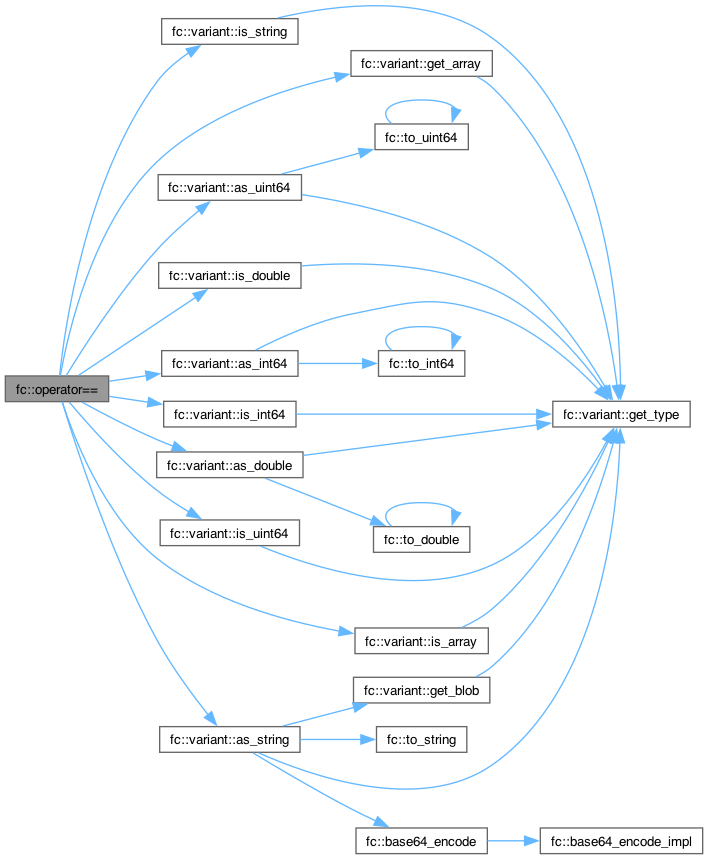
◆ operator==() [5/13]
| bool fc::operator== | ( | const logger & | l, |
| std::nullptr_t | ) |
Definition at line 55 of file logger.cpp.
◆ operator==() [6/13]
| bool fc::operator== | ( | const private_key & | a, |
| const private_key & | b ) |
◆ operator==() [7/13]
| bool fc::operator== | ( | const recursive_directory_iterator & | r, |
| const recursive_directory_iterator & | l ) |
Definition at line 209 of file filesystem.cpp.
◆ operator==() [8/13]
Definition at line 99 of file ripemd160.cpp.
◆ operator==() [9/13]
◆ operator==() [10/13]
Definition at line 80 of file sha224.cpp.
◆ operator==() [11/13]
Definition at line 101 of file sha256.cpp.
◆ operator==() [12/13]
◆ operator==() [13/13]
Definition at line 87 of file sha512.cpp.
◆ operator>() [1/8]
◆ operator>() [2/8]
| bool fc::operator> | ( | const fc::variant & | a, |
| const fc::variant & | b ) |
◆ operator>() [3/8]
Definition at line 90 of file ripemd160.cpp.
◆ operator>() [4/8]
◆ operator>() [5/8]
Definition at line 71 of file sha224.cpp.
◆ operator>() [6/8]
Definition at line 92 of file sha256.cpp.
◆ operator>() [7/8]
◆ operator>() [8/8]
Definition at line 78 of file sha512.cpp.
◆ operator>=() [1/6]
Definition at line 87 of file ripemd160.cpp.
◆ operator>=() [2/6]
◆ operator>=() [3/6]
Definition at line 68 of file sha224.cpp.
◆ operator>=() [4/6]
Definition at line 89 of file sha256.cpp.
◆ operator>=() [5/6]
◆ operator>=() [6/6]
Definition at line 75 of file sha512.cpp.
◆ operator>>() [1/14]
Definition at line 76 of file sha256.cpp.
◆ operator>>() [2/14]
◆ operator>>() [3/14]
|
inline |
Definition at line 186 of file datastream.hpp.
◆ operator>>() [4/14]
|
inline |
Definition at line 258 of file datastream.hpp.
◆ operator>>() [5/14]
|
inline |
Definition at line 234 of file datastream.hpp.
◆ operator>>() [6/14]
|
inline |
Definition at line 210 of file datastream.hpp.
◆ operator>>() [7/14]
|
inline |
Definition at line 281 of file datastream.hpp.
◆ operator>>() [8/14]
|
inline |
Definition at line 270 of file datastream.hpp.
◆ operator>>() [9/14]
|
inline |
Definition at line 246 of file datastream.hpp.
◆ operator>>() [10/14]
|
inline |
Definition at line 222 of file datastream.hpp.
◆ operator>>() [11/14]
|
inline |
Definition at line 292 of file datastream.hpp.
◆ operator>>() [12/14]
|
inline |
Definition at line 198 of file datastream.hpp.
◆ operator>>() [13/14]
| datastream< ST > & fc::operator>> | ( | datastream< ST > & | s, |
| sysio::chain::may_not_exist< T > & | v ) |
◆ operator>>() [14/14]
Definition at line 51 of file fwd_impl.hpp.
◆ operator^() [1/7]
|
inline |
Definition at line 596 of file bloom_filter.hpp.
◆ operator^() [2/7]
Definition at line 78 of file ripemd160.cpp.
◆ operator^() [3/7]
◆ operator^() [4/7]
◆ operator^() [5/7]
◆ operator^() [6/7]
◆ operator^() [7/7]
Definition at line 63 of file sha512.cpp.
◆ operator|()
|
inline |
Definition at line 589 of file bloom_filter.hpp.
◆ overloaded()
| fc::overloaded | ( | Ts... | ) | -> overloaded< Ts... > |
◆ parseEscape()
Definition at line 36 of file json.cpp.
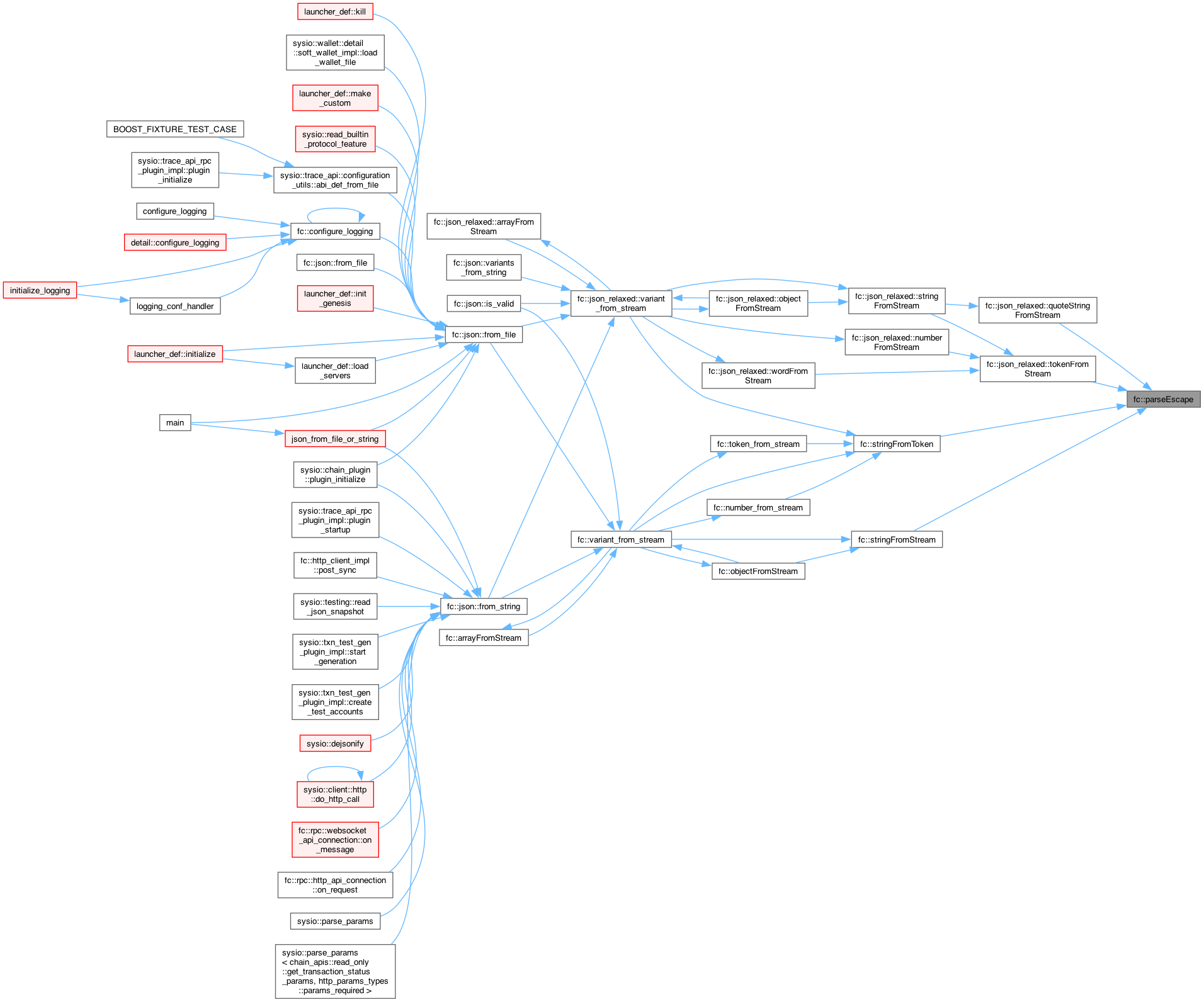
◆ pretty_print()
| std::string fc::pretty_print | ( | const std::string & | v, |
| uint8_t | indent ) |
Definition at line 682 of file json.cpp.
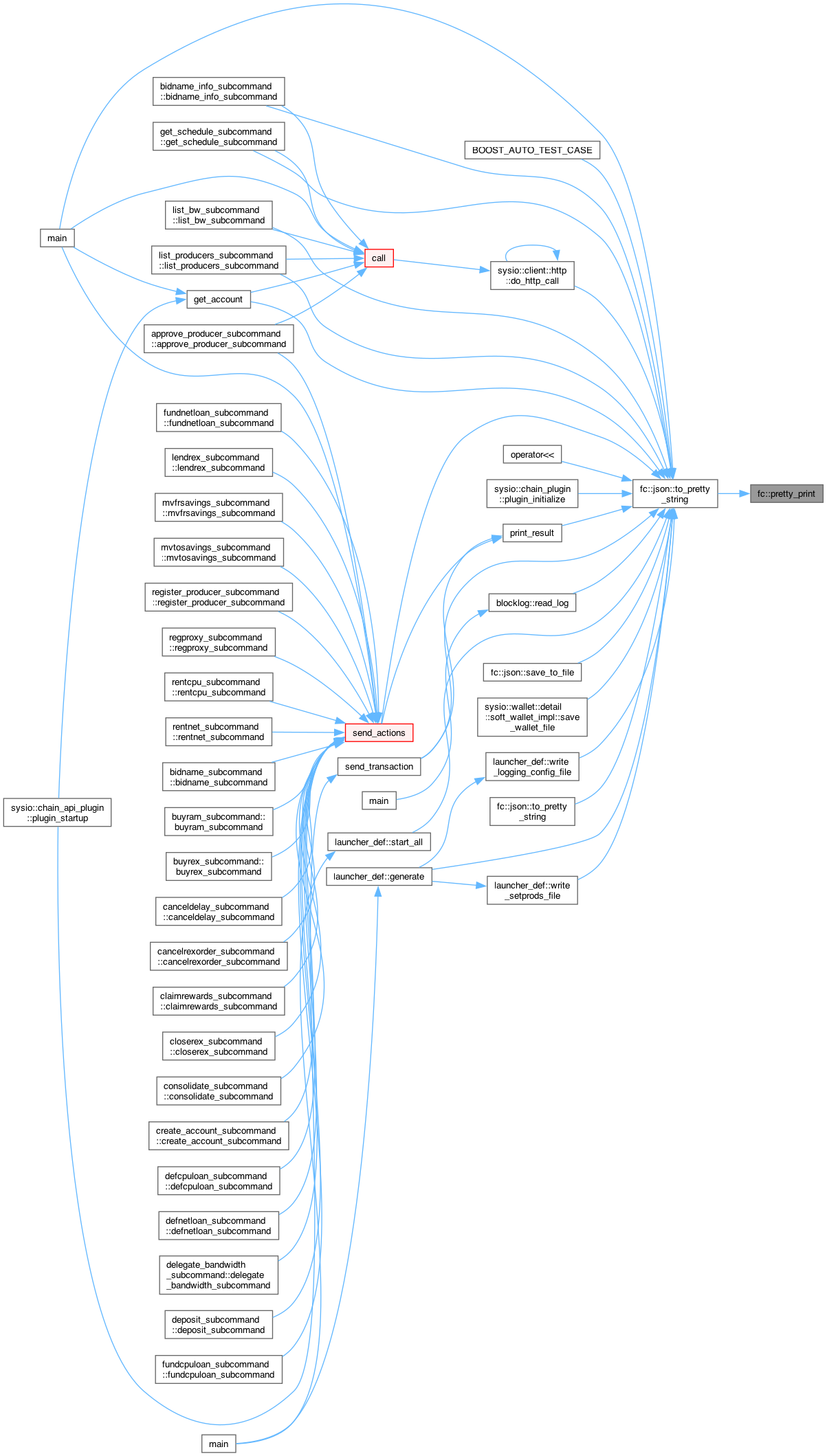
◆ prune_invalid_utf8()
| string fc::prune_invalid_utf8 | ( | const std::string_view & | str | ) |
Invalid utf8 code points are purned, 0x80-0x9F C1 control characters are escaped
Definition at line 47 of file utf8.cpp.
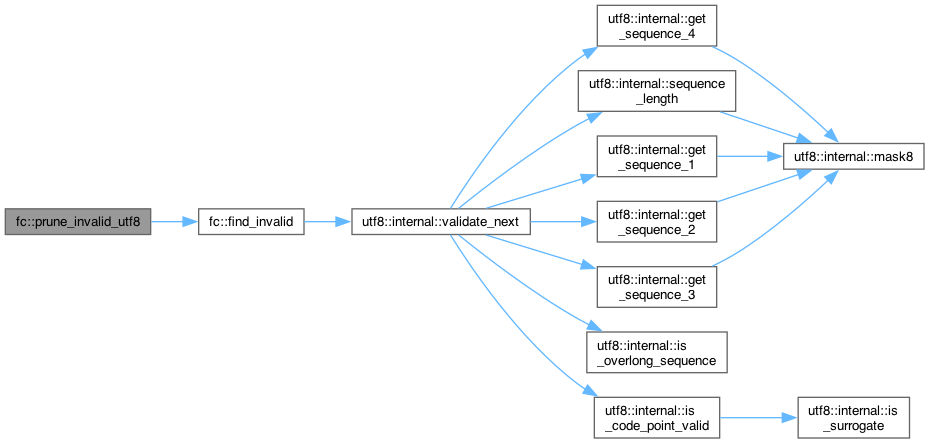
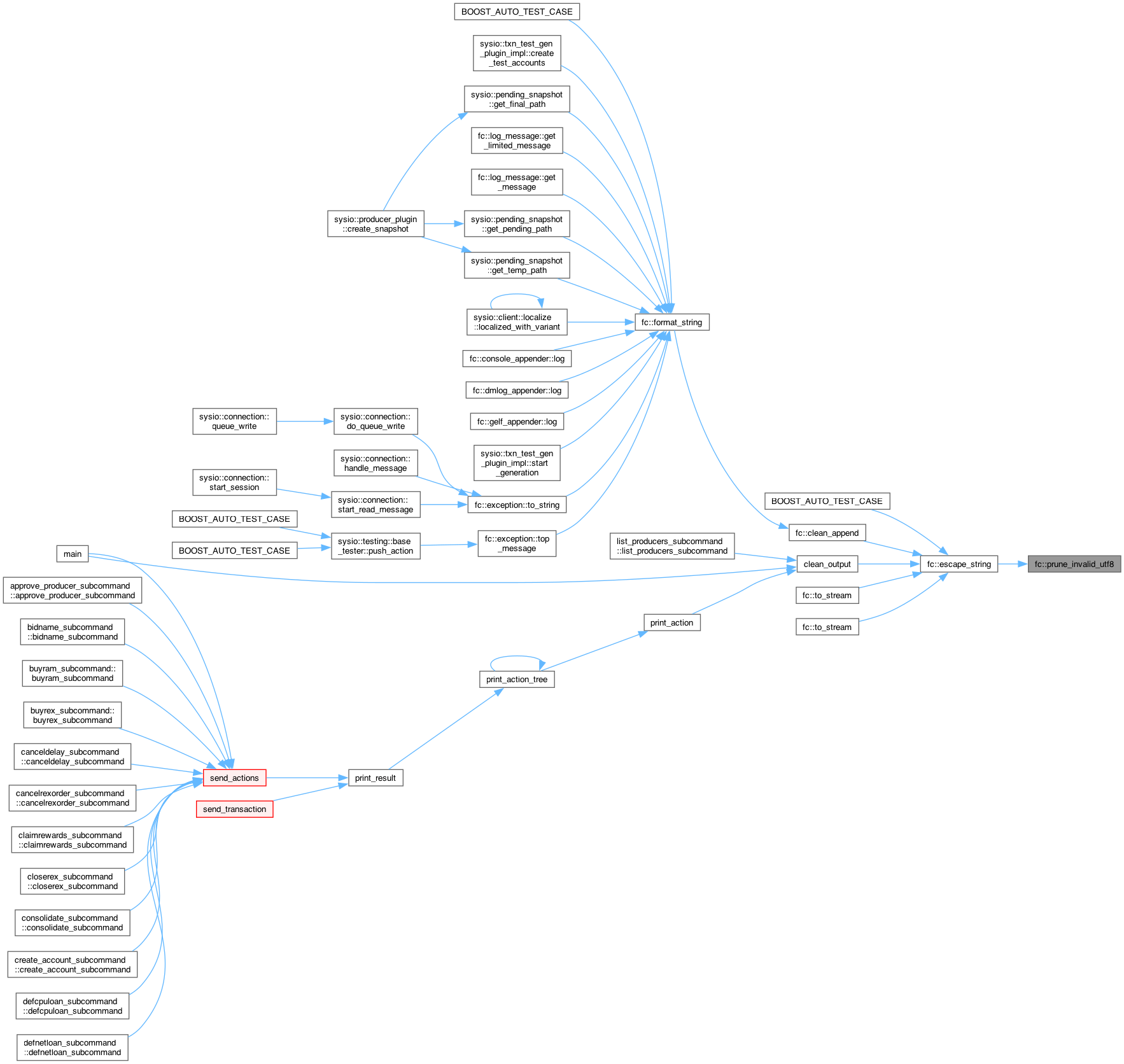
◆ rand_bytes()
| void fc::rand_bytes | ( | char * | buf, |
| int | count ) |
◆ rand_pseudo_bytes()
| void fc::rand_pseudo_bytes | ( | char * | buf, |
| int | count ) |
◆ read_file_contents()
| void fc::read_file_contents | ( | const fc::path & | filename, |
| std::string & | result ) |
Grab the full contents of a file into a string object. NB reading a full file into memory is a poor choice if the file may be very large.
Definition at line 14 of file fstream.cpp.

◆ record_assert_trip()
| void fc::record_assert_trip | ( | const char * | filename, |
| uint32_t | lineno, | ||
| const char * | expr ) |
Definition at line 305 of file exception.cpp.
◆ remove()
| bool fc::remove | ( | const path & | p | ) |
Definition at line 350 of file filesystem.cpp.

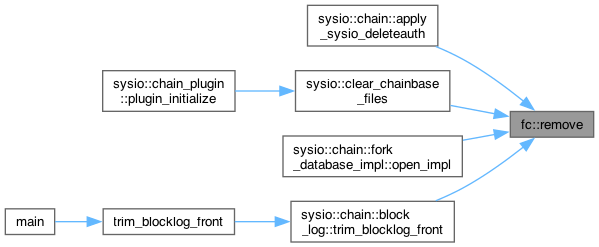
◆ remove_all()
| void fc::remove_all | ( | const path & | p | ) |
Definition at line 248 of file filesystem.cpp.
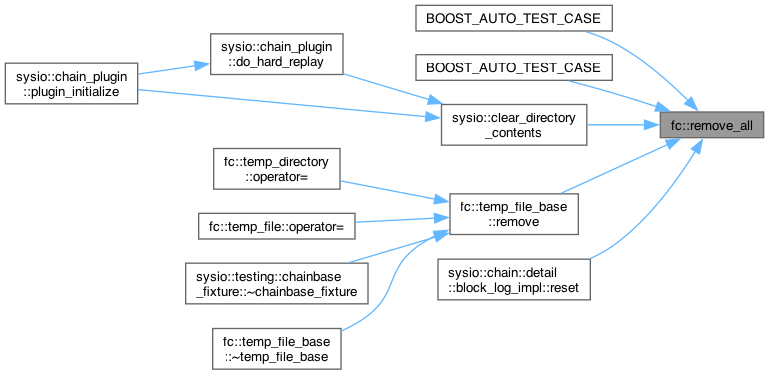
◆ rename()
Definition at line 326 of file filesystem.cpp.


◆ resize_file()
| void fc::resize_file | ( | const path & | file, |
| size_t | s ) |
Definition at line 282 of file filesystem.cpp.


◆ resolve()
| std::vector< boost::asio::ip::udp::endpoint > fc::resolve | ( | boost::asio::io_service & | io_service, |
| const std::string & | host, | ||
| uint16_t | port ) |
Definition at line 6 of file resolve.cpp.

◆ seconds()
|
inlineconstexpr |
◆ serialize_secondary_index()
| datastream< ST > & fc::serialize_secondary_index | ( | datastream< ST > & | ds, |
| const sysio::chain::table_id_object & | context, | ||
| const T & | obj ) |
Definition at line 220 of file serialization.hpp.
◆ serialize_secondary_index_data() [1/4]
| void fc::serialize_secondary_index_data | ( | datastream< ST > & | ds, |
| const float128_t & | obj ) |
◆ serialize_secondary_index_data() [2/4]
| void fc::serialize_secondary_index_data | ( | datastream< ST > & | ds, |
| const float64_t & | obj ) |
◆ serialize_secondary_index_data() [3/4]
| void fc::serialize_secondary_index_data | ( | datastream< ST > & | ds, |
| const sysio::chain::key256_t & | obj ) |
Definition at line 209 of file serialization.hpp.

◆ serialize_secondary_index_data() [4/4]
| void fc::serialize_secondary_index_data | ( | datastream< ST > & | ds, |
| const T & | obj ) |
Definition at line 190 of file serialization.hpp.


◆ set_console_echo()
| void fc::set_console_echo | ( | bool | enable_echo | ) |
enables / disables echoing of console input, useful for entering passwords on the console.
Definition at line 28 of file console.cpp.

◆ set_os_thread_name()
| void fc::set_os_thread_name | ( | const string & | name | ) |
Definition at line 136 of file logger_config.cpp.
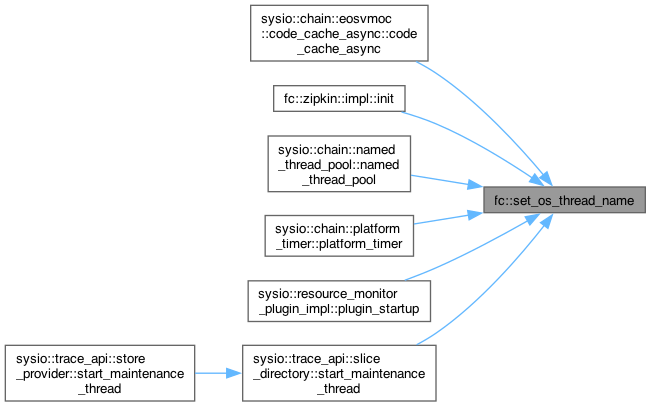
◆ set_thread_name()
| void fc::set_thread_name | ( | const string & | name | ) |
Definition at line 141 of file logger_config.cpp.
◆ set_variant_type()
| void fc::set_variant_type | ( | variant * | v, |
| variant::type_id | t ) |
The TypeID is stored in the 'last byte' of the variant.
Definition at line 18 of file variant.cpp.
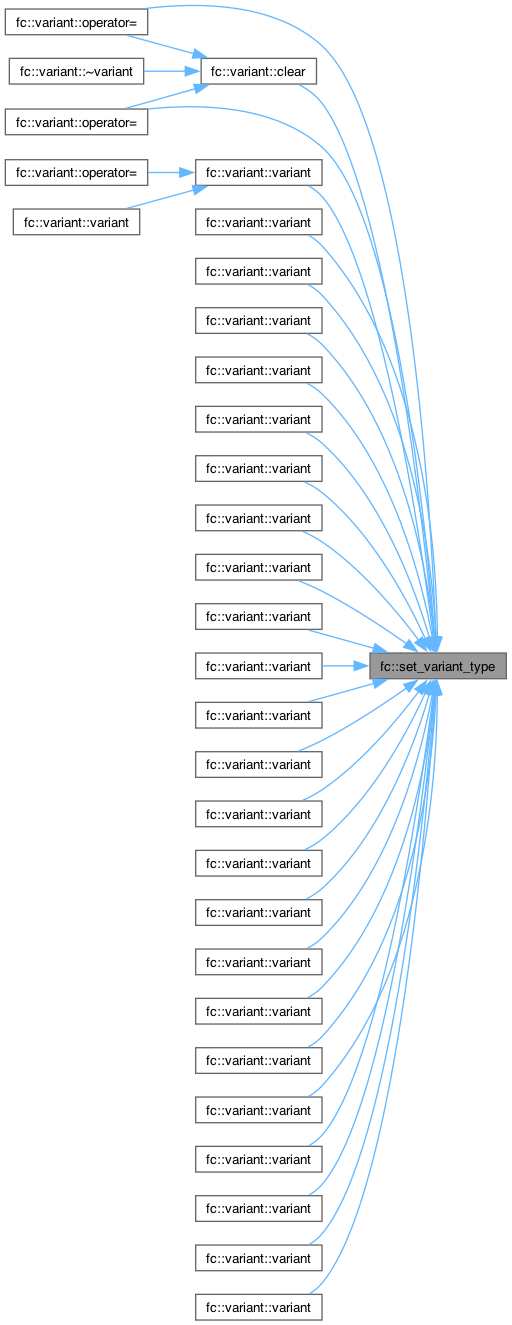
◆ skip_white_space()
Definition at line 65 of file json.cpp.
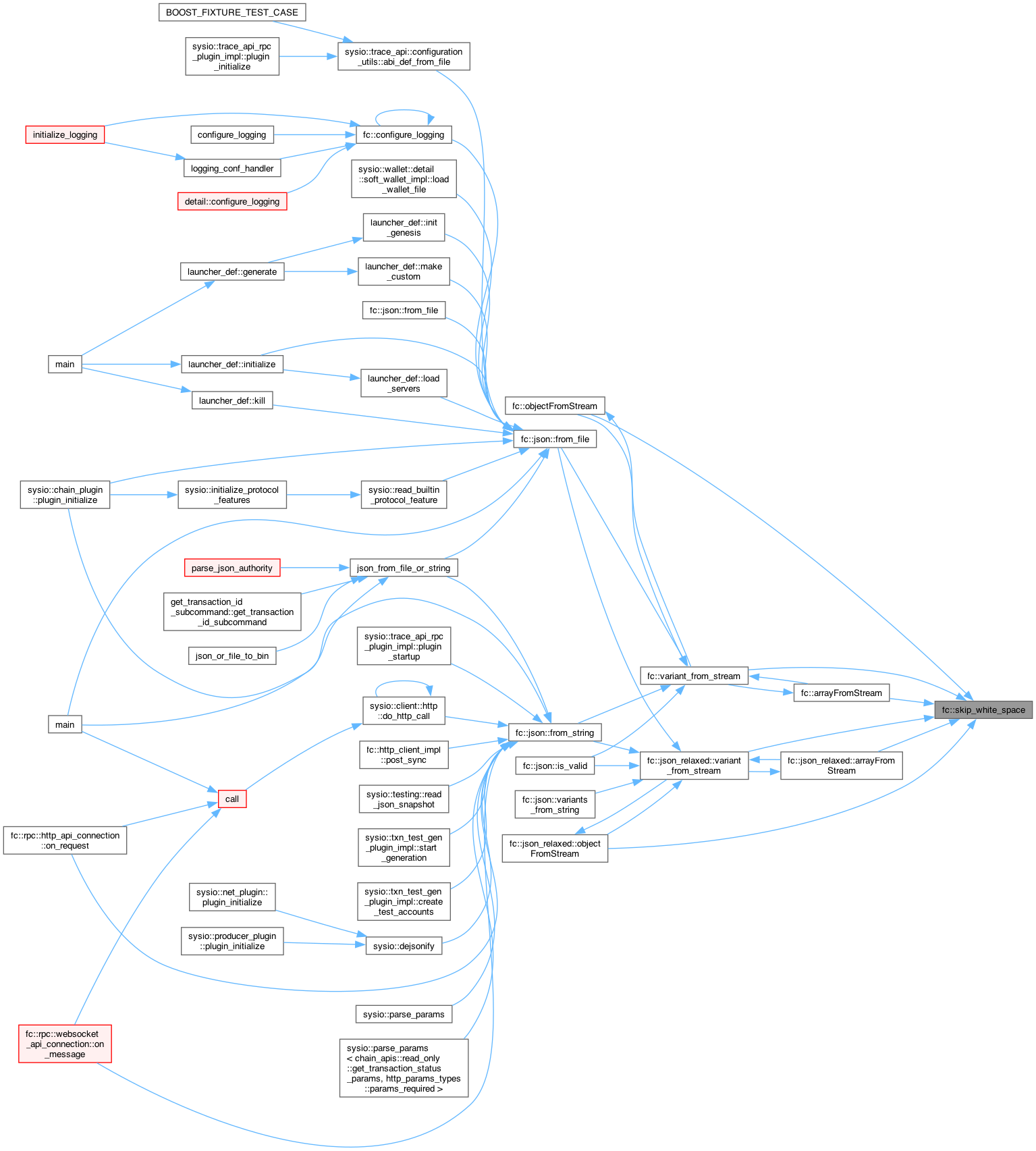
◆ smaz_compress() [1/2]
| uint32_t fc::smaz_compress | ( | const char * | in, |
| int | inlen, | ||
| char * | out, | ||
| int | outlen ) |
Definition at line 85 of file smaz.cpp.

◆ smaz_compress() [2/2]
| std::string fc::smaz_compress | ( | const std::string & | in | ) |
◆ smaz_decompress() [1/2]
| void fc::smaz_decompress | ( | const char * | in, |
| uint32_t | inlen, | ||
| std::stringstream & | ss ) |
Definition at line 163 of file smaz.cpp.
◆ smaz_decompress() [2/2]
| std::string fc::smaz_decompress | ( | const std::string & | compressed | ) |
Definition at line 216 of file smaz.cpp.


◆ stringFromStream()
Definition at line 89 of file json.cpp.

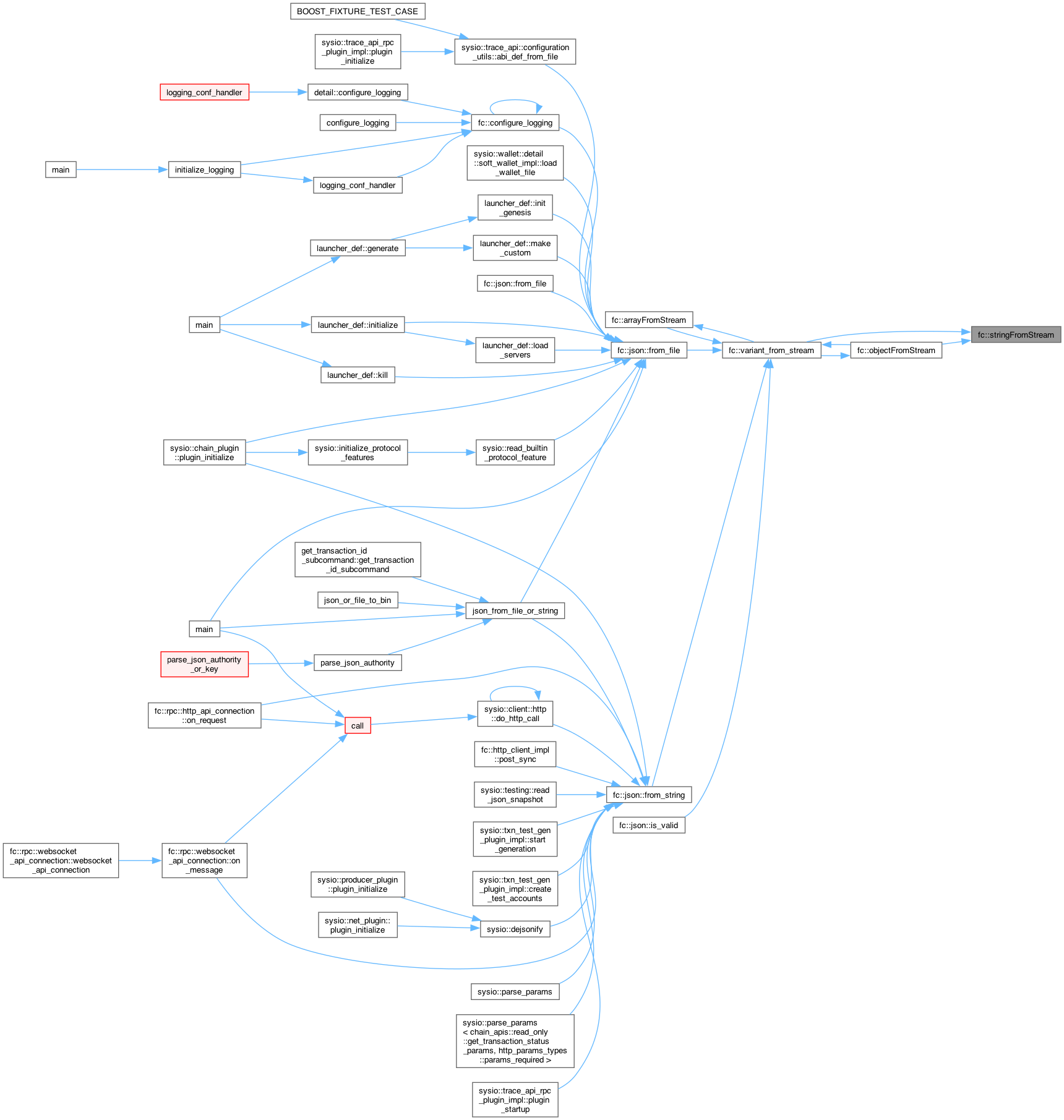
◆ stringFromToken()
Definition at line 125 of file json.cpp.

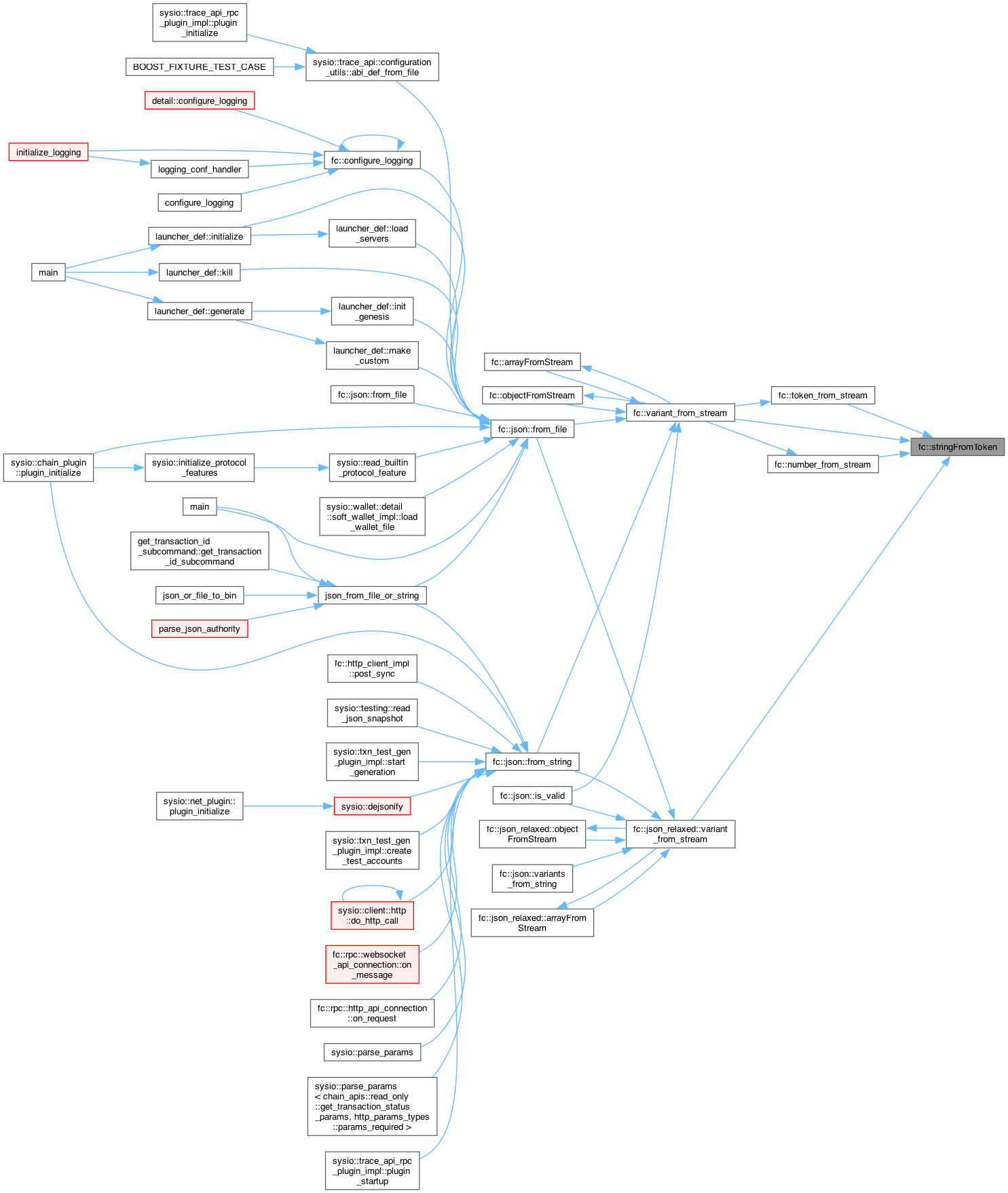
◆ temp_directory_path()
| path fc::temp_directory_path | ( | ) |
Definition at line 366 of file filesystem.cpp.
◆ throw_bad_enum_cast() [1/2]
| void fc::throw_bad_enum_cast | ( | const char * | k, |
| const char * | e ) |
Definition at line 280 of file exception.cpp.
◆ throw_bad_enum_cast() [2/2]
| void fc::throw_bad_enum_cast | ( | int64_t | i, |
| const char * | e ) |
Definition at line 274 of file exception.cpp.
◆ to_base32() [1/2]
| std::string fc::to_base32 | ( | const char * | data, |
| size_t | len ) |
◆ to_base32() [2/2]
| std::string fc::to_base32 | ( | const std::vector< char > & | vec | ) |
Definition at line 25 of file base32.cpp.


◆ to_base36() [1/2]
| fc::string fc::to_base36 | ( | const char * | data, |
| size_t | len ) |
Definition at line 8 of file base36.cpp.
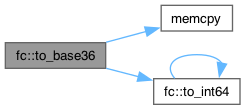
◆ to_base36() [2/2]
| fc::string fc::to_base36 | ( | const std::vector< char > & | vec | ) |
Definition at line 40 of file base36.cpp.


◆ to_base58() [1/2]
| std::string fc::to_base58 | ( | const char * | d, |
| size_t | s, | ||
| const fc::yield_function_t & | yield ) |
Definition at line 618 of file base58.cpp.

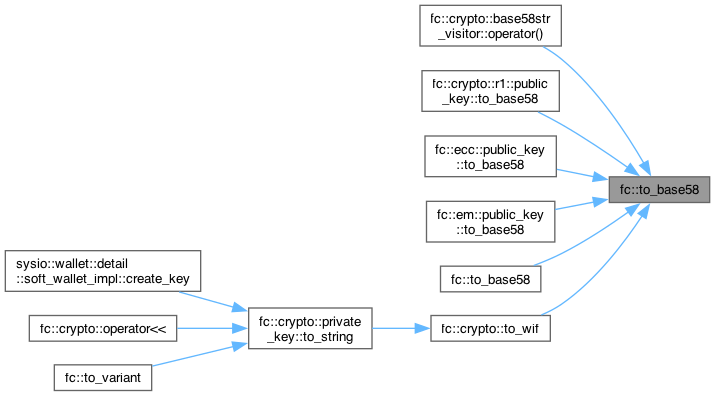
◆ to_base58() [2/2]
| std::string fc::to_base58 | ( | const std::vector< char > & | data, |
| const fc::yield_function_t & | yield ) |
Definition at line 622 of file base58.cpp.

◆ to_double()
| double fc::to_double | ( | const fc::string & | i | ) |
Definition at line 118 of file string.cpp.

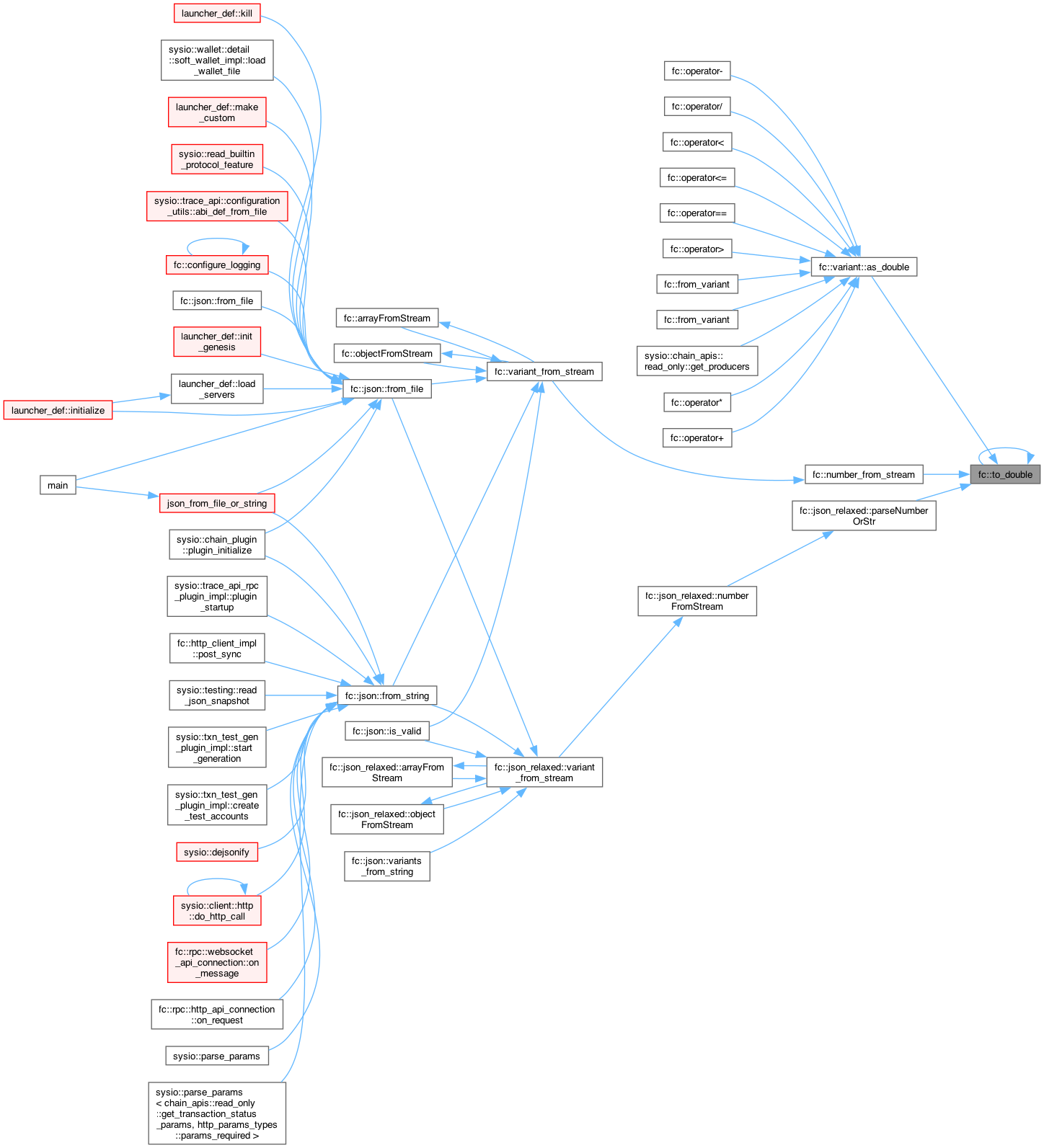
◆ to_hex() [1/2]
| std::string fc::to_hex | ( | const char * | d, |
| uint32_t | s ) |
◆ to_hex() [2/2]
| std::string fc::to_hex | ( | const std::vector< char > & | data | ) |
◆ to_int64()
| int64_t fc::to_int64 | ( | const fc::string & | i | ) |
Definition at line 92 of file string.cpp.

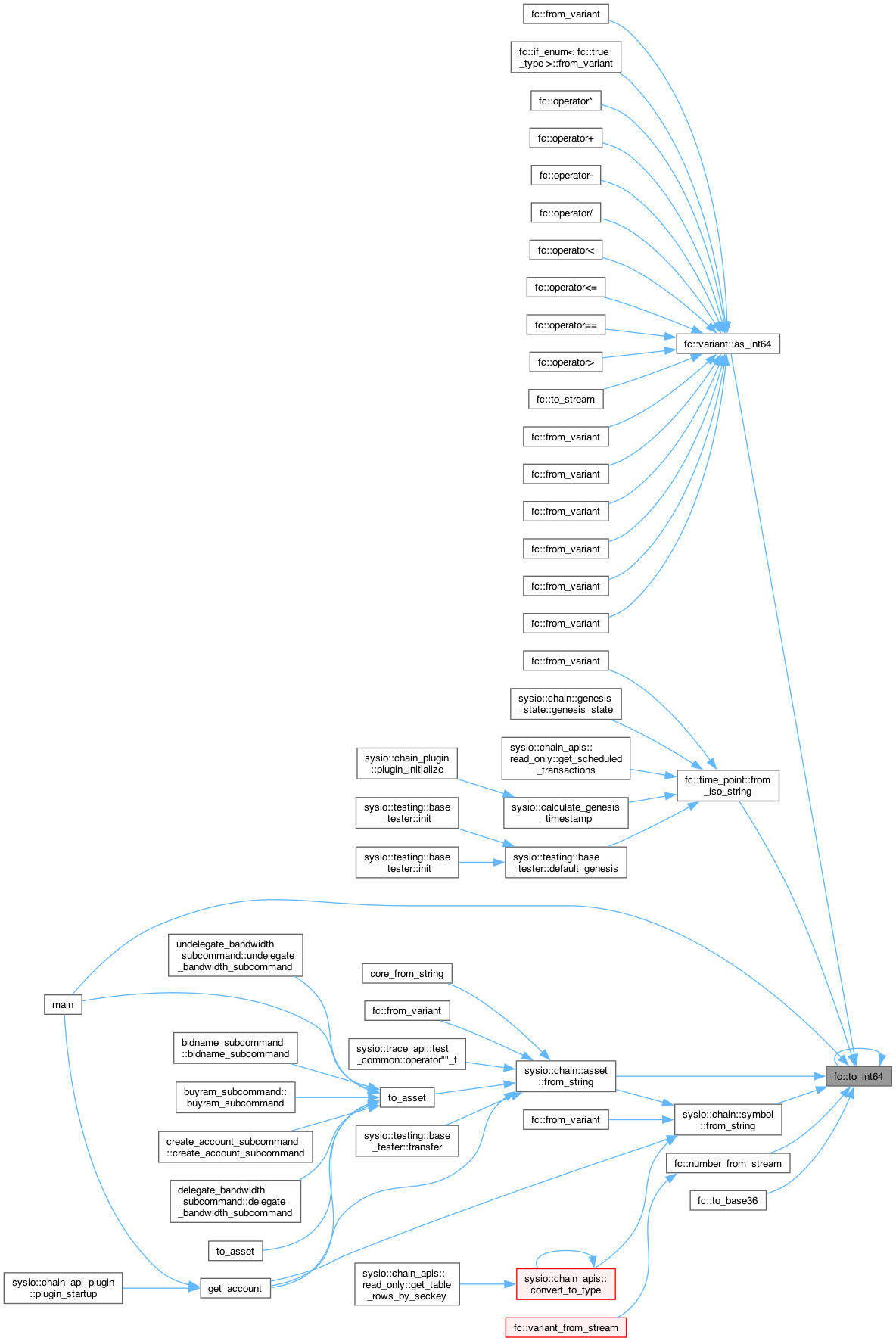
◆ to_lower()
| std::string fc::to_lower | ( | const fc::string & | s | ) |
Definition at line 161 of file string.cpp.


◆ to_pretty_string()
| std::string fc::to_pretty_string | ( | int64_t | value | ) |
Definition at line 26 of file string.cpp.
◆ to_scalar()
Definition at line 27 of file alt_bn128.cpp.

◆ to_seekable()
| device_adaptor< STREAM, bio::source_tag > fc::to_seekable | ( | STREAM & | strm | ) |
Definition at line 29 of file bio_device_adaptor.hpp.
◆ to_sink()
| device_adaptor< STREAM, bio::sink_tag > fc::to_sink | ( | STREAM & | strm | ) |
Definition at line 19 of file bio_device_adaptor.hpp.
◆ to_source()
| device_adaptor< STREAM, bio::source_tag > fc::to_source | ( | STREAM & | strm | ) |
Definition at line 24 of file bio_device_adaptor.hpp.
◆ to_stream() [1/3]
| void fc::to_stream | ( | T & | os, |
| const variant & | v, | ||
| const json::yield_function_t & | yield, | ||
| json::output_formatting | format ) |
Definition at line 612 of file json.cpp.
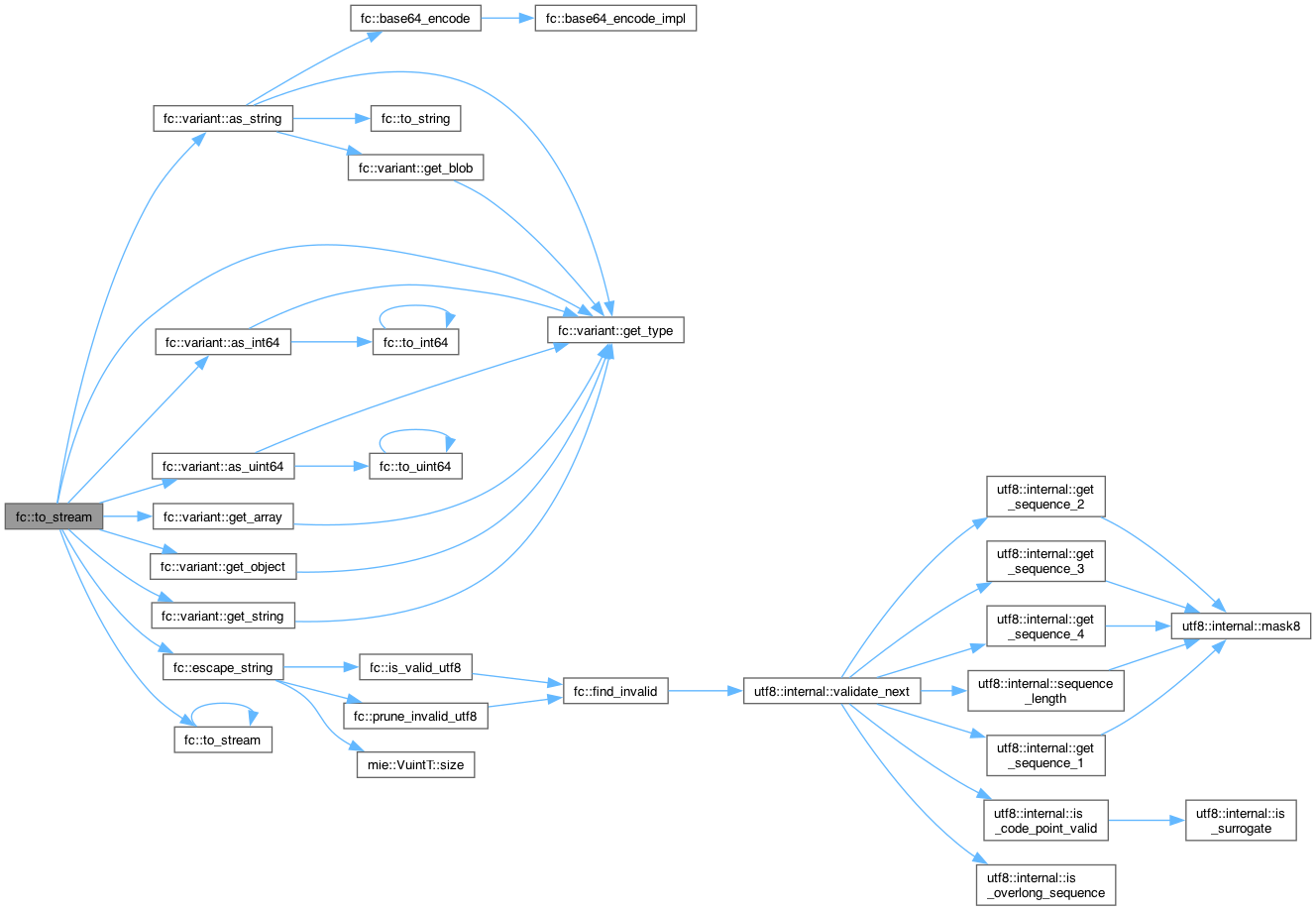
◆ to_stream() [2/3]
| void fc::to_stream | ( | T & | os, |
| const variant_object & | o, | ||
| const json::yield_function_t & | yield, | ||
| json::output_formatting | format ) |
◆ to_stream() [3/3]
| void fc::to_stream | ( | T & | os, |
| const variants & | a, | ||
| const json::yield_function_t & | yield, | ||
| json::output_formatting | format ) |
◆ to_string() [1/6]
| fc::string fc::to_string | ( | double | d | ) |
Definition at line 131 of file string.cpp.

◆ to_string() [2/6]
|
inline |
◆ to_string() [3/6]
| fc::string fc::to_string | ( | int64_t | d | ) |
Definition at line 144 of file string.cpp.
◆ to_string() [4/6]
| fc::string fc::to_string | ( | uint16_t | d | ) |
Definition at line 148 of file string.cpp.
◆ to_string() [5/6]
|
inline |
◆ to_string() [6/6]
| fc::string fc::to_string | ( | uint64_t | d | ) |
Definition at line 139 of file string.cpp.
◆ to_uint64()
| uint64_t fc::to_uint64 | ( | const fc::string & | i | ) |
Definition at line 105 of file string.cpp.

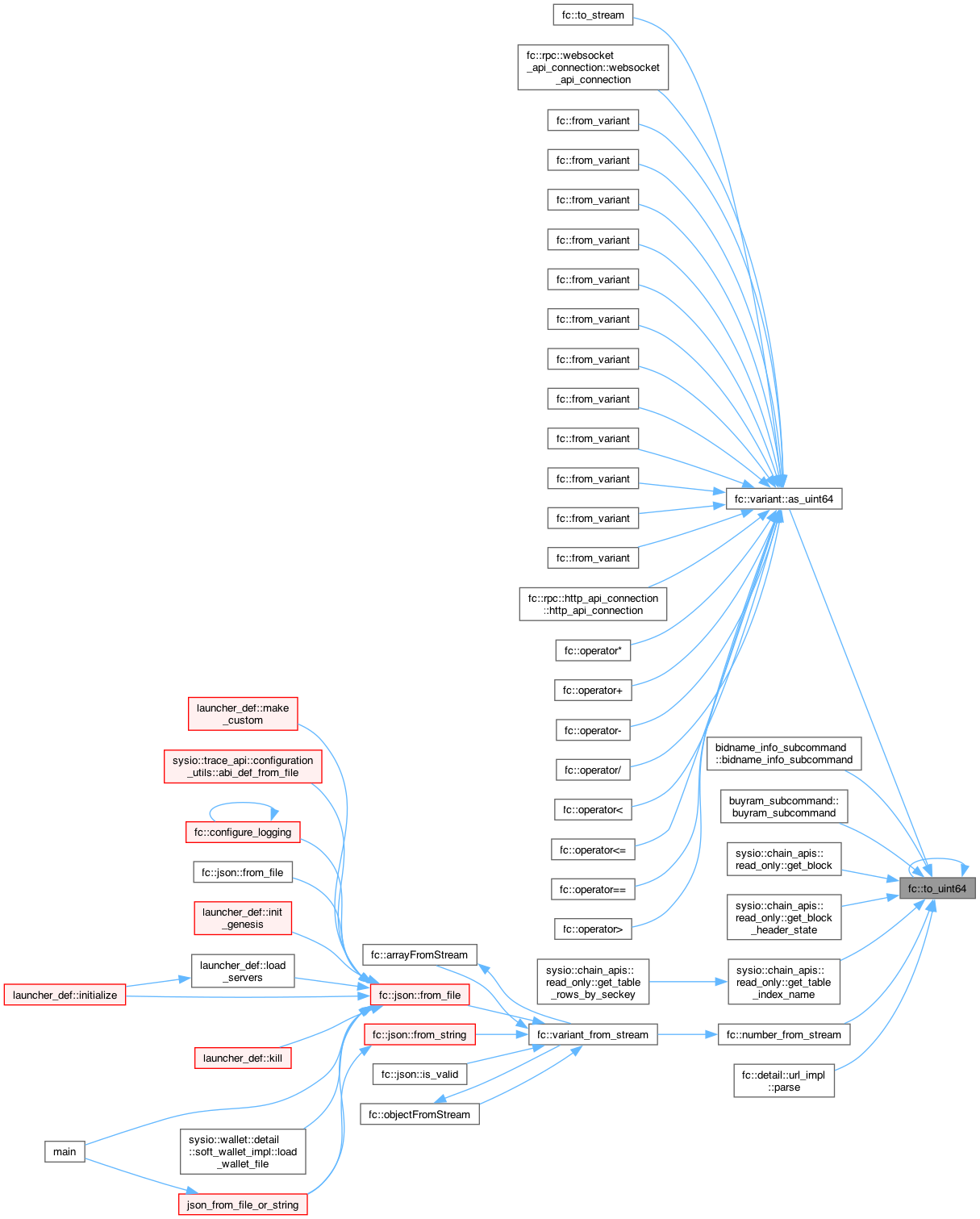
◆ to_variant() [1/97]
| void fc::to_variant | ( | const __int128 & | var, |
| fc::variant & | vo ) |
Definition at line 679 of file variant.cpp.
◆ to_variant() [2/97]
◆ to_variant() [3/97]
encodes the big int as base64 string, or a number
Definition at line 211 of file bigint.cpp.

◆ to_variant() [4/97]
| void fc::to_variant | ( | const bip::map< K, V, U... > & | m, |
| fc::variant & | vo ) |
Definition at line 80 of file container.hpp.

◆ to_variant() [5/97]
| void fc::to_variant | ( | const bip::multimap< K, V, U... > & | m, |
| fc::variant & | vo ) |
Definition at line 90 of file container.hpp.

◆ to_variant() [6/97]
| void fc::to_variant | ( | const bip::multiset< T, U... > & | s, |
| fc::variant & | vo ) |
◆ to_variant() [7/97]
| void fc::to_variant | ( | const bip::set< T, U... > & | s, |
| fc::variant & | vo ) |
◆ to_variant() [8/97]
◆ to_variant() [9/97]
| void fc::to_variant | ( | const boost::container::deque< T, U... > & | d, |
| fc::variant & | vo ) |
Definition at line 542 of file variant.hpp.
◆ to_variant() [10/97]
| void fc::to_variant | ( | const boost::container::vector< char, U... > & | vec, |
| fc::variant & | vo ) |
◆ to_variant() [11/97]
| void fc::to_variant | ( | const boost::container::vector< T, U... > & | vec, |
| fc::variant & | vo ) |
◆ to_variant() [12/97]
| void fc::to_variant | ( | const boost::multi_index_container< T, Args... > & | s, |
| fc::variant & | v ) |
Definition at line 674 of file variant.hpp.
◆ to_variant() [13/97]
| void fc::to_variant | ( | const boost::multiprecision::number< T > & | n, |
| fc::variant & | v ) |
Definition at line 690 of file variant.hpp.
◆ to_variant() [14/97]
| void fc::to_variant | ( | const chainbase::oid< OidType > & | oid, |
| variant & | v ) |
Definition at line 100 of file database_utils.hpp.
◆ to_variant() [15/97]
| void fc::to_variant | ( | const crypto::private_key & | var, |
| variant & | vo, | ||
| const fc::yield_function_t & | yield = fc::yield_function_t() ) |
Definition at line 144 of file private_key.cpp.

◆ to_variant() [16/97]
| void fc::to_variant | ( | const crypto::public_key & | var, |
| fc::variant & | vo, | ||
| const fc::yield_function_t & | yield = fc::yield_function_t() ) |
Definition at line 109 of file public_key.cpp.

◆ to_variant() [17/97]
| void fc::to_variant | ( | const crypto::r1::private_key & | var, |
| variant & | vo ) |
Definition at line 621 of file elliptic_r1.cpp.

◆ to_variant() [18/97]
| void fc::to_variant | ( | const crypto::r1::public_key & | var, |
| variant & | vo ) |
Definition at line 632 of file elliptic_r1.cpp.

◆ to_variant() [19/97]
| void fc::to_variant | ( | const crypto::signature & | var, |
| fc::variant & | vo, | ||
| const fc::yield_function_t & | yield = fc::yield_function_t() ) |
Definition at line 88 of file signature.cpp.

◆ to_variant() [20/97]
| void fc::to_variant | ( | const ecc::private_key & | var, |
| variant & | vo ) |
Definition at line 216 of file elliptic_common.cpp.

◆ to_variant() [21/97]
| void fc::to_variant | ( | const ecc::public_key & | var, |
| variant & | vo ) |
Definition at line 228 of file elliptic_common.cpp.

◆ to_variant() [22/97]
| void fc::to_variant | ( | const em::private_key & | var, |
| variant & | vo ) |
Definition at line 217 of file elliptic_em_common.cpp.

◆ to_variant() [23/97]
| void fc::to_variant | ( | const em::public_key & | var, |
| variant & | vo ) |
Definition at line 229 of file elliptic_em_common.cpp.

◆ to_variant() [24/97]
| void fc::to_variant | ( | const enum_type< IntType, EnumType > & | var, |
| variant & | vo ) |
Definition at line 51 of file enum_type.hpp.
◆ to_variant() [25/97]
Definition at line 126 of file exception.cpp.
◆ to_variant() [26/97]
| void fc::to_variant | ( | const fc::microseconds & | input_microseconds, |
| fc::variant & | output_variant ) |
◆ to_variant() [27/97]
| void fc::to_variant | ( | const fc::path & | path_to_convert, |
| fc::variant & | variant_output ) |
Definition at line 31 of file filesystem.cpp.

◆ to_variant() [28/97]
| void fc::to_variant | ( | const fixed_string< Storage > & | s, |
| variant & | v ) |
Definition at line 163 of file fixed_string.hpp.
◆ to_variant() [29/97]
| void fc::to_variant | ( | const flat_map< K, V, U... > & | m, |
| fc::variant & | vo ) |
◆ to_variant() [30/97]
| void fc::to_variant | ( | const flat_multimap< K, V, U... > & | m, |
| fc::variant & | vo ) |
◆ to_variant() [31/97]
| void fc::to_variant | ( | const flat_multiset< T, U... > & | s, |
| fc::variant & | vo ) |
◆ to_variant() [32/97]
| void fc::to_variant | ( | const flat_set< T, U... > & | s, |
| fc::variant & | vo ) |
◆ to_variant() [33/97]
|
inline |
Definition at line 144 of file database_utils.hpp.
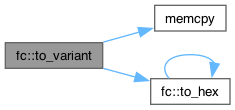
◆ to_variant() [34/97]
Definition at line 130 of file database_utils.hpp.

◆ to_variant() [35/97]
| void fc::to_variant | ( | const int16_t & | var, |
| fc::variant & | vo ) |
Definition at line 645 of file variant.cpp.
◆ to_variant() [36/97]
| void fc::to_variant | ( | const int32_t & | var, |
| fc::variant & | vo ) |
Definition at line 655 of file variant.cpp.
◆ to_variant() [37/97]
| void fc::to_variant | ( | const int8_t & | var, |
| fc::variant & | vo ) |
Definition at line 637 of file variant.cpp.
◆ to_variant() [38/97]
| void fc::to_variant | ( | const ip::address & | var, |
| variant & | vo ) |
◆ to_variant() [39/97]
| void fc::to_variant | ( | const ip::endpoint & | var, |
| variant & | vo ) |
◆ to_variant() [40/97]
| void fc::to_variant | ( | const log_context & | l, |
| variant & | v ) |
Definition at line 90 of file log_message.cpp.
◆ to_variant() [41/97]
| void fc::to_variant | ( | const log_message & | l, |
| variant & | v ) |
Definition at line 104 of file log_message.cpp.

◆ to_variant() [42/97]
| void fc::to_variant | ( | const mutable_variant_object & | var, |
| fc::variant & | vo ) |
Definition at line 414 of file variant_object.cpp.
◆ to_variant() [43/97]
|
inline |
Overloaded to_variant so that permission is only present if it is set
- Parameters
-
a v
Definition at line 97 of file account_query_db.hpp.
◆ to_variant() [44/97]
| void fc::to_variant | ( | const private_key & | bi, |
| variant & | v ) |
◆ to_variant() [45/97]
| void fc::to_variant | ( | const public_key & | bi, |
| variant & | v ) |
◆ to_variant() [46/97]
Definition at line 121 of file real128.cpp.
◆ to_variant() [47/97]
Definition at line 103 of file ripemd160.cpp.
◆ to_variant() [48/97]
| void fc::to_variant | ( | const safe< T > & | s, |
| fc::variant & | v ) |
Definition at line 669 of file variant.hpp.
◆ to_variant() [49/97]
◆ to_variant() [50/97]
Definition at line 84 of file sha224.cpp.
◆ to_variant() [51/97]
Definition at line 206 of file sha256.cpp.
◆ to_variant() [52/97]
◆ to_variant() [53/97]
Definition at line 91 of file sha512.cpp.
◆ to_variant() [54/97]
| void fc::to_variant | ( | const signed_int & | var, |
| variant & | vo ) |
Definition at line 6 of file varint.cpp.
◆ to_variant() [55/97]
| void fc::to_variant | ( | const std::array< T, S > & | var, |
| fc::variant & | vo ) |
Definition at line 586 of file variant.hpp.
◆ to_variant() [56/97]
| void fc::to_variant | ( | const std::deque< T > & | var, |
| fc::variant & | vo ) |
Definition at line 518 of file variant.hpp.
◆ to_variant() [57/97]
| void fc::to_variant | ( | const std::map< K, T > & | var, |
| fc::variant & | vo ) |
Definition at line 444 of file variant.hpp.
◆ to_variant() [58/97]
| void fc::to_variant | ( | const std::multimap< K, T > & | var, |
| fc::variant & | vo ) |
Definition at line 464 of file variant.hpp.
◆ to_variant() [59/97]
| void fc::to_variant | ( | const std::pair< A, B > & | t, |
| fc::variant & | v ) |
Definition at line 596 of file variant.hpp.
◆ to_variant() [60/97]
| void fc::to_variant | ( | const std::set< T > & | var, |
| fc::variant & | vo ) |
Definition at line 485 of file variant.hpp.
◆ to_variant() [61/97]
| void fc::to_variant | ( | const std::shared_ptr< T > & | var, |
| fc::variant & | vo ) |
Definition at line 633 of file variant.hpp.

◆ to_variant() [62/97]
| void fc::to_variant | ( | const std::string & | s, |
| fc::variant & | v ) |
Definition at line 719 of file variant.cpp.
◆ to_variant() [63/97]
| void fc::to_variant | ( | const std::unique_ptr< T > & | s, |
| fc::variant & | v ) |
◆ to_variant() [64/97]
| void fc::to_variant | ( | const std::unordered_map< K, T > & | var, |
| fc::variant & | vo ) |
Definition at line 424 of file variant.hpp.
◆ to_variant() [65/97]
| void fc::to_variant | ( | const std::unordered_set< T > & | var, |
| fc::variant & | vo ) |
Definition at line 402 of file variant.hpp.
◆ to_variant() [66/97]
| void fc::to_variant | ( | const std::variant< T... > & | s, |
| fc::variant & | v ) |
Definition at line 71 of file static_variant.hpp.
◆ to_variant() [67/97]
| void fc::to_variant | ( | const std::vector< char > & | var, |
| fc::variant & | vo ) |
Definition at line 729 of file variant.cpp.

◆ to_variant() [68/97]
| void fc::to_variant | ( | const std::vector< T > & | t, |
| fc::variant & | v ) |
Definition at line 566 of file variant.hpp.
◆ to_variant() [69/97]
|
inline |
◆ to_variant() [70/97]
| void fc::to_variant | ( | const sysio::chain::block_timestamp< IntervalMs, EpochMs > & | t, |
| fc::variant & | v ) |
◆ to_variant() [71/97]
| void fc::to_variant | ( | const sysio::chain::chain_id_type & | cid, |
| fc::variant & | v ) |
◆ to_variant() [72/97]
| void fc::to_variant | ( | const sysio::chain::may_not_exist< T > & | e, |
| fc::variant & | v ) |
◆ to_variant() [73/97]
| void fc::to_variant | ( | const sysio::chain::name & | c, |
| fc::variant & | v ) |
◆ to_variant() [74/97]
|
inline |
◆ to_variant() [75/97]
| void fc::to_variant | ( | const sysio::chain::shared_public_key & | var, |
| fc::variant & | vo ) |
Definition at line 4 of file authority.cpp.


◆ to_variant() [76/97]
|
inline |
Definition at line 167 of file database_utils.hpp.
◆ to_variant() [77/97]
| void fc::to_variant | ( | const sysio::chain::shared_vector< T > & | sv, |
| variant & | v ) |
◆ to_variant() [78/97]
|
inline |
Definition at line 172 of file symbol.hpp.

◆ to_variant() [79/97]
|
inline |
◆ to_variant() [80/97]
◆ to_variant() [81/97]
| void fc::to_variant | ( | const time_point & | var, |
| fc::variant & | vo ) |
◆ to_variant() [82/97]
| void fc::to_variant | ( | const time_point_sec & | var, |
| fc::variant & | vo ) |
◆ to_variant() [83/97]
Definition at line 377 of file uint128.cpp.

◆ to_variant() [84/97]
| void fc::to_variant | ( | const uint16_t & | var, |
| fc::variant & | vo ) |
Definition at line 641 of file variant.cpp.
◆ to_variant() [85/97]
| void fc::to_variant | ( | const uint32_t & | var, |
| fc::variant & | vo ) |
Definition at line 649 of file variant.cpp.
◆ to_variant() [86/97]
| void fc::to_variant | ( | const uint8_t & | var, |
| fc::variant & | vo ) |
Definition at line 633 of file variant.cpp.
◆ to_variant() [87/97]
| void fc::to_variant | ( | const UInt< 16 > & | n, |
| fc::variant & | v ) |
Definition at line 752 of file variant.cpp.
◆ to_variant() [88/97]
| void fc::to_variant | ( | const UInt< 32 > & | n, |
| fc::variant & | v ) |
Definition at line 756 of file variant.cpp.
◆ to_variant() [89/97]
| void fc::to_variant | ( | const UInt< 64 > & | n, |
| fc::variant & | v ) |
Definition at line 760 of file variant.cpp.
◆ to_variant() [90/97]
| void fc::to_variant | ( | const UInt< 8 > & | n, |
| fc::variant & | v ) |
Definition at line 748 of file variant.cpp.
◆ to_variant() [91/97]
| void fc::to_variant | ( | const unsigned __int128 & | var, |
| fc::variant & | vo ) |
Definition at line 664 of file variant.cpp.
◆ to_variant() [92/97]
| void fc::to_variant | ( | const unsigned_int & | var, |
| variant & | vo ) |
Definition at line 8 of file varint.cpp.
◆ to_variant() [93/97]
| void fc::to_variant | ( | const url & | u, |
| fc::variant & | v ) |
◆ to_variant() [94/97]
| void fc::to_variant | ( | const variant_object & | var, |
| fc::variant & | vo ) |
Definition at line 177 of file variant_object.cpp.
◆ to_variant() [95/97]
Definition at line 109 of file log_message.cpp.
◆ to_variant() [96/97]
| void fc::to_variant | ( | long long int | s, |
| fc::variant & | v ) |
Definition at line 871 of file variant.cpp.
◆ to_variant() [97/97]
| void fc::to_variant | ( | unsigned long long int | s, |
| fc::variant & | v ) |
Definition at line 872 of file variant.cpp.
◆ token_from_stream()
Definition at line 317 of file json.cpp.

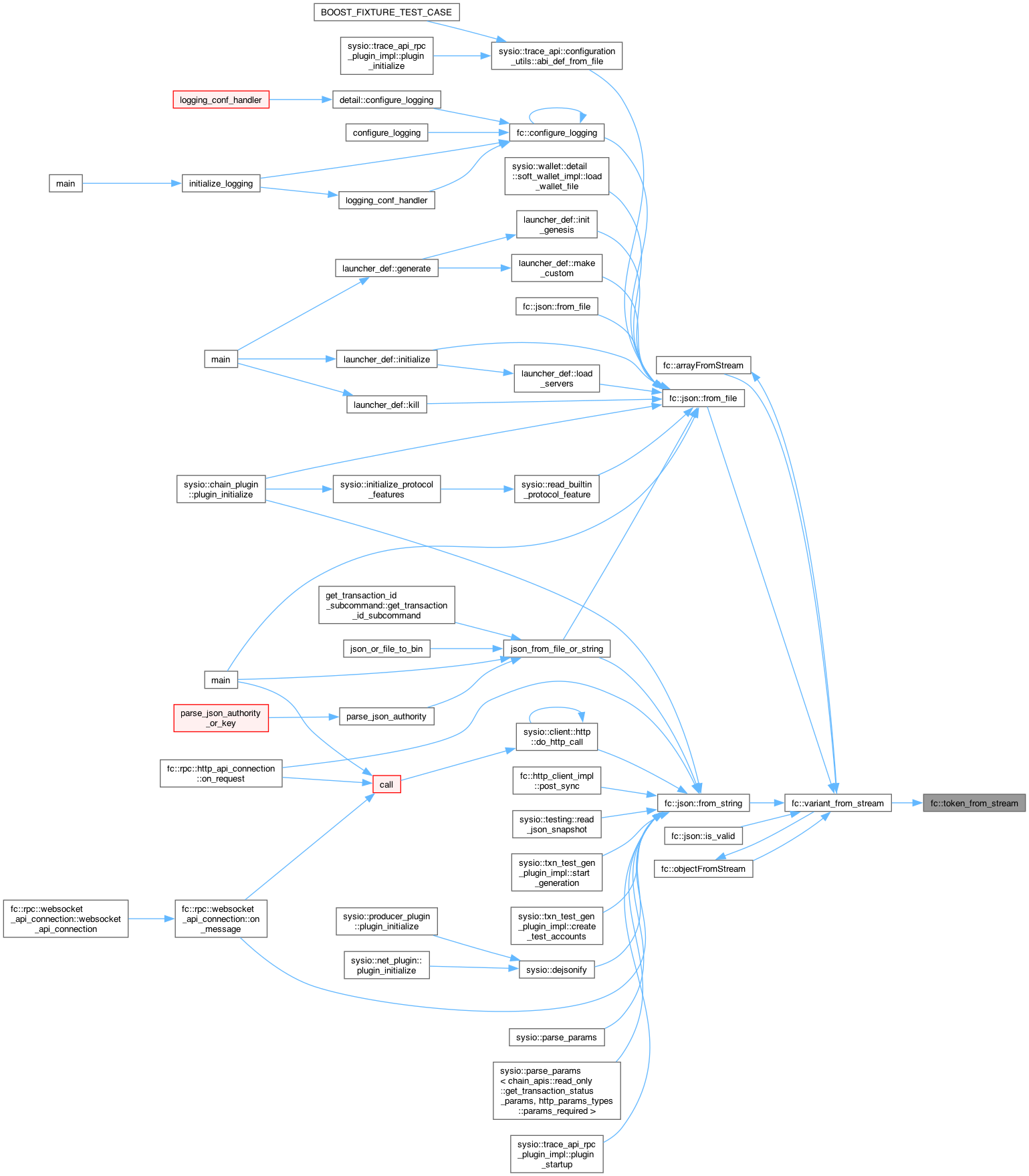
◆ trim()
| std::string fc::trim | ( | const fc::string & | s | ) |
Definition at line 152 of file string.cpp.

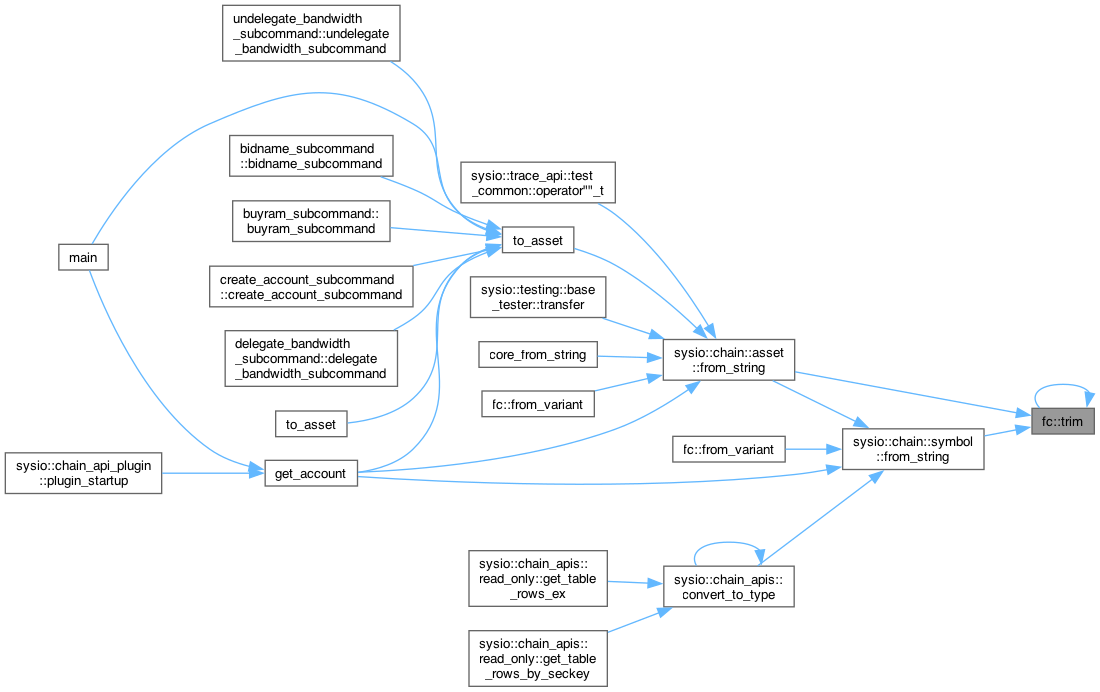
◆ trim_and_normalize_spaces()
Definition at line 167 of file string.cpp.


◆ uint128_to_float128()
|
inline |
Definition at line 125 of file database_utils.hpp.


◆ Uint128High64()
◆ Uint128Low64()
◆ underflow_exception()
| file_not_found_exception parse_error_exception invalid_arg_exception invalid_operation_exception key_not_found_exception bad_cast_exception out_of_range_exception canceled_exception assert_exception eof_exception unknown_host_exception null_optional udt_exception aes_exception overflow_exception fc::underflow_exception | ( | divide_by_zero_exception | ) |
Definition at line 1 of file exception.cpp.


◆ unique_path()
| path fc::unique_path | ( | ) |
Definition at line 365 of file filesystem.cpp.
◆ variant_from_stream()
| variant fc::variant_from_stream | ( | T & | in, |
| uint32_t | max_depth ) |
Definition at line 389 of file json.cpp.
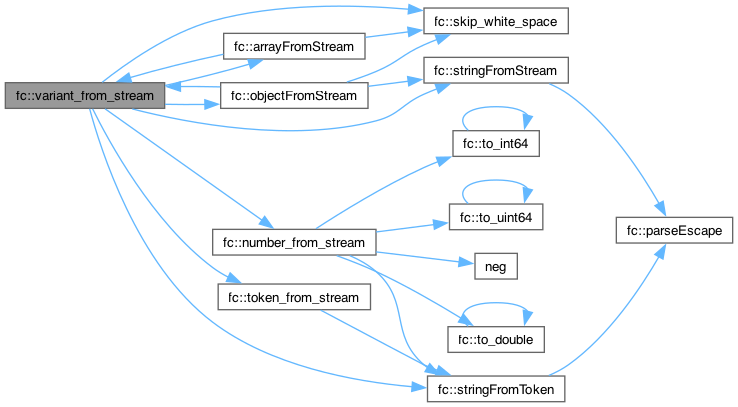
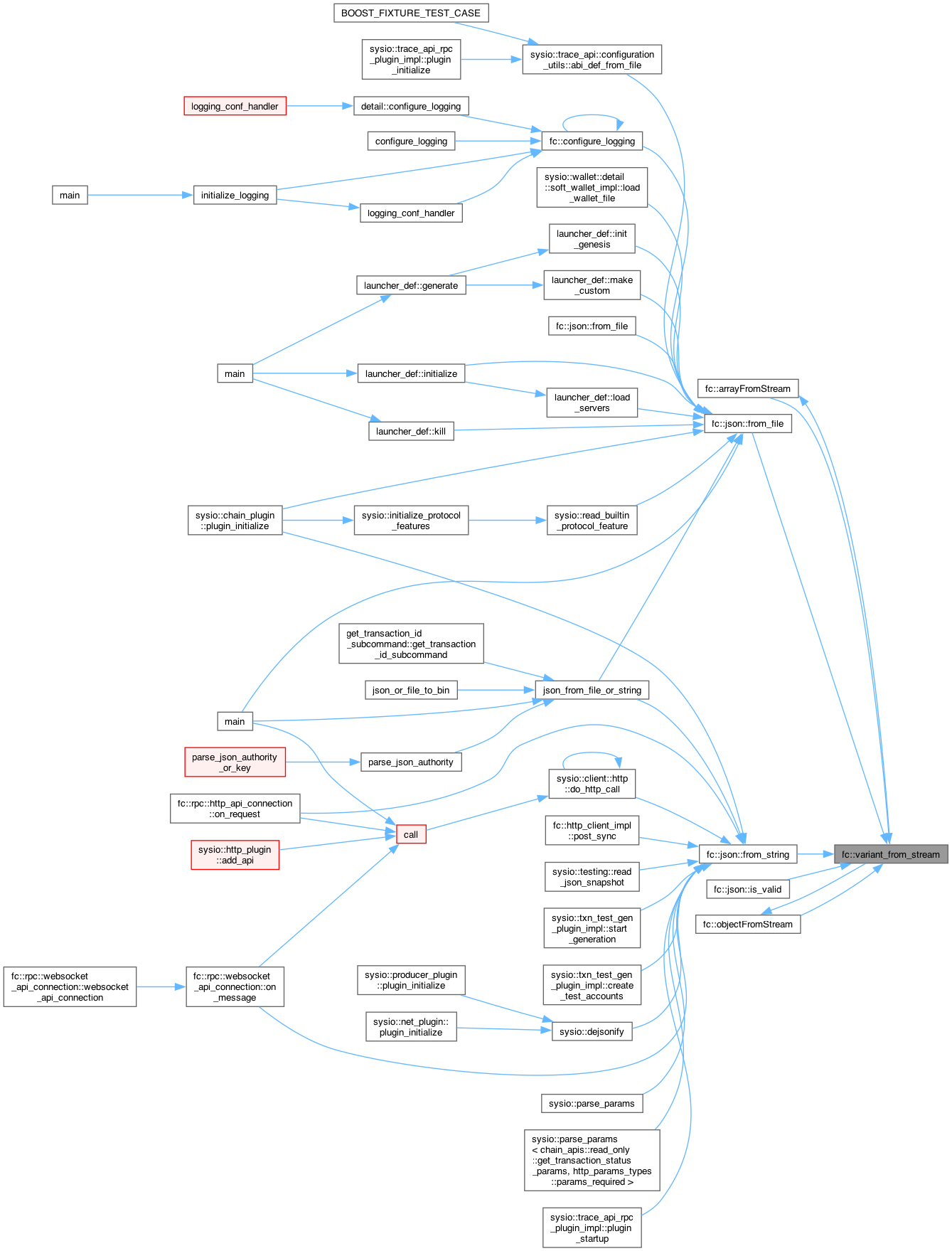
◆ zlib_compress()
Definition at line 11 of file zlib.cpp.

Variable Documentation
◆ do_default_config
| bool fc::do_default_config = configure_logging( logging_config::default_config() ) |
Definition at line 107 of file logger.cpp.
◆ enable_record_assert_trip
| bool fc::enable_record_assert_trip = false |
Definition at line 325 of file exception.cpp.
◆ git_revision_sha
|
extern |
◆ git_revision_unix_timestamp
|
extern |
◆ hex_digits
◆ minimize_max_size
|
constexpr |
Definition at line 763 of file variant.cpp.



